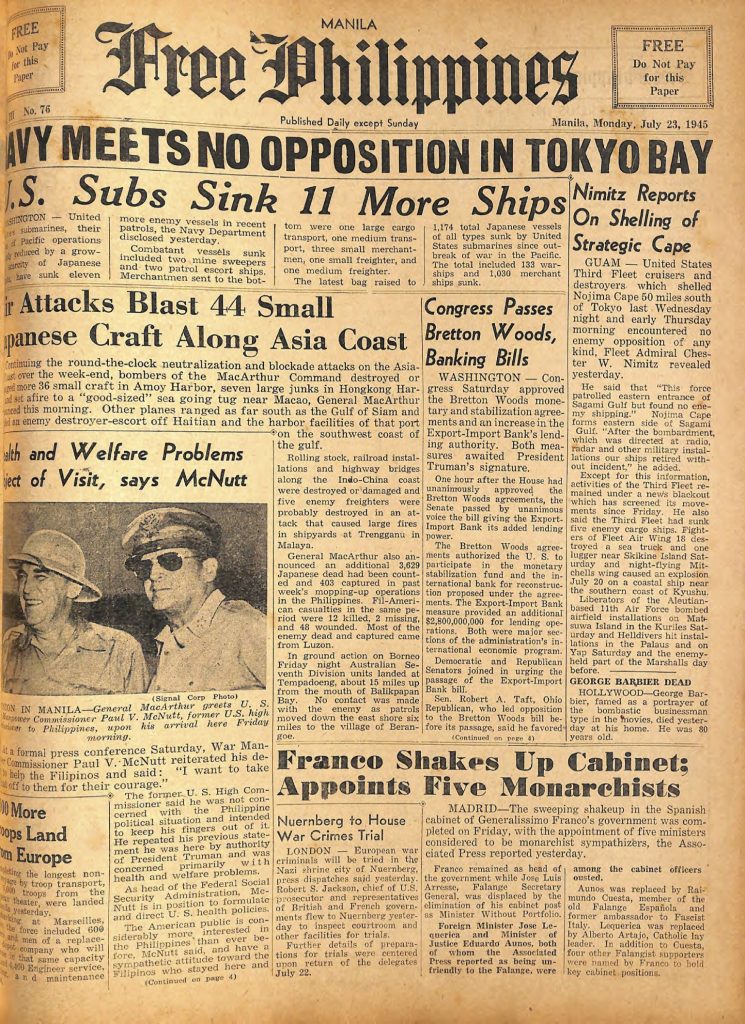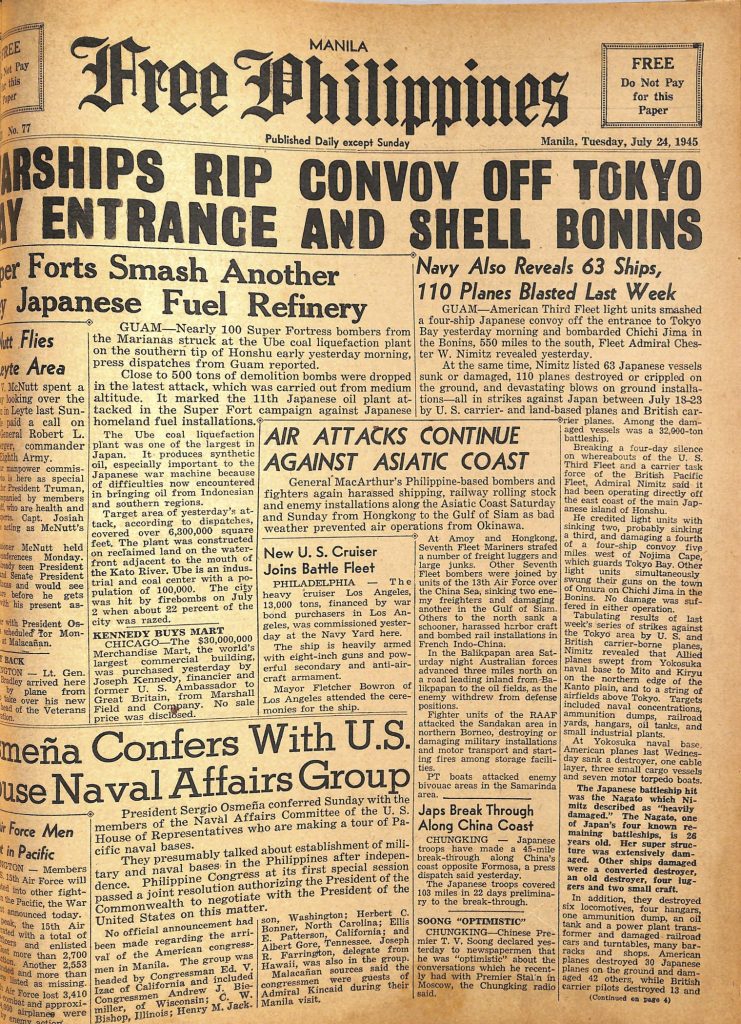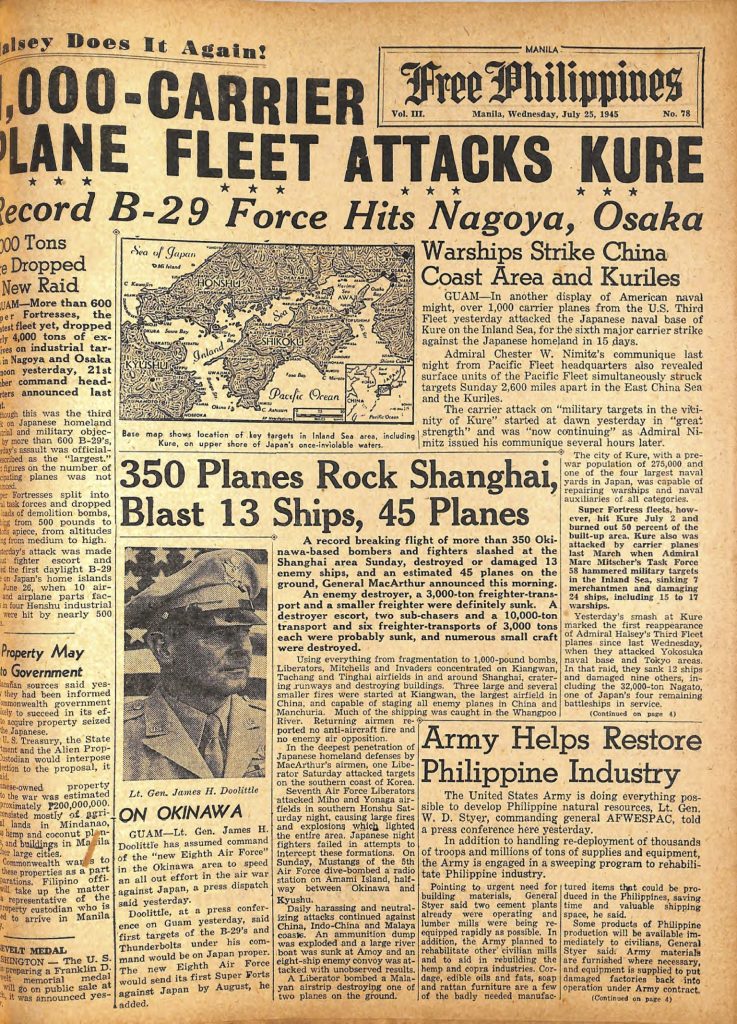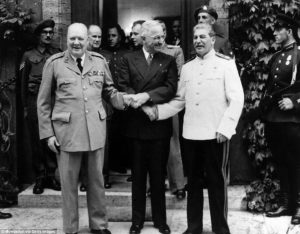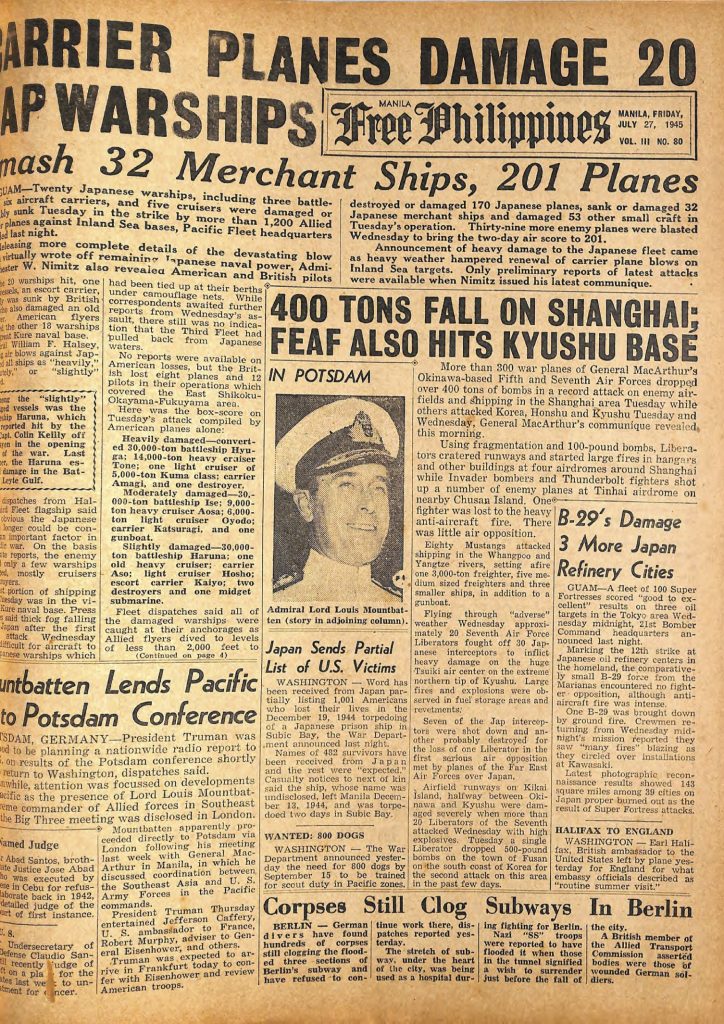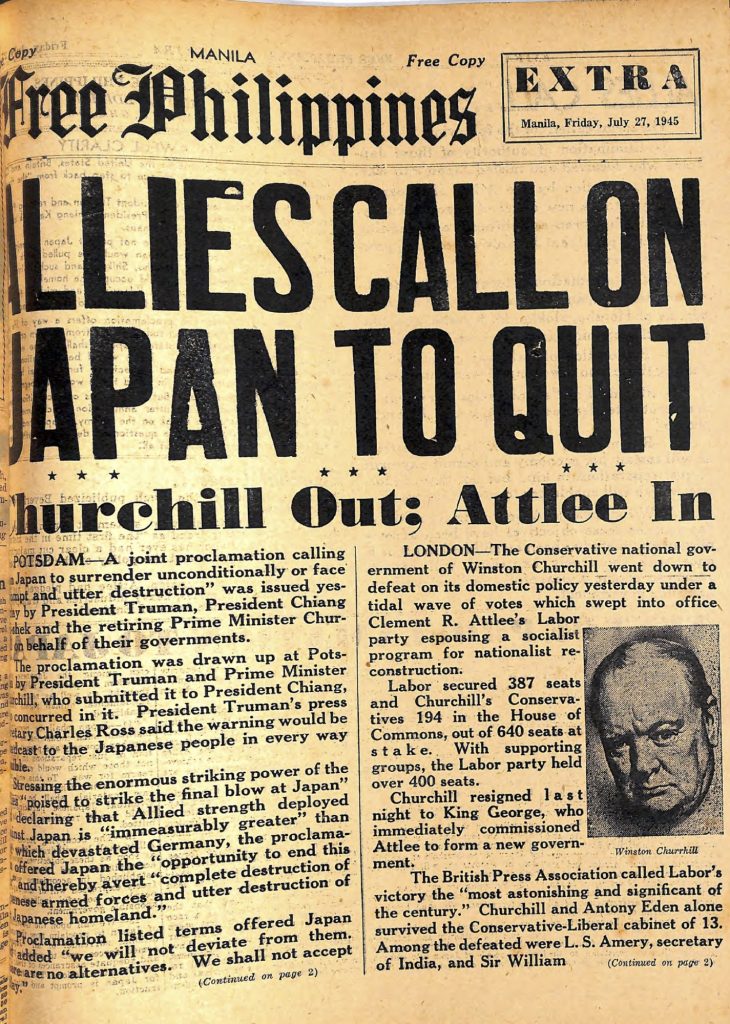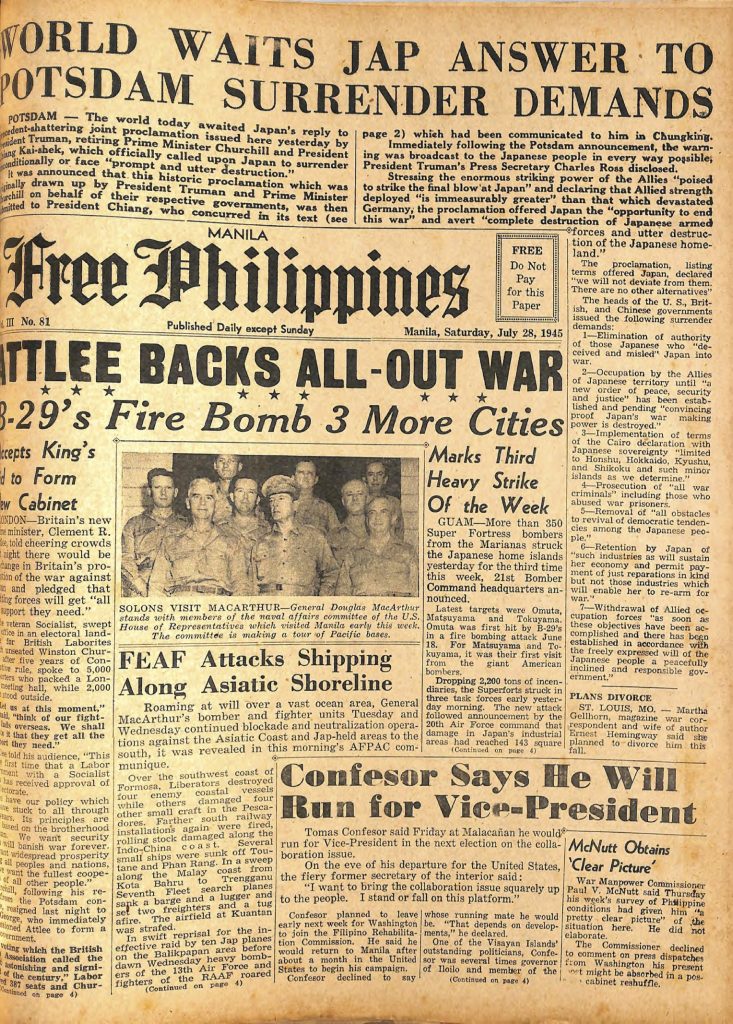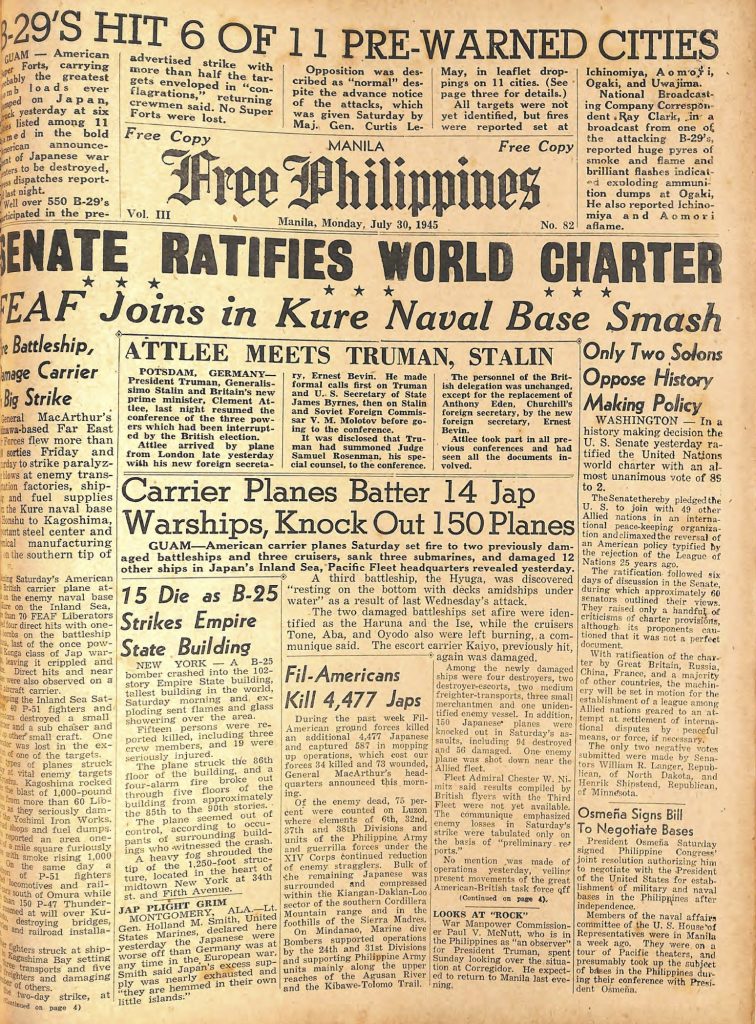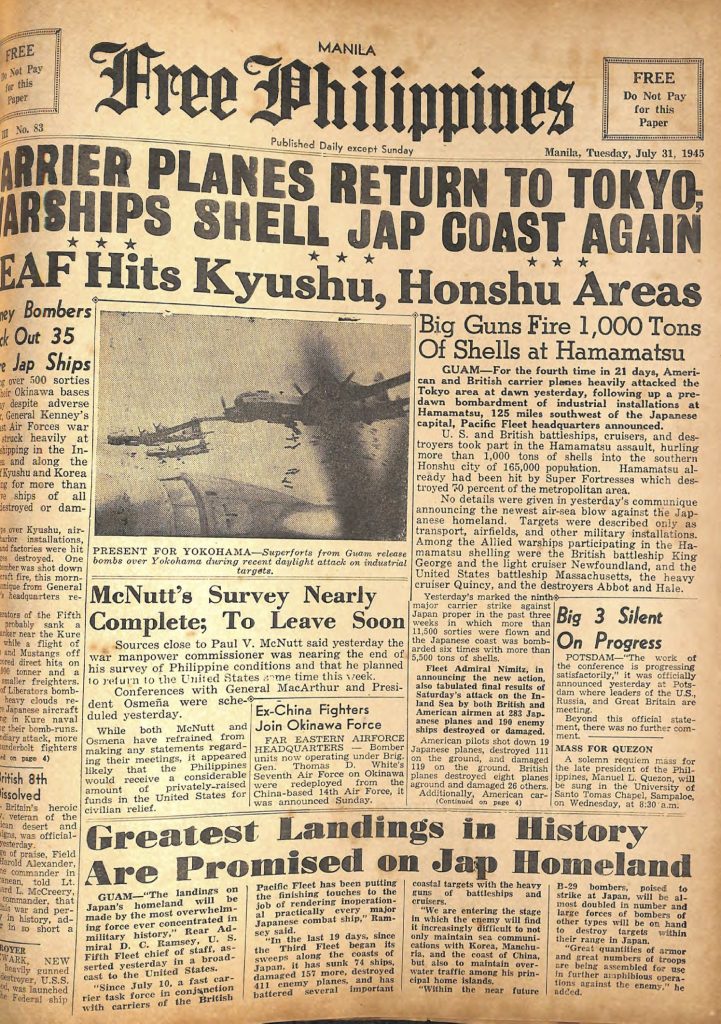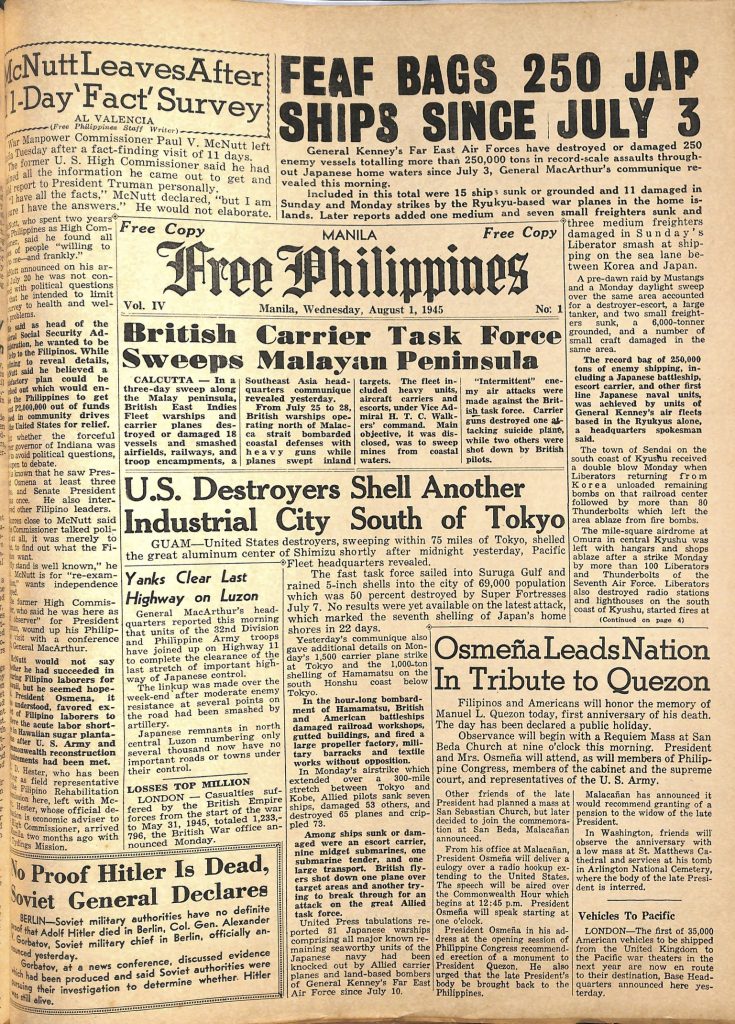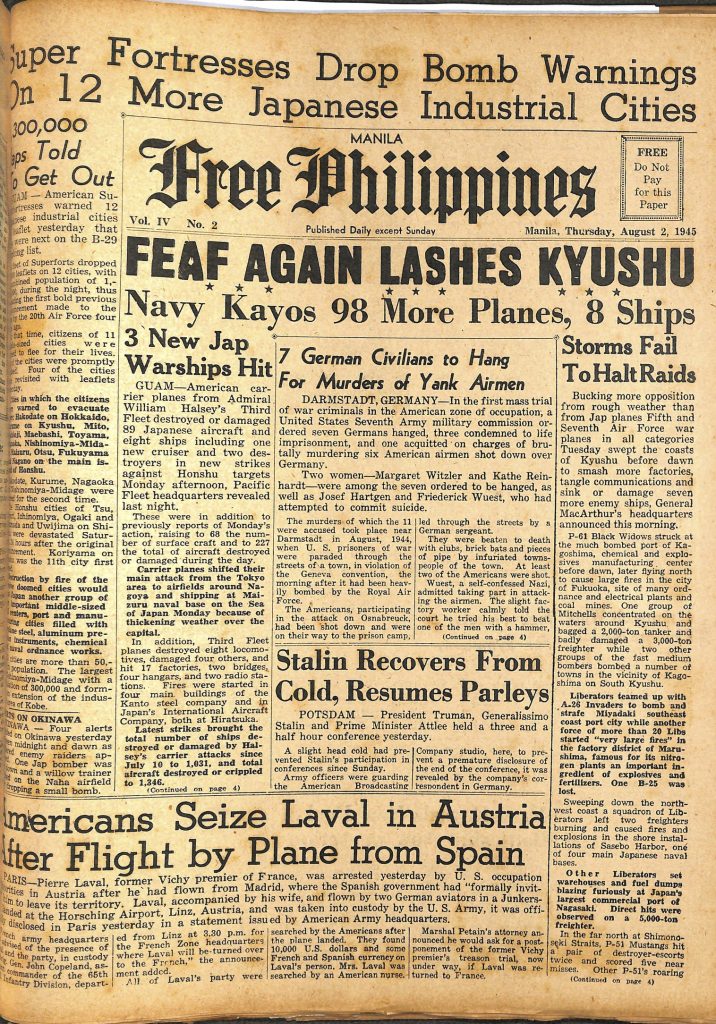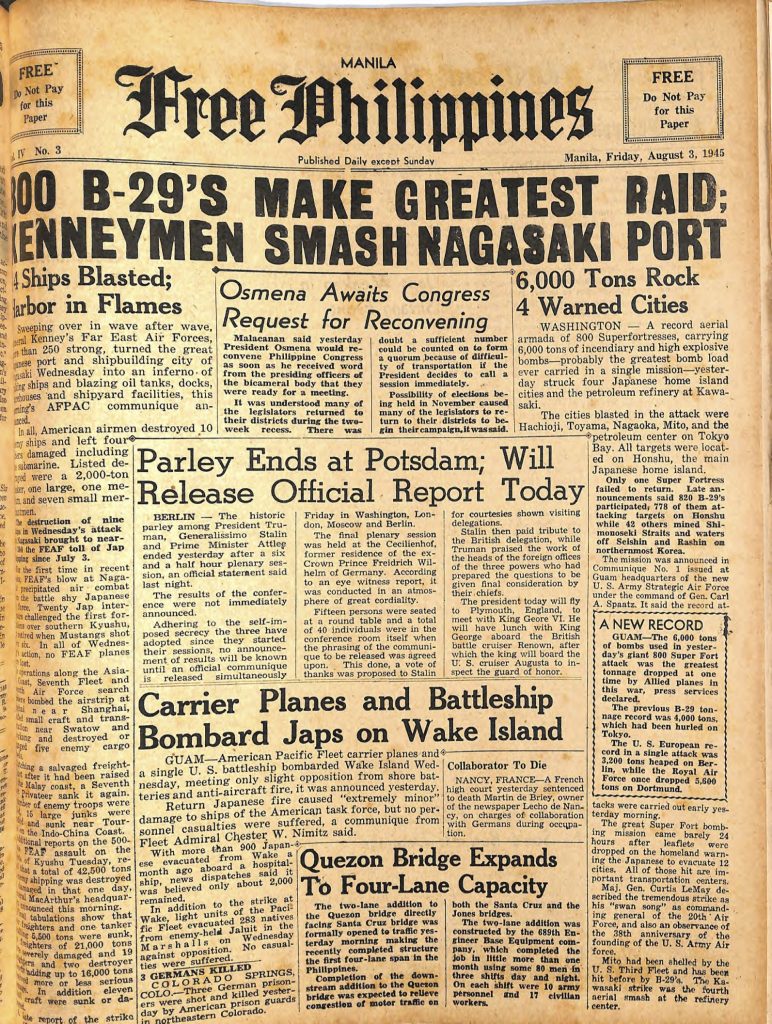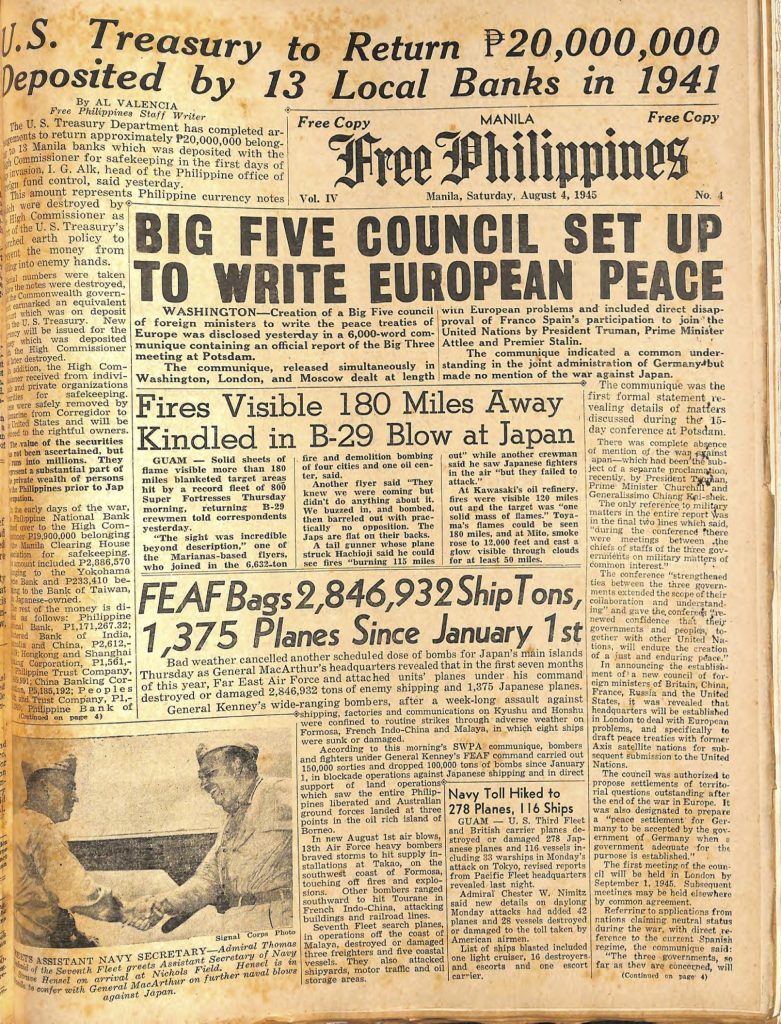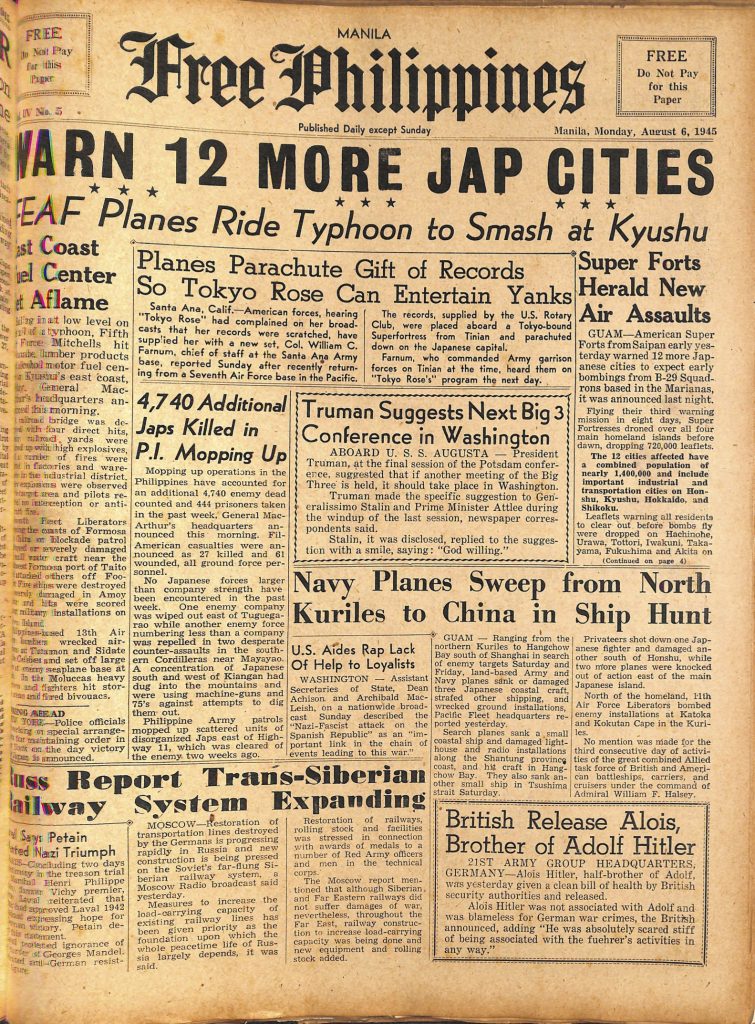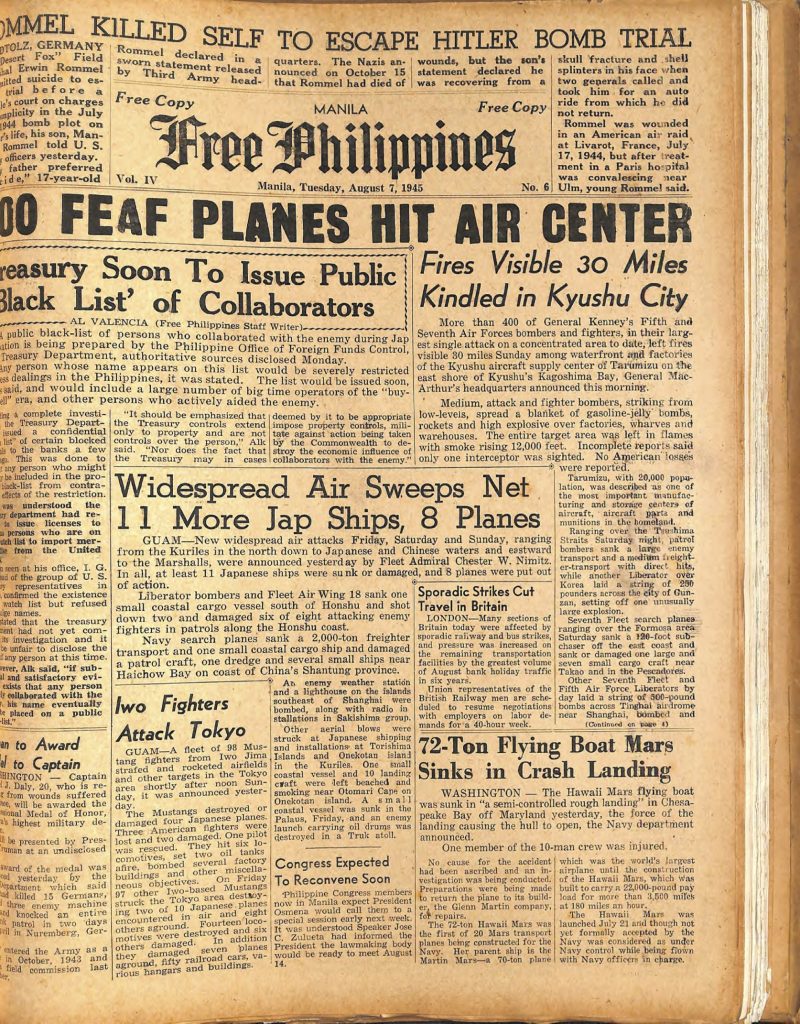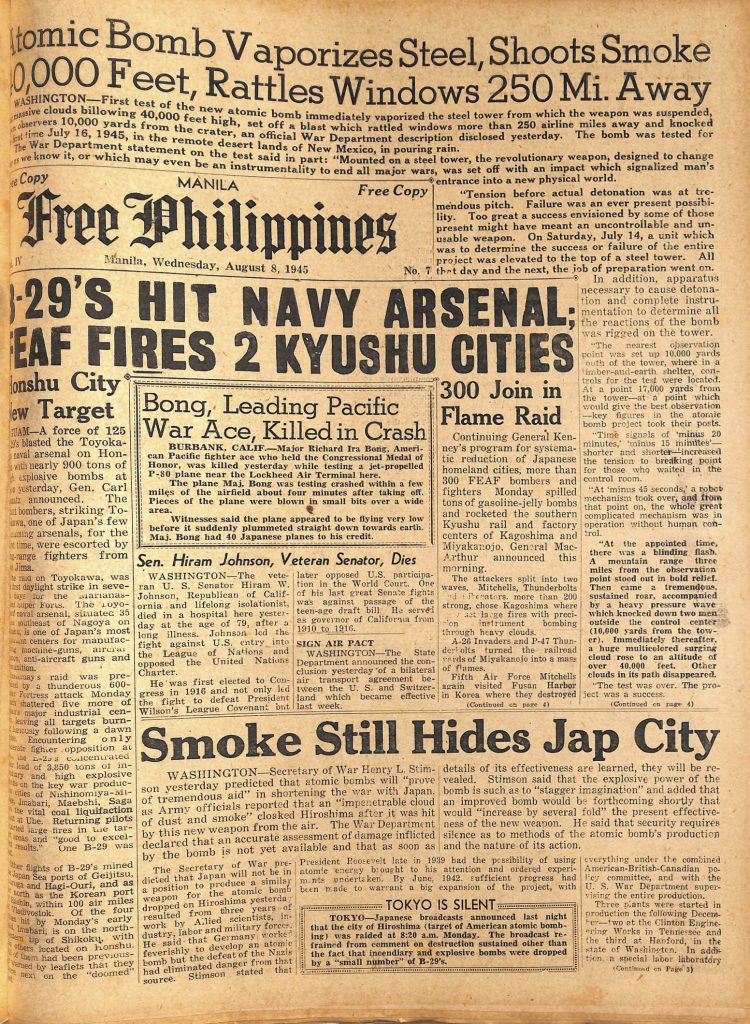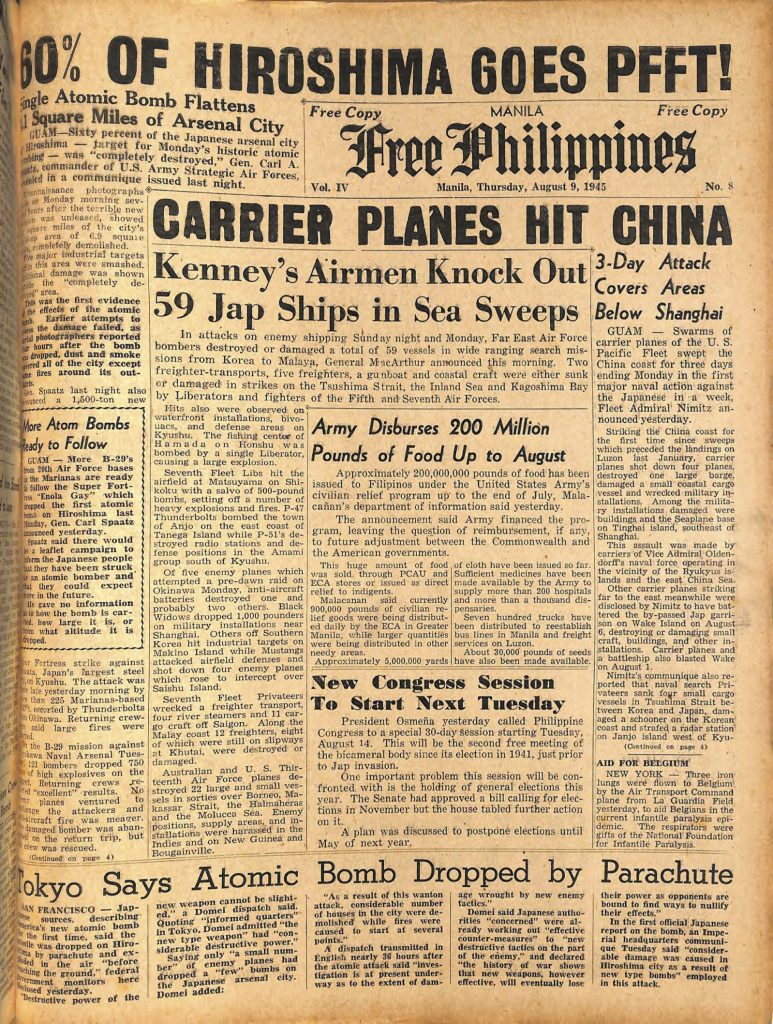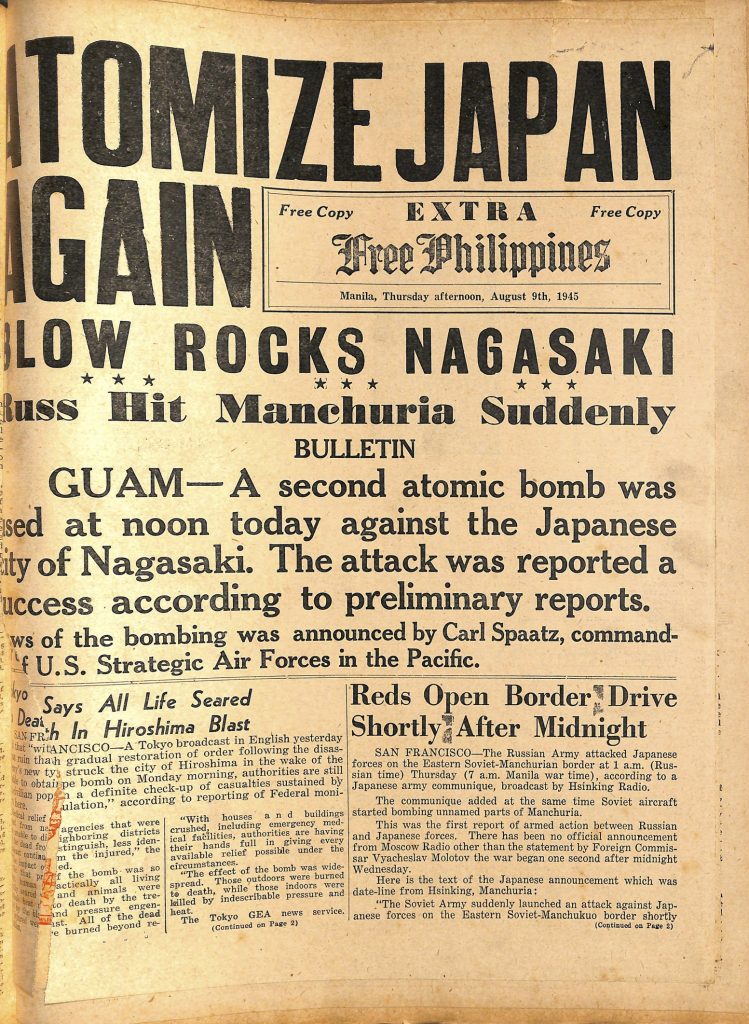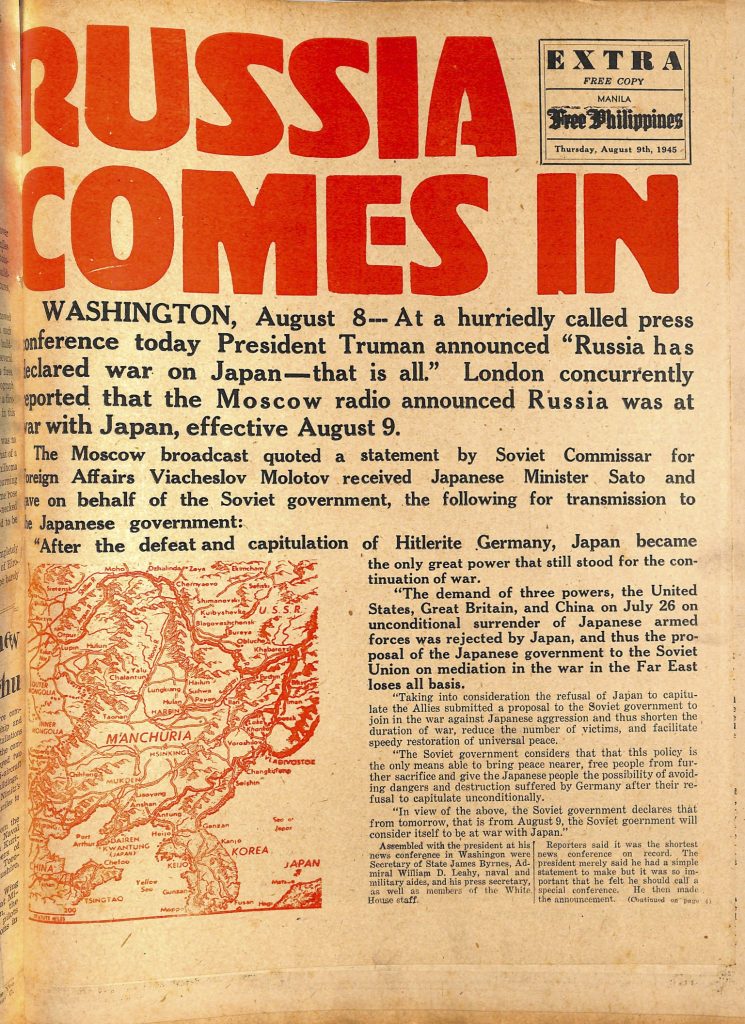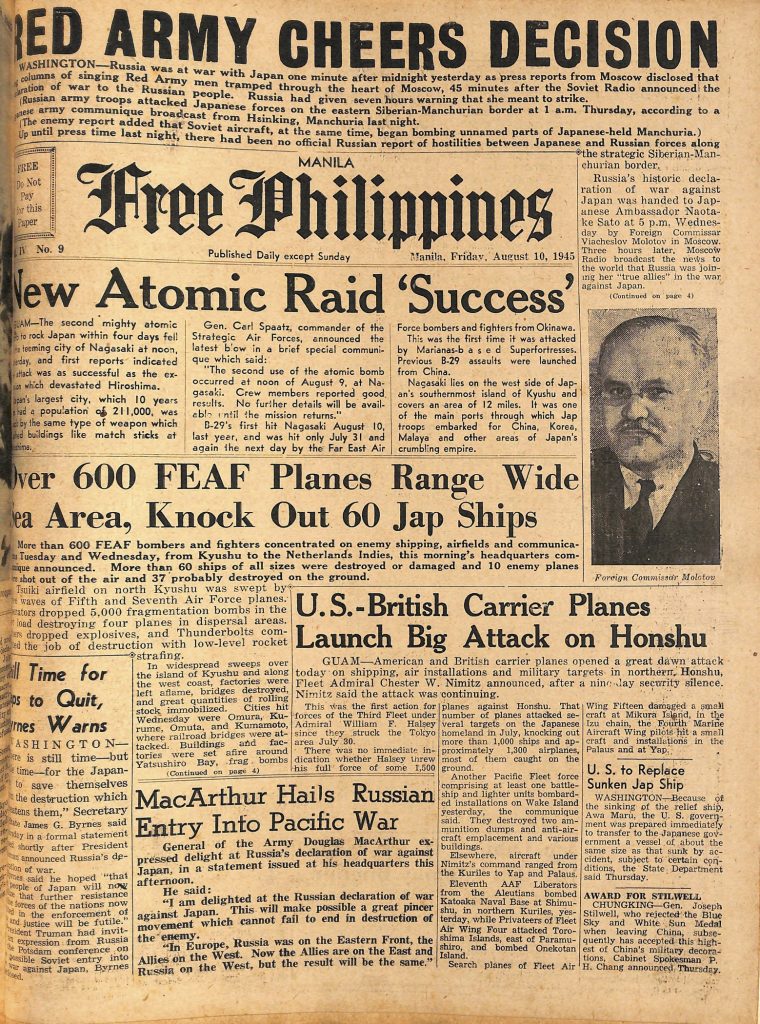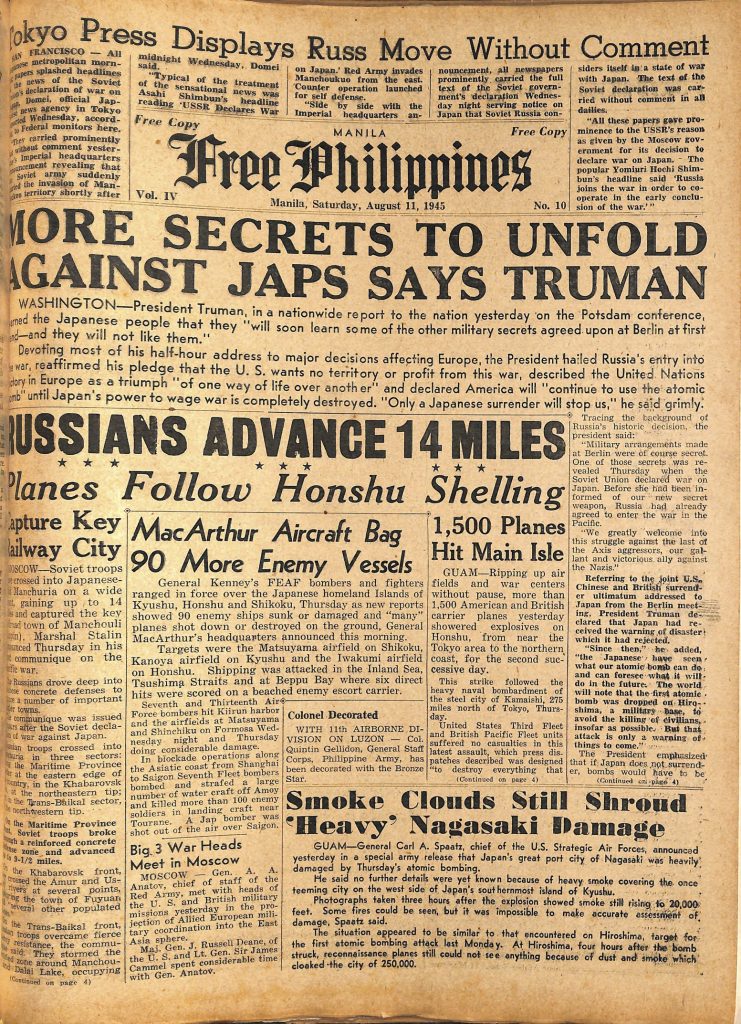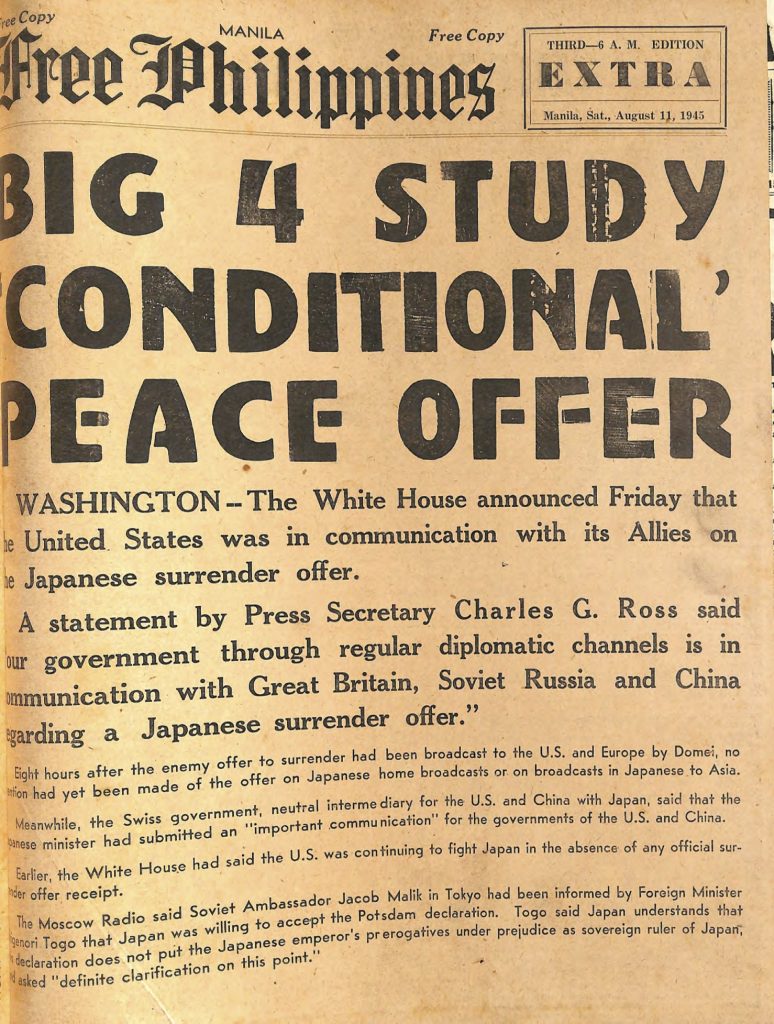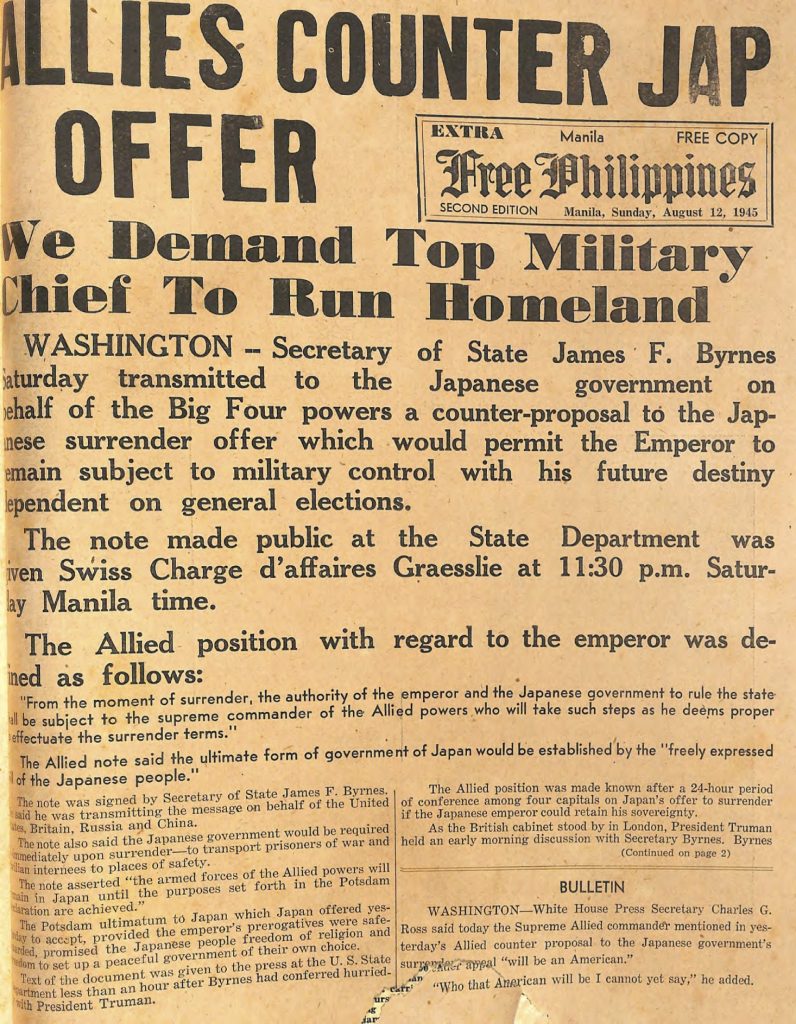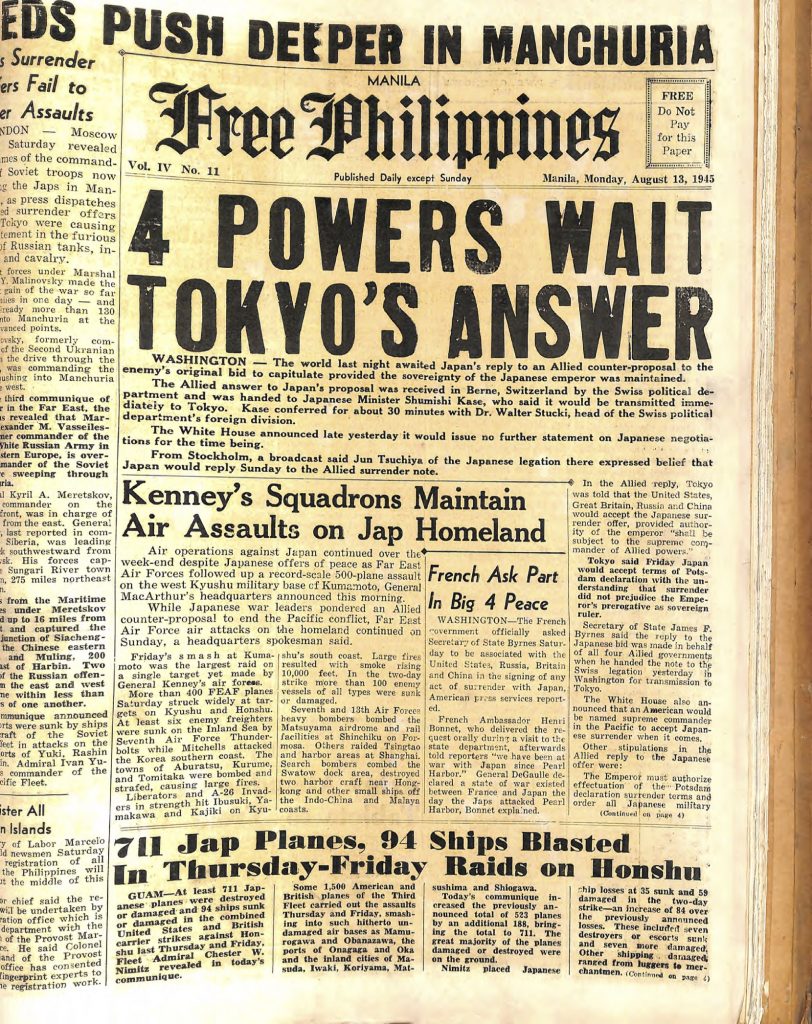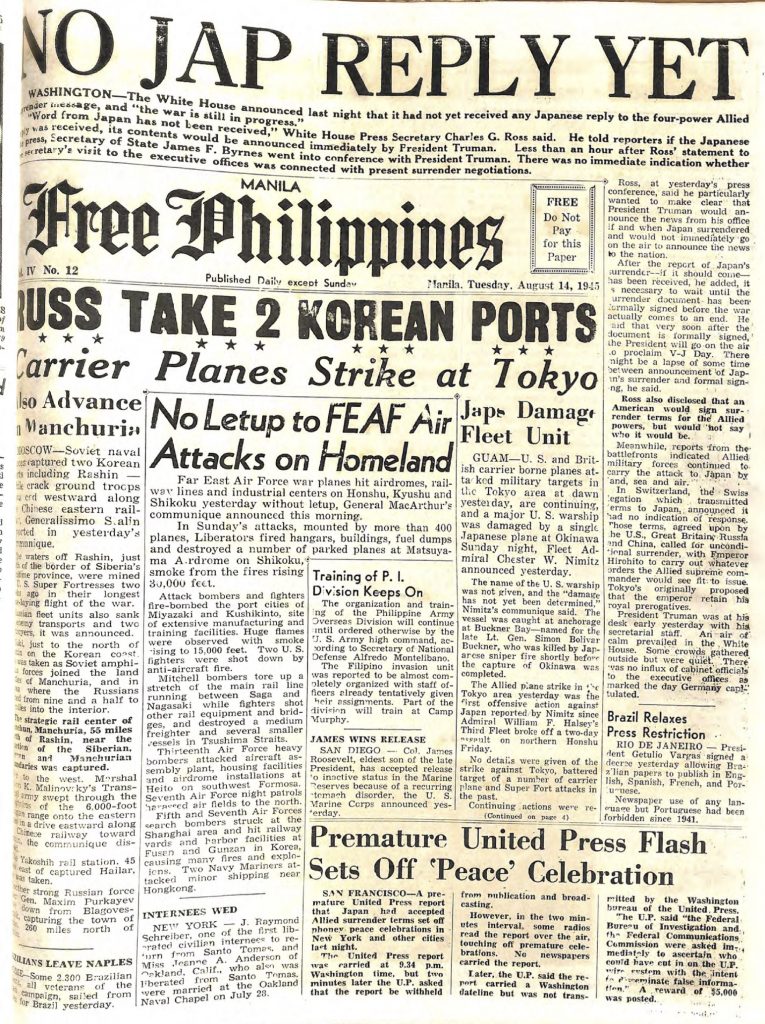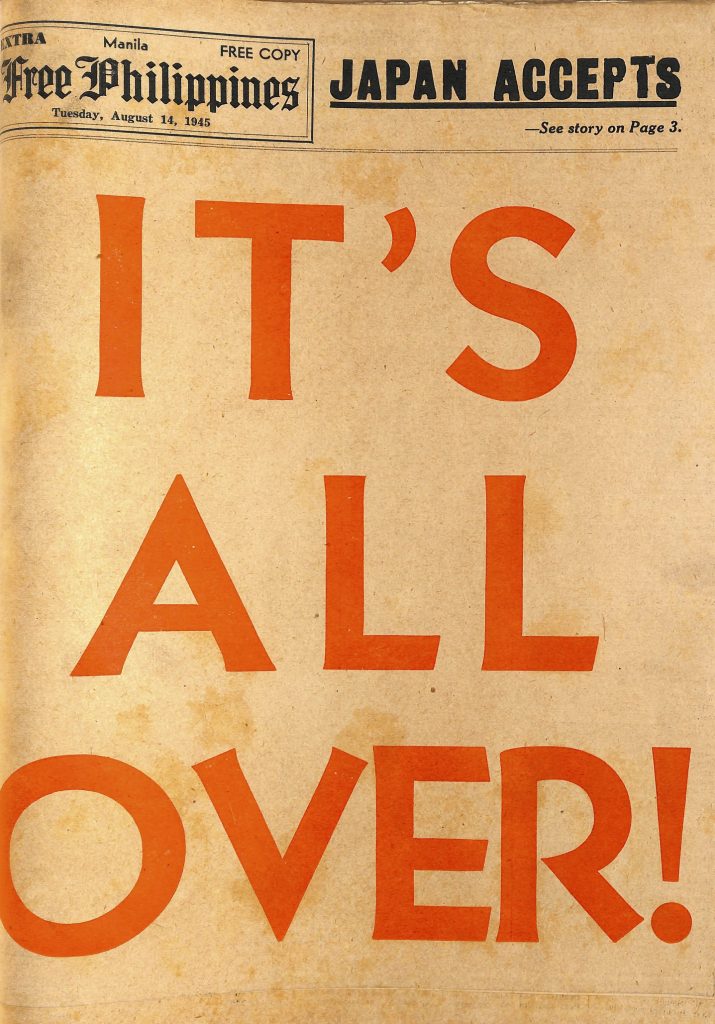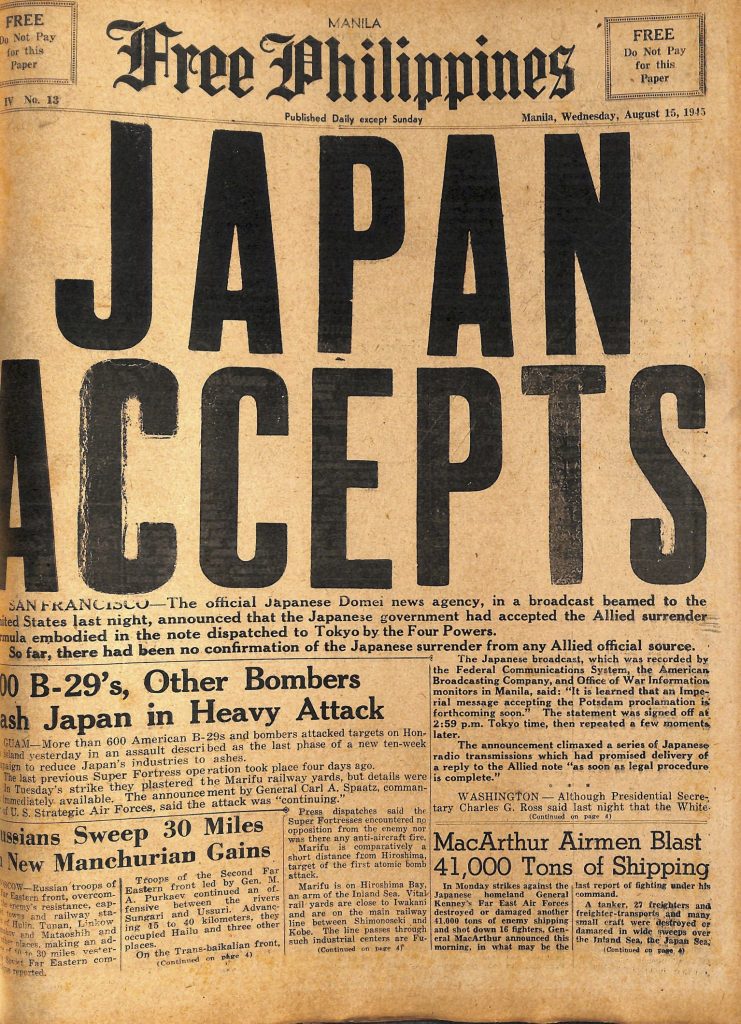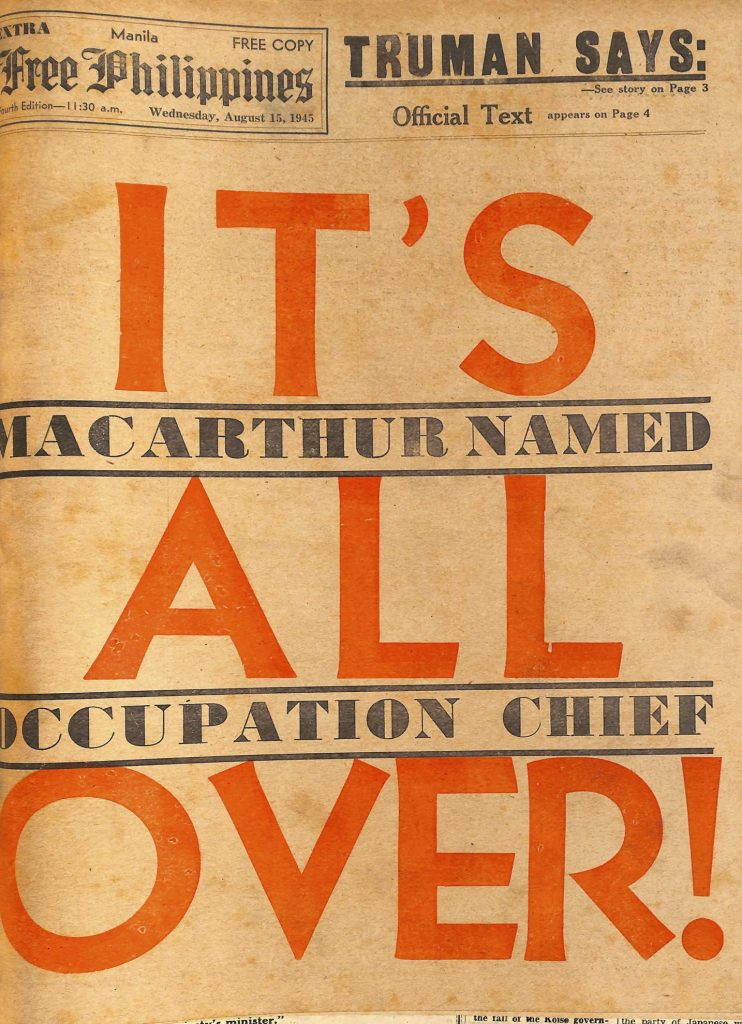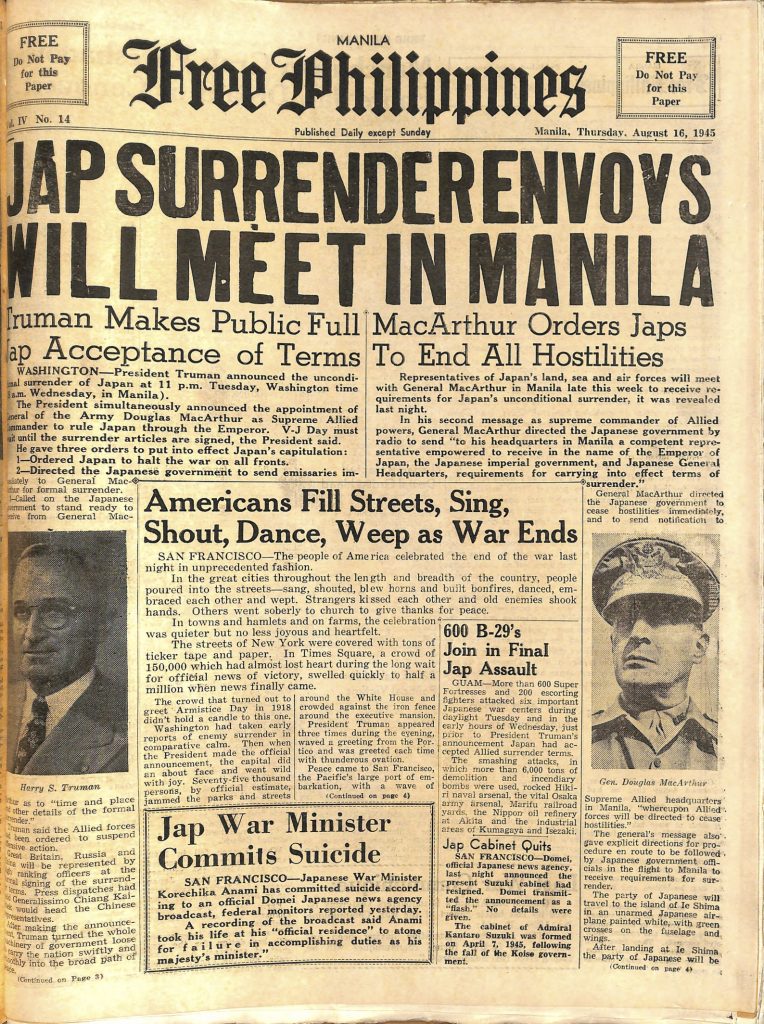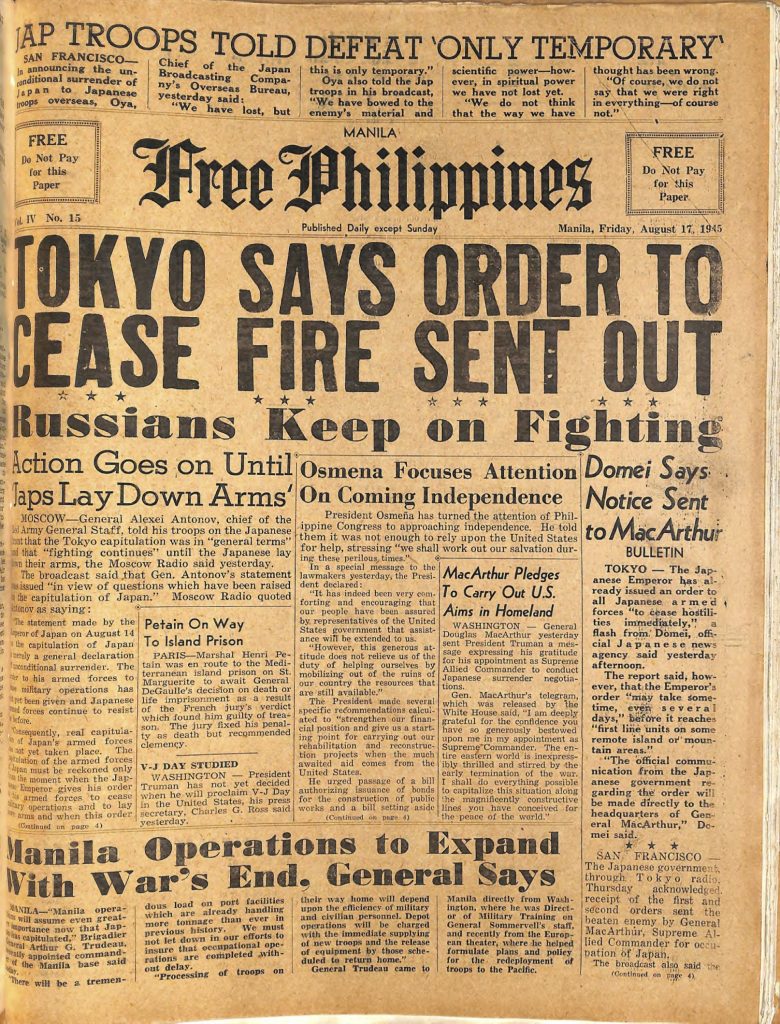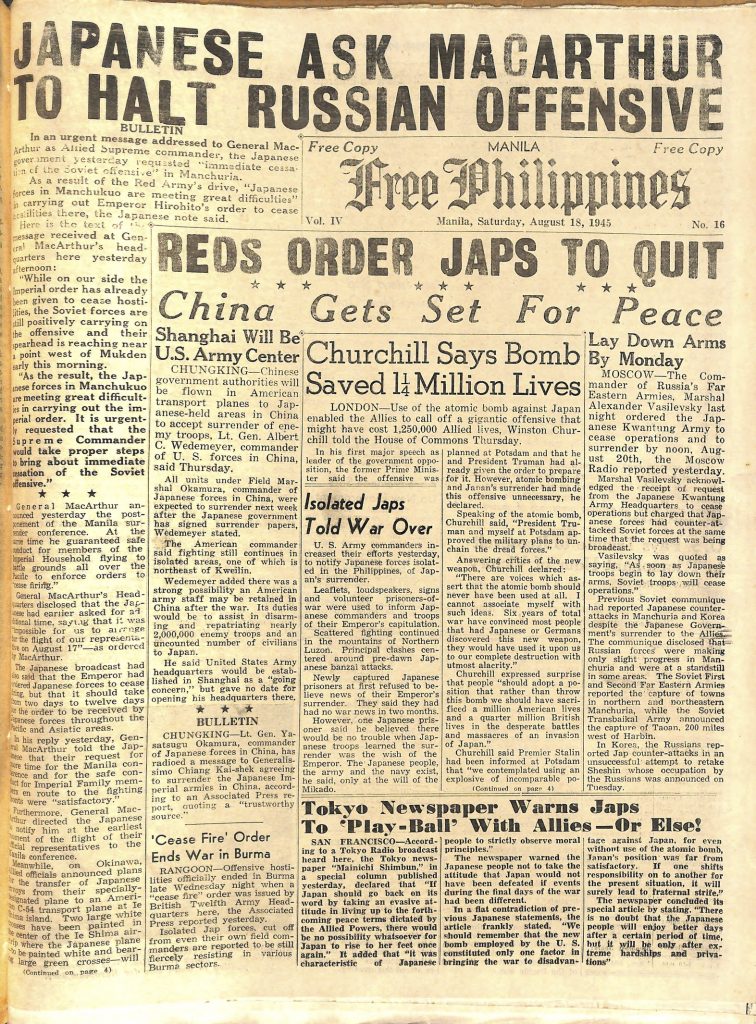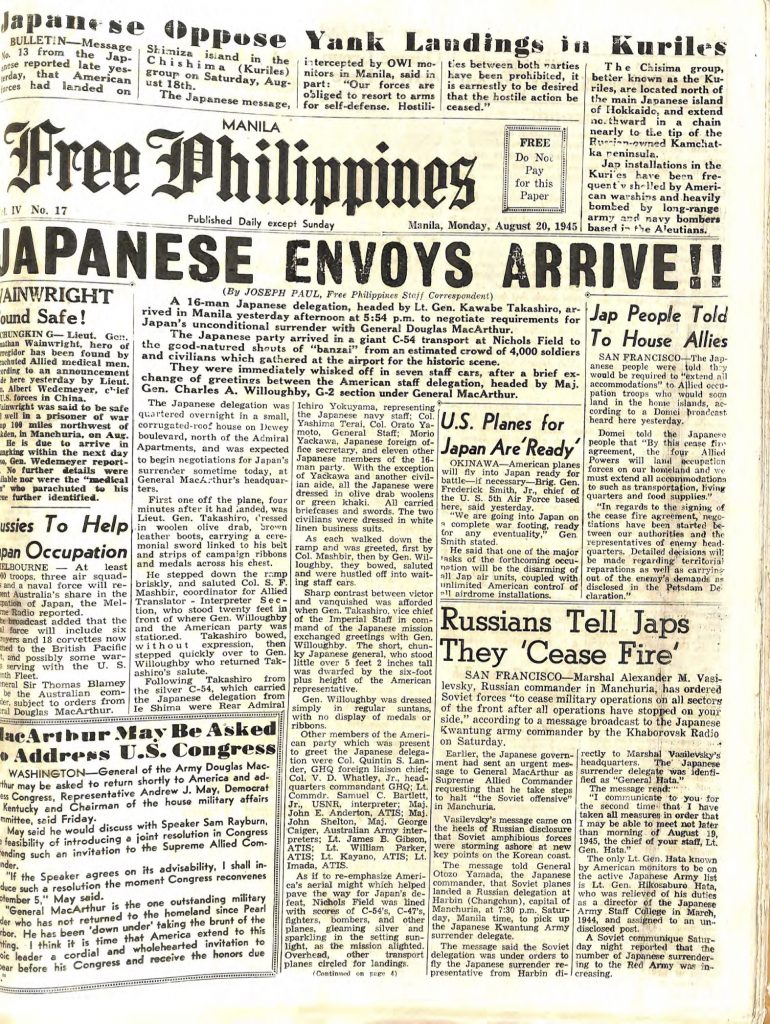(Above: February 27, 1945: Douglas MacArhur and Sergio Osmeña at the ceremony in Malacañan Palace in which the civilian authority of Commonwealth was restored in the capital)
This year marks the 75th anniversary of the surrender of Japan and the end of World War II in the Pacific. The Philippine Diary Project contains three unique perspectives on the final month of the conflict, from the time of the Potsdam Declaration from Berlin in July, 1945, to the landing of the Allies in Tokyo in August, 1945. They are the points of view of:
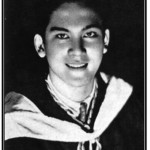
First, Leon Ma. Guerrero, journalist and diplomat, who was with the Philippine Second Republic’s embassy in Tokyo. He’d started his diary (as published, anyway) on January 1, 1945. Guerrero features prominently in the Bataan and Death March diary of his friend, Felipe Buencamino III, with whom Guerrero served in the Intelligence Section of the Philippine Army. After the fall of Bataan, Guerrero went on to continue in propaganda, this time, on behalf of the Japanese, maintaining his pen name of Ignacio Javier.He would go on to join the embassy established by Jorge Vargas in Tokyo. A lawyer, diplomat, and former journalist, Guerrero recorded events in the Japanese capital and the resort town in which diplomats had evacuated, from the privileged position of an embassy staffer, with the shrewd eye of someone who’d already had government and political experience, and a reporter’s gift for jotting down the telling detail.

Second, there is the diary of Salvador H. Laurel, the son of Japanese Occupation-sponsored President Jose P. Laurel, who was with his father in exile in Nara, Japan; his father had assigned him to keep a diary from the start of their evacuation from Manila to Baguio in December, 1944, and then on to their flight into exile in Japan. He combines the perspective of a young man and someone in the unique position of being able to observe the dying moments of his father’s regime.
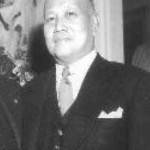
Third, writing in Iwahig Penal Colony in Palawan, there is the diary of Antonio de las Alas, who had been Minister of Finance in the Laurel government, a fixture in the prewar government (having served in the Quezon government and, at the oubreak of the war, he had just been elected to the senate), and who was under Allied detention for collaborating with the Japanese. His is a senior government official’s perspective, familiar with both the Americans and the Japanese, and observing the changes in affiliations and alliances as senior officials like himself went into eclipse.
Our story begins in mid-July, with the meeting of the “Big Three” –Winston Churchill, Harry S. Truman and Joseph Stalin– in the capital of defeated Germany: in a suburb of Berlin called Potsdam, to be exact.
The Potsdam Conference was the follow-up to the Yalta Conference, where Franklin D. Roosevelt, Winston Churchill, and Joseph Stalin had agreed that three months after the defeat of Germany, Russia would join the United States and Great Britain in waging war against Japan. Russia had maintained neutrality in the Pacific War, but the Western Allies, concerned about the expected immense casualties that an invasion of Japan would cost, wanted Russia to join the fight.
In the meantime, also because of the anticipated great cost in lives of a Japanese invasion, the United States had pursued the Manhattan Project and Harry S. Truman had authorized the use of the atom bomb against Japan.
On July 16, 1945, the atomic bomb had been successfully tested in New Mexico: Truman informed Churchill and Stalin of this fact in Potsdam the next day, July 17.
What follows contains day headings in italics come from The Last Days of Imperial Japan 1945 – 1951. Day information in underlined italics comes from World War Two in the Pacific: Timeline of Events 1941-1945, while the days also feature the front page of Free Philippines, the newspaper put out by the Office of War Information of the U.S. Army in the Philippines.
A quick summary of how the focus of events had shifted to the looming task of planning “Operation Olympic” –the expected invasion of Japan in 1946:
July 5, 1945 – Liberation of Philippines declared.
July 10, 1945 – 1,000 bomber raids against Japan begin.
July 14, 1945 – The first U.S. Naval bombardment of Japanese home islands.
July 16, 1945 – First Atomic Bomb is successfully tested in the U.S.
July 22, 1945
Walking in the resort town of Gora in the outskirts of Tokyo, young diplomat (and former journalist and Bataan veteran) Leon Ma. Guerrero jots down some sounds and sights:
Sights in the mountain resort of Gora:
A Japanese sporting a buckle labeled “Philippine Commonwealth”;
A Japanese boy playing with a model airplane but this one carried an American star on its wings instead of the Japanese sun;
A rickety brown inn along a rocky slope, full of school-children evacuated from Tokyo and Yokohama. The parents of two-thirds of them had perished in the last air-raids. Somehow the teachers had broken the news to their charges after many days of troubled apprehension. Perhaps the orphans wept that day and perhaps they still do it at nights but when I passed by, they were laughing and chasing one another in the chill sunlight.
July 23, 1945
A one-line entry by Leon Ma. Guerrero in Tokyo:
The railway volunteer fighting corps will be formally organized on the 1st of next month.
More substantial is Antonio de las Alas’ summary of news received in their detention cells in the Iwahig Penal Colony in Palawan:
The newspapers bring two pieces of news; one elated us, and the other alarmed us.
The first seems to indicate an early end of the war. United Press reports in New York that the United States government administration is taking steps to draft the United States unconditional surrender terms. New York Herald Tribune states that the possible terms as reported from reliable sources are the following: (1) Return of all territories seized by force; (2) Complete destruction of Japanese fleet and air force; (3) Dismantling of all shipbuilding facilities capable of turning out air crafts and munitions; (4) Japan will not be invaded, only a token “supervisory force” will be sent to Japan; (5) Japan is to retain her form of government, including the Emperor, and to manage her own political, economic and social affairs; and (6) Japan may be supplied with iron, coal, oil and other resources needed for civilian use.
Some parts of the above terms need clarification. For instance, what shall be done with Manchuria, Korea and Formosa?
If I were Japan, I would grab peace under the above terms. Japan is already beaten. With the hundreds of superfortresses, her annihilation or almost complete destruction is assured. Furthermore, due to her own fault, her dream of union among the countries of Greater East Asia has been blasted. Because of her record in these countries, it will take a century before her nationals will be welcomed in these countries. Not only did she disqualify herself to be the leader of any union to be organized here, but she will probably not even be admitted until she shows that she can treat other people as civilized people do. China may want to be the leader. If Manchuria and Formosa are returned to her, she will be the strongest nation in the world and may even dominate the world. The Chinese are not only good businessmen, but they have also shown themselves to be good soldiers. But they were also shown to be cruel at times. I believe that for the safety of the Orient, China be divided into at least three nations: North and South China, and Manchuria.
It is rumored that in Washington these terms for surrender were received with general approval.
He adds another item of news that will feature prominently in the weeks to come:
The above news must be related to other news. It is reported that Russia is acting as intermediary and that Stalin took with him to Berlin the surrender terms, evidently to submit them to the Conference between him, Truman and Churchill. Another news item is that before the Russian delegation left for Berlin, the Japanese Ambassador Sato, had a conference with Foreign Commissar of Foreign Affairs Molotov and with the Vice-Commissar.
Something must be in the offing. All of us expect or at least hope that termination of the war will come.
July 24, 1945
In Tokyo, Leon Ma. Guerrero reported that,
Near midnight on the 22nd a Japanese convoy moving under heavy rainclouds suddenly it came upon eight American destroyers about 20 kilometers off the southern end of Boso peninsula. Following an engagement of some 20 minutes “the enemy was routed to the south” while “a small fire was caused on one of the Nippon transports”. Such was the Japanese announcement today. The Americans for their part have announced wiping out the convoy.
July 25, 1945
In Tokyo, the sense that the noose is tightening around Japan is increasing, can be gleaned from Leon Ma. Guerrero’s summary of events and the reaction of the Japanese press:
For two weeks now the amazing American task force has raged like a typhoon along the Pacific coast of the Japanese homeland; yesterday it struck its most devastating blow so far. According to the joint army and navy communique which today, in headline type, covers fully one half of the Mainichi’s tabloid front-page, approximately 2,000 large and small American planes “repeatedly carried out attacks unprecedented in scale and scope” against four different army areas. The communique claimed only seven raiders shot down by 1:30 p.m. yesterday and admitted fires and “some other damage” in Osaka. This morning the radio said that more than 500 carrier-borne planes were back on the job.
Today’s Asahi tries to rationalize this spectacular disaster. “In coping with the latest enemy air-raids,” it says, “both our fleet and air-force have exercised patience and caution without developing a full-fledged attack. As a result a section of the public in the country has come to entertain the apprehension that the authorities concerned, in placing an excessive importance on storing up fighting power, have allowed our territory to be trampled underfoot by the enemy. Some even go to the length of doubting our fighting power itself. Such an attitude,” the Asahi says reprovingly, “is a remarkable error based on the failure to appreciate the war as a whole.”…
“Candidly speaking,” the Asahi concludes, “the present war situation is not necessarily advantageous to us. But once the enemy attempts to land, more advantageous fighting conditions will develop before us. We can say so decisively; it is an objective fact. Then if we utilize these strategic advantages with a vigorous fighting spirit, the war situation will turn favorable to us without fail.”
In Iwahig Penal Colony, Antonio de las Alas noted that,
Rumor is circulating that Russia had given an ultimatum to Japan to surrender to the United Nations within 72 hours. It is said also rumored that Japan has surrendered unconditionally. The Colonel and the Lieutenant deny that these rumors are true.
July 26, 1945: The Potsdam Declaration
On this day, Components of the Atomic Bomb “Little Boy” are unloaded at Tinian Island in the South Pacific.
The Potsdam Declaration was a final warning to Japan issued on July 26, 1945 issued by the United States, Great Britain, and China.
In his diary (because of the international date line), Leon Ma. Guerrero wasn’t yet aware of this; but his entry provides a snapshot of Japanese official posturing on the eve of what would mark the start of the end game for Japan. His entry is a masterpiece of sarcastic bemusement:
The Japanese learned “with trepidation” today that while the American task force is searing the imperial land with fire and steel, the emperor “is graciously engaged in state affairs, in high spirits despite his work.” Due to the destruction of the imperial palace “His Majesty is experiencing more inconveniences than before but he has had the graciousnesss to attend to state affairs in excellent health.”
The president of the board of information, who transmitted these facts at the inaugural meeting of branch-chiefs of the Dai Nippon Political Association, also recalled an anecdote on the emperor’s grandfather. When the great Prince Ito submitted his resignation as premier, the equally great Meiji answered with a sigh: “Alas, We cannot resign.”
Yesterday the Asahi also reported on the state of the Premier’s health. It seems that despite his advanced age (he will soon be 80), Suzuki is “rosy-cheeked and radiating health.” He has not been sick once in the four months since he took office. At that time an old shipmate, a retired navy doctor, had rushed up to Tokyo from Okayama and had appointed himself the new prime minister’s physician. He was now “thoroughly disgusted”; he had nothing to do. The old man’s blood pressure was 169; his weight had fallen off a bit from 22 to 20 kan (one kan equals 3.75 kilos or 6.23 pounds) but he had not suffered from it.
The secret of the premier’s health, it developed, was sleep; he slept at least 10 hours a day, retiring ay about 10 p.m. Not even an air-raid could make him lose his “precious sleep”. He received no visitors in the mornings, spending them “in speculation and thought”. For recreation he had a small garden; an inveterate smoker he had cut himself down to two cigars a day, since taking office and had allowed himself half a [illegible] each day. (one [illegible] equals 1.[illegible] liters).
An avid reader, he had lost his entire library in a fire-raid. But a grandson had found him a copy of the works of Laotsze in a second-hand bookstall and had pointed out a passage in this work which he considered the secret, not only of his administration, but of life itself. The passage: “The way to govern a great country is the same as to cook small fish. Cooking the fish quickly or over too strong a fire, breaks it up and spoils it. Whatever you do, do it slowly and well.
In the imperial cities along the storied rivers, in the startled villages of the northern coast, in the factory towns on the fabled highway of the Tokaido, by Inland Sea and the ravaged shores of Kyushu, while His Majesty graciously and in high spirits attended to state affairs and his prime minister dozed in the morning sunlight, drowsy with speculation, the flames were burning too quickly and the fire was too strong.
July 27, 1945
Later that day, an extra edition appeared carrying news of the Potsdam declaration:
In his diary, Leon Ma. Guerrero records how it was an unusually beautiful day; and then, the news of the Allied ultimatum was hinted at:
It was a lovely day in Tokyo today; the sky was a limpid blue, bright and lively with clear sunlight. It was cool for July; agricultural weather experts were worrying in the Times about the young rice. The temperature had not gone higher than 15 degrees; it was really March or early April weather; and the growing rice liked a little warmer sun. But the school-girls in their vegetable patches on the crest of Kudan hill were giggling and pushing one another, their voices high and fresh. A couple of soldiers from the barracks nearby were running after a stray pig; it was a small scrawny pig but it was tricky and elusive and the soldiers, clumsy and ungainly in their new yellow boots, stumbled amid the wreckage of a bandstand with loud excited laughs. In the wide formal park of the Yasukuni shrine visitors from the provinces were eating their lunches under the quiet trees. There was also a group of army clerks stretched silently on the grass. From the foot of the hill came the whine and clatter of streetcars toiling up the slope. It was a pleasant grateful lull in the fortnight of alarms; and the people of Tokyo, the grimy housewives gossiping in the ration queues, the thoughtful students dangling frayed white towels at their belts, the stumbling babies picking at their sores, the clerks and policemen, the technical majors and pathetic drabs, all wrapped in that curious and uniquely Japanese smell of pickled radish, cheap pomade, and soya bean sauce, were chatting and dozing in the sunlight wherever they could find it.
It seemed impertinent to note these things because in a distant German city, one day and half-a-world away, the powers at the gates had announced an ultimatum to Japan. The Tokyo papers hinted at it in subtle innuendoes. A delayed dispatch intercepted by Domei threatened that “immediately following the termination of the Potsdam conference, the Soviet Union, the U.S.A. and Britain are reported to have decided to make a vital joint proposal to Japan. They had no short-wave radios so they did not know but even as they sat in the sweet summer sunlight, the air above these dreamy people of Tokyo was vibrant with a last demand for unconditional surrender. Doubtless in the hidden halls and palaces the warlords were pondering on this message; perhaps even now the ministers of His Imperial Majesty studied one another’s faces with jealousy and suspicion as they debated what course could put the imperial mind at ease. But for this one miraculously peaceful day the mind of the common man in Tokyo was already at ease, in the soothing warmth beside the golden carp that swam silently in the depths of the imperial moats.
July 28, 1945
Tokyo’s dreamful lull did not last long. This morning about 240 P-51’s, led by several B-29’s, raided the Kanto district while some 600 carrier-borne planes were raking Central Japan. Life was once again hurried, stern, tense with dire warning and desperate decision.
July 29, 1945
Japan will ignore the Potsdam declaration. It develops that Foreign Minister Togo reported its contents to the cabinet at its regular meeting on the 28th and that the Japanese government would “say nothing on it”. No one else had anything to say on it. The Mainichi said the proposal was “most insolent” and “based on self-conceit” but neither in its own nor in the other editorial columns was there another word of condemnation, rejection, or challenge…
The mere fact the ultimatum has not been scorned and excoriated outright in the familiar terms of arrogance, contempt, and outraged defiance, betrays the faltering hand, the breaking nerve. The terms, as published, are hard: a naked, prostrate Japan penned up in her rocky islands, a beggar under guard; for the warlords and sealords, disgrace and an unknown punishment. But the alternative is suicide like Germany’s.
It is an electric silence. A decision has not been made by the pale brooding men who must make it or, if it has been made, the words have not been found to announce it. How should ruin be announced? How can suicide be made palatable?
July 30, 1945
From his diplomatic perch in Tokyo, Leon Ma. Guerrero observed the Japanese government trying to remain defiant; but he noted how this defiance was in the face of a very obvious ramping-up of the Allied bombing effort:
Can the Japanese government continue to “ignore” the three waves of carrier-borne planes that attacked the Kanto this morning, or the fleet that shelled Kamamatsu and the Kii peninsula last night, or the 500 B-29’s that set ablaze another constellation of cities on the night before? Pursued by these inexorable facts the generals and admirals must throw behind them a scrap of mendacity, a cheap and flashing trinket of bravado, to amuse and delay the hounds.
The Premier Admiral Baron, waving aside the Potsdam ultimatum as a mere rehash of the Cairo declaration, told the press last night that he was still “firmly convinced of final victory in the decisive battle”. But these were already frayed and shoddy words, their meaning faded by constant use; they were the small change of politics; the feeling remained that they were being traded for time while the big deal was being worked out. Potsdam is a long way from Cairo, as far as Saipan from Okinawa. Tozyo had never seen a B-29 over Tokyo; now Suzuki was talking to the press in his official residence, and not to a scheduled mammoth rally in Hibiya hall, because carrier-planes from a task-force at the coast of Japan had driven him to cover.
Nevertheless the old man had managed to ignore the postponement of his first public appearance as an orator and to reassure as best he could the proxies of his audience. After long delays, he announced, the construction of underground factories had finally been started. “Unusual endeavors are being made in that direction and great expectations can be had for its progress.”
Of course, he admitted, “it is but natural that during the period of transportation of machinery, production should fail to reach the desired figure.” But “efficiency was mounting”. The laborers, men and women, were working 16 hours a day “in absolutely safe areas and in perfect peace of mind. From time to time they were take outdoors and given physical exercise. The air in the tunnels was “not so injurious to health,” he had been told.
At any rate he had made several inspection trips and had found the number of underground factories on the increase. At one such factory “several hundred airplanes” were being turned out every month. The exact figures were secret but “the number is not so small as people may think.” “The other day,” recounted Suzuki,”a certain airman asked me how many hundreds of airplanes were being turned out a month. I said: ‘Why how many hundreds? It is not a question of hundreds but thousands!’”
In case this was not sufficient to distract the people from the deadly dilemma that confronted the country, the General President of the Great Japan Political Association, Jiro Minami, dangled another ambiguous and noncommittal red herring. “It is clear” he told the press, “that a complex intrigue underlies this (Potsdam) declaration. That is most clear in that the enemy is trying to allay war weariness in his own camp and trying to foster as desire for peace in ours.”
Perhaps he was reading his own fears and apprehensions into the designs of others.
He added a story told by a Japanese military police (Kempeitai) officer to the Philippine ambassador, Jorge B. Vargas:
A kempei captain told Vargas today that in his own limited district in Tokyo alone an average of two Japanese spies are being arrested daily. What was more portentious even than their existence was their motive. Usually they were fumbling amateurs with no means of transmitting the military information they had secured or hoped to secure. They were merely “investing” in it; hoarding it for the day when they might trade it for some measure of safety or advantage from the conquering invader.
July 31, 1945
Writing as a diplomat, Leon Ma. Guerrero in Tokyo summarizes the evolution of Japan’s attitudes towards the Soviet Union:
There was a time when the Japanese hoped to win a negotiated peace through the U.S.S.R. Probably about the time of Germany’s fall the foreign office received instructions to make a thorough investigation of Soviet foreign policy. Day and night the red-eyed experts pored over every speech, statement, inspired release, interview, and comment that had come out of the Kremlin since the start of the war. Finally the rather obvious conclusion was reached that the U.S.S.R. could follow three possible courses of action in East Asia: 1) Continued neutrality, which was eventually eliminated by notice of the Soviet Union’s intention to abrogate the non-aggression pact; 2) Entry into the war on the side of the Anglo-American powers at the last moment, in order to claim a share of the spoils; and 3) Positive arbitration of the war in order to enhance Soviet prestige as a peace-lover, a peace-maker, and an arbiter of the world. It was on this third, admittedly tenuous, possibility, that the Japanese pinned their hopes.
He then relates talk in the diplomatic grapevine on Japan approaching the Soviet Union as a go-between in negotiating with the Allies. He was unaware, of course, of Russia’s intention to join the war against Japan. But there were signs Russia was no longer a prospective go-between:
While the Japanese embassy in Moscow conducted the main campaign, the Soviet embassy in its evacuation center in Gora found itself the objective of a supporting action. We who were on the outside saw only slight hints and indications of these negotiations. Prince Konoe, well-padded with carefully groomed flesh, would spend a cryptic week-end at our hotel, 10 minutes by electric tram from the Soviets. A marquis would mention casually that Konoe and he had been treated to such a Czarist display of exquisite caviar and rare wines on the last time they had seen a Soviet newsreel in Gora. Or else a Chinese diplomat would tell with a chuckle the story that the Soviet ambassador, after accepting an invitation to dinner from Prince Konoe, had caught a diplomatic cold and had sent a secretary instead.
These days, however, in the negotiations are still kept a confidential story, it is only in chagrin and discomfiture. Prince Konoe had not been in Hakone for days. The Soviet embassy has no films to show except a newsreel on the fall of Berlin. The ghostly hope that the U.S.S.R. would save the warlords has finally been laid. The Soviet delegates sat side by side with the Chungking representatives at San Francisco. And following the developments at Potsdam with a glassy fascinating stare, the Japanese have seen their misgivings turn to doubts, their doubts to suspicions, their suspicions to apprehensions. There had been first the A1 dispatch, quoted by Domei, that “President Truman had succeeded in obtaining the consent of Marshal Stalin and Premier Churchill to placing East Asian issues at the top of the agenda”. Then there had followed “strong observations” that Truman and Stalin had actually “been negotiating on East Asian issues”. In the end there had come this solemn ultimatum which, though Stalin had not signed it, he must have seen over the shoulders of Truman and Churchill.
“The East Asian issue has entered into a period of decisive advance,” simpered the Asahi on the 27th. “If the report of an agreement on East Asian issues is true, then it must be based on the inevitability of war with the Japan as well as the alignment of the policies of the U.S.A. and the U.S.S.R. regarding the continent of China.” But in this peaceful valley at the foot of Fuji, Japan’s attitude, at least toward the Soviet diplomats in Gora, has not undergone an “adjustment”. From their trim white modern hotel, overlooking the descending hills and the misty sea, they go out every day, with their chunky, flashily dressed ladies, to nod amiably to the awed neighbors the steep streets or to buy a handful of blue pearls and a dozen carnation-embroidered kimono from the submissive storekeeper of the diplomatic shop. They do not bargain.
August 1, 1945
Carefully reading the papers for signs of official intentions, in Tokyo, Leon Ma. Guerrero writes that he detects a change in the Japanese posture, towards an openness to a negotiated peace:
The shadowy outlines and decision on the Potsdam Declaration may perhaps be seen in a Domei comment carried inconspicuously in an inside page of the Times today…
There is a faintly exploratory air in this analysis that underlines recent trends. The language is not violent; it is cautious and tentative. The American government, it seems to say, is not having an easy time of it (an echo of Kurihara); it is ready to bargain. The Potsdam declaration, furthermore, is not really an ultimatum; it is a show-piece for home consumption; it is a shrewd trader’s first offer; it can be jewed down. But what can Japan bargain with? It can bargain with its power and will to continue; a bloody resistance, ultimately suicidal and futile it may be true, but one that will require such heavy sacrifices that the Americans, impatient to end the war, frightened by mounting casualties, will be glad to avoid it by a reasonable arrangement.
Into this vague pattern the scattered hints and insinuations of the past few days fit readily. Suzuki’s underground factories and “thousands of planes”, Minami’s “complex intrigue”, the poised and silent watchfulness of the editors, take their places in the still sketchy picture of a deal, to be sprung at the proper time on the simple honest people who are even now preparing to die.
He then attended a Buddhist rally, and in the end, decided to leave early:
I felt this uneasy curiosity following me to a Buddhist rally at the Imperial Hotel for which invitations had been received at the embassy. It turned out to be for the purpose of passing a declaration on behalf of the 50 million Japanese Buddhists. A small banquet room had been arranged hastily as a hall-oratorium. Rows of chairs filled the center of the apartment while along the windows were arranged the heavy overstuffed lounging armchairs with which the place must have been originally furnished. There was an air of hasty improvisation, and perfunctory duty about the whole thing.
It was odd enough in itself that these shaven-skulled monks and gossipy old deacons about me should have been chosen to reaffirm Japan’s will to fight at this desperate crisis. It occurred to me that possibly it was because they could be trusted to speak more credibly and naturally in the gentle accents of sweet reasonableness. The warlords had eaten enough fire.
A couple of quietly dressed and elderly gentlemen were passing around programs and copies of the proposed declaration…
How meek and mild and ineffectual did these men look, their hands folded on their laps, their eyes on the frayed carpet. They looked so bewildered. What calculations of high state politics had called them from their sutras and their rosaries to drown with their mumbling prayers the clang of broken swords?
Foreign Minister Togo was present, as pious as the rest. He looked old and weary; hid phrases were perfunctory; and he hastened away immediately after speaking. The minister of education and the president of the board of information followed; the latter droned on and on for what seemed to be hours.
I could stand it no longer. I was going to tiptoe out. To a colleague I whispered that if any word was asked from our side he could rise and assure the congregation that “all the Filipino Buddhists were heartily behind the declaration.” There are of course no Filipino Buddhists.
For his part, a former member of the government (now in exile) which Guerrero still represented, Antonio de las Alas, reflected on the past. But he did receive some new news, days late:
On this day, Wednesday, August 1,1945 we read that at Potsdam, Germany, Truman, Stalin and Attlee (the new Premier of Great Britain), and with the concurrence of Chiang Kai Shek, sent an ultimatum to Japan demanding surrender. The conditions imposed were that Japan is to have only her four original islands. All lands taken by force must be returned.
August 2, 1945
In Tokyo, Leon Ma. Guerrero noted that Japan finally gave a reply to the Potsdam Declaration:
The warlords gave Japan’s answer to the Potsdam ultimatum at 5 p.m. yesterday. A special communique from imperial headquarters announced that “our army and navy preparations to cope with the enemy’s invasion operations are being steadily strengthened.” The somber implication is that Japan will fight to the end.
But he believed this was posturing:
However the furtive hope of a bargain is not necessarily dismissed. The communique, in going on to summarize losses allegedly inflicted on the Americans last month, may have intended to define Japan’s bargaining position. Admitting “fairly great damage” to cities, factories, aircraft and vessels, and “damage” to air bases and military facilities, IJN claimed having show down 43 large planes (including 29 B-29’s) and 175 carrier-borne planes. In the Okinawa area, from January to July 31, two carriers, one cruiser or destroyer, two destroyers, two transports, and three other warcraft, were claimed sunk. Japanese submarines, it was also alleged, had sunk two transports while three American submarines had been destroyed. Even admitting Daihonei’s figures the totals were not such as to terrify the Americans. Last night more than 500 B-29’s were again over Japan.
But it’s important to note, in light of what was to follow, that at this point, the Japanese still believed they could drive a hard bargain by actively resisting an expected Allied invasion:
Nevertheless the choice seems to have been made. If the Americans persist in the Potsdam declaration which, according to the Mainichi today, “goes much further than what an ordinary victory would entitle a party to in war,” then the Japanese will “steadily strengthen” their preparations against invasion. On the other hand an unspoken alternative remains: if the Americans wish to spare themselves the sacrifices of an invasion, then they might content themselves with the fruits of an “ordinary victory”, whatever that may be.
He closed his entry with an enlightening conversation:
Wondering once again how the Japanese felt about this choice that had been thrust upon them, I remembered a conversation with a young Japanese diplomat a month ago. We had been chatting over a midnight cup of bitter yellow tea in a narrow hotel room and it was almost time for bed. I had not seen him for more than a year and we had had many things to talk about.
On an impulse I asked him: “What do you think of the war?”
“I think we have lost it,” he answered.
“So you would be in favor of Japan making peace?”
“No,” he replied unexpectedly.
But if Japan has lost the war, I expostulated, what was the use of fighting on?
He studied me quizzically, a good-looking young man with black hair brushed back neatly.
“Oh, I see,” I fished. “You believe in bargaining, in fighting on for better terms.”
He gave a deep chuckle. “No, that is what the army is doing. That is what they have been doing for the past two years. No, I want the war to continue because the people haven’t suffered enough.”
“Not enough?” I protested.
“Not enough,” he said with a gesture of inexhorability. “Let them suffer. Let them learn what it is to start a war. Let them learn so hard that they will never start another war. Then we Japanese will really have something. We will be ready then to kick out these army bastards and build a good Japan.”
He made sense to me then, good hard cruel sense. Sometimes he still does.
August 3, 1945
Once again, Leon Ma. Guerrero provides a snapshot of a Tokyo –and Japan– committed to expecting a massive Allied invasion:
In this breathing-spell before invasion, it is strange, looking around, to see how imperceptibly and yet how inevitably these people and their country, through the small gradual deteriorations of every day, have come to the edge of the pit. One scarcely notices from one week to another, even from one month to the next, how greatly things have changed; how one almost never sees a pretty girl anymore these days; how tired and red-eyed the men are in the trains, the choking trains where shabby bristly men fall asleep on the shoulders of the stranger next to them; how one has grown not to expect the fish and vegetable rations, how many smokers wait patiently for a fortunate passerby to strike a rare matchstick.
But it is a society deeply hungry, even as every able-bodied citizen receives summons to join fighting units:
I note at random that the wife of a German I know surreptitiously eats handfuls of pine-needles from the hotel garden “because they are full of vitamins, you know”; that a pound of butter costs 120 yen; that one can get a hand-knitted sweater for five tins of jam or marmalade; that one excellent American noiseless portable typewriter is being offered for 2,000 cigarettes; that a marquis and a viscount, prosecuted for smuggling out platinum, have returned their titles; that street-vendors in Tokyo have been ordered to take shelter even during a precautionary alarm because of the single raider that dropped a bomb midtown the other day; that, possibly for the same reason, the long queues before the movie houses have disappeared.
The papers report that the vice-ministers have asked the people to gather five million koku of acorns (on koku is about five bushels) “to be turned into food”.
Ships’ crews have been organized into a “volunteer fighting corps of their own under the navy.
Meanwhile, the air attacks from Allied bombers continued to increase:
Writing in the Asahi the head announcer of the Japan Broadcasting Corporation says that “air-raid broadcasts have increased in number. In the beginning there were only two or three air-raid broadcasts concerning a single enemy plane but this has increased to 30 on the average. There was one air-raid broadcast every two minutes when enemy deck-planes raided Japan on the 10th July. The air-raid broadcasts totaled 300 and lasted for 10 hours at a time.”
Another paper reveals that Viscount Keizo Shibusawa, governor of the Bank of Japan, had opened up his private residence in Shiba-ku, Tokyo, to 37 homeless air-raid sufferers since April. He first took in nine assistant police inspectors. Later were added a high bank official and his son, three office girls, a shipyard manager and his girls, one dressmaker, four officers, the widow of a military man, five schoolboys, three maids, and the entire family of the steward. They all eat together and have access to the viscount’s library. “All the members of the household,” the news-story says, “have certain duties allotted to them. For instance, the nine assistant police inspectors are responsible for air-raid defense, the three maids cook, the widow distributes rations, the steward and the schoolboys take care of the truck-garden (converted from the tennis court and lawn).” Nobody knows what the officers do.
Step by step, one gets used to things from which a year ago, the Japanese would have shrunk with repugnance: living in a damp trench under a sheet of rust iron; drinking peanut juice “as white as milk”; sleeping uneasily in their working clothes. If the warlords’ bargain falls through, they can all presumably accustom themselves permanently to being dead.
August 4, 1945
Leon Ma. Guerrero recounts the experiences of a population subjected to constant air-raids:
A number of Filipino students were returning home the other day when their train was strafed. An Indonesian with them was killed outright by a bullet through the head; one of the Filipinos was hit in the arms and thigh and may have to undergo an amputation.
Two of our other students were luckier. Coming back from the south they were under constant air-attack but escaped injury, once by diving under the wheels of their railway carriage. Railways and ferries were in total confusion, they reported. The trains were crawling by fits and starts through a land in flames or in ruins.
August 5, 1945
In his diary, Leon Ma. Guerrero tells hunger stories:
The director of the Catholic school in Gora confessed to me that they were living on a day to day basis. What made things worse, he said, was that most of the members of his community were over 60 and received less rations than the ordinary man. He is not fooling himself; he has already bought a cemetery patch nearby.
The Japanese press itself has no illusions. Concluding a series of articles on the war the Yomiuri declares that “frankly speaking, the future of the food problem is very serious.”…
The Yomiuri also thinks it strange that mulberry trees should still cover enough land to grow six to seven million koku of sweet potatoes and wheat. “There can be no question of clothes at a time when there is about to be no food.”
“All in all,” the Yomiuri summarizes it up, “the food problem lies in the psychological attitude of each and everyone in the country. Some persons say that they cannot fight on an empty stomach. But they are the ones who would not be able to fight on a full stomach either.”
August 6, 1945: First Atomic Bomb dropped on Hiroshima from a B-29 flown by Col. Paul Tibbets.
After leading off its Potsdam story two days ago with the observation that the Big Three “failed to produce anything that has direct bearing on the war in the Pacific”, the [Japan] Times today front pages the British foreign office statement on the war against Japan, including the official comment that “it is impossible to draw the inference from the communique that Russia will not enter the war against Japan.” It is the first time I have seen it openly and directly admitted in the Japanese press; so far editorialists have talked obliquely of “chance of attitude”.
August 7, 1945
In Tokyo, Leon Ma. Guerrero recorded initial reports about the dropping of the atomic bomb on Hiroshima:
The San Francisco radio announced today that a new “atomic” bomb had been dropped on Hiroshima yesterday the 6th, wiping out 60 per cent of the city at one blow. Apparently the bomb is built on an entirely new principle, the splitting of the U-235 atom. From another viewpoint, the principle is as old as war, mass murder.
But if we do not know much about it, and do not know how much to believe of what we have heard, the ordinary Japanese knows so little that he does not even seem to care. A brief communique from imperial general headquarters, issued at 3:30 p.m. today, reads in full:
“1. Due to the attack by a small number of B-29’s on the 6th August considerable damage was caused to the city of Hiroshima.
“2. In conducting the attack the enemy seems to have used new-type bombs. Details are now under investigation.”
Just as interesting was his analysis of the seeming indifference of the Japanese public to the news:
The man in the street cannot be blamed if he sees nothing particularly alarming about that. “Considerable damage” is several notches above the usual “negligible”, “very slight”, and “slight” but it is still below the occasional “heavy”. “New-type bombs” is vaguely disquieting but the Japanese are still sufficiently naive, scientifically speaking, to take even the splitting of the atom for granted. It is a curious novelty, like an electric torch, but these things are always happening in the strange surprising world of modern times. What will these “new-type bombs” do? We are forbidden of course to discuss with the Japanese the information we receive by short-wave. But I could not resist asking the boy who mops out our bathroom the same question: what did he think these “new-type bombs” were like? He shrugged his shoulders. He had not thought too much about it. Then, head cocked to one side like a little bird, he said: “Well, maybe they kill a hundred people instead of 10 or maybe they burn concrete houses like wood. I don’t know.” He bowed and sidled out, leaving me to wonder if he cared at all.
August 8, 1945: The Soviet Union declares war on Japan.
In Tokyo, as Japanese officials scrambled to comprehend the atom bomb, Leon Ma. Guerrero recorded nearly in real time, the details of the Hiroshima bombing being pieced together:
The details of the new bomb are still “under investigation”. One feels that the authorities are just an puzzled and bewildered by the whole thing as anybody else; they are certainly withholding the extent of the damage but do they know any more than the average man about the nature of its cause? was it one bomb or several? Was it an incendiary bomb, an explosive, a combination of both?
The first accounts in the local press are cautious…
The Americans have announced that leaflets have already been dropped warning the Japanese of the new bomb’s unprecedented destructive power and the Asahi ends its story by calling on the people “not to be misguided”. Perhaps in preparation for an official declaration on the bomb the Times today, which has not yet carried a story on Hiroshima..
After extensively quoting Japanese editorials on the differences between the West and the East in making war, Guerrero reflects,
There is an exasperating emptiness to these eloquent and elegantly-balanced phrases. It is like listening to a professor belaboring a syllogism while the classroom burns. The man is splitting hairs when a bomb is splitting atoms. Perhaps a year of a hundred years from now philosophers and historians will have the perspective to weigh the relative values of Western science and Oriental spirit. Right now we are more interested in what will happen to us, whether it is safe to take the train to Tokyo tomorrow, whether the new bomb will poison water, whether peace will come.
I know I should be thinking of the implications of a bomb that can wipe out two-thirds of a great city at one fell stroke but somehow the mind refuses to pick up the problem and it lies at my feet ticking with a quiet insistence. The question of peace is the farthest that the mind will reach. Some say: “It’s over. The Japs will have to give up.” Others are not so sure. They mumble about exaggerated propaganda or they cry in despair that the Japanese are crazy; they will die rather than surrender. To them the measured cadences of the Times editorial today have the sinister sound of a man walking to the gallows.
Yes, the Japanese will stick it out, they say. They will burn in their cities, disappear in a sickening flash, and then the gaunt roasted survivors will dig in, in the caves and crevices of mountains, by a last lonely beach…
And Guerrero reflects that the horrifying questions posed by the war makes people seek refuge in trivial details:
Psychological speculation is scant comfort for those of us who are caught here between scientific murder and a suicide complex. Presently the tight groups, heatedly debating peace and war, break up; the mind, frightened by its own reflections, scurries away to its favorite corner and toys with the familiar commonplaces of the day’s paper. Let us see now….
The Japanese army in the southern regions has announced its “assent to the establishmnt in the middle of August of a preparatory commission for East Indian independence.”
The cigarette ration has again been cut from five to three per person per day. In case the production of cigarettes becomes impossible the equivalent amount of cut tobacco will be supplied.
A certain factory in Nagano prefecture has succeeded in producing a substitute for Manila hemp from dwarf bamboo creepers; it is cheaper by 20 yen a pound.
A group of scholars has called for donations of materials for an Okinawa museum and library in Tokyo.
Real summer has started, according to the papers. The rice is flowering about 20 days behind schedule but the rising temperature during the past week may save the situation.
(It is pleasant out here in the garden by the miniature waterfall, sparkling and laughing as it tumbles over, while the red, black, and golden fish wheel silently in the quiet pond.)
Let us see now… The classified ads are always good. Wanted to exchange: bicycle, foreign make, 22 inches, in good condition, for men’s shoes, size 10% men or larger size.
For sale: a set of sofa and three armchairs; easel, almost new, in perfect condition; gentleman’s white linen summer suits and also one white waistcoat; Nippon Gakki upright piano, 85 keys; Vacumatic Parker fountainpen, for immediate sale to highest bidder, also ivory mah-jong set.
Wanted to buy: baby’s perambulator, shoes for girl 5-8 years, linguaphone language series for Russian and others, English books on China, razors, sewing machines, accordions.
(The mind drowses contentedly. Whatever happened to that gentleman who was selling shirts, three white second-hand, two black perfectly new? I wonder what they will serve for lunch…)
Back in Iwahig, Antonio de las Alas reflected on the other historic development of recent days: the defeat of Winston Churchill in the recent British elections:
We learned of the defeat of Premier Churchill of Great Britain by Clement Attlee, a Laborite. Politics is certainly a most ungrateful game. It was Churchill who saved Britain. If it were not for his indomitable spirit, his determined will to fight, Britain might have succumbed. But people or the electorate is fickle. The same thing happened to great Clemenceau of France after the First World War. Wilson died disappointed because the United State Senate turned down his League of Nations.
August 9, 1945: U.S. Drops Atomic Bomb on Nagasaki; Emperor Hirohito convenes Supreme War Council; Soviets invade Manchuria
An extra edition with news of Nagasaki:
And yet another extra edition with news of the U.S.S.R. entering the war against Japan:
Even if far away from the center of events, the Iwahig Penal Colony was up to speed on the big news, as Antonio de las Alas recounted:
Big News. Russia declared war against Japan. This is now practically a war by the whole world against Japan. Taking into consideration the military strength of Russia, the Pacific War cannot last much longer.
For the first time the Americans dropped in Hiroshima, Japan, an atom bomb. Its destructive power is beyond classification. It is said that it is equal to bombs thrown by 2,000 superfortresses. It kills everything and lays waste an area covering a radius of seven miles.
With Russia’s entry and this new bomb, Japan will have to surrender.
For his part, Leon Ma. Guerrero, with his information from the diplomatic grapevine, knew at once of news of the dropping of a second atomic bomb on Nagasaki:
As San Francisco announced that the second “atomic” bomb had been dropped on Nagasaki shortly before noon, the vernaculars started to open up a little on the subject. It seems that “the authorities of the various government departments concerned have dispatched officials to the scene of destruction.” “According to a survey made, the new-type bomb drops toward the ground with a parachute and issues a strong light when the bomb is about 500 to 600 meters above the ground and then explodes. Simultaneous with the explosion, a large detonation is heard and a strong blast and strong heat accompany it.”
“Full caution,” warns the Asahi, “is considered necessary but it is pointed out that in case or a new-type weapon, its effects are usually exaggerated. For instance, when the V-1 made its appearance, considerable confusion and disturbance were Witnessed in England before counter-measures were devised. Upon completion of the counter-measures, the composure of the people returned.”
Guerrero then wrote in exasperation over the feeble advisory from the authorities on how to respond to the dangers of atom bombs:
What counter-measures were contemplated against this “new-type” bomb?The Asahi also published a statement of the air-defense headquarters giving directions as to the methods of defense against it…
There is almost a touch of the sinister in this stupidity. Get into a trench and pull a blanket over your head — but don’t forget to put out the fire in the kitchen! It is impossible to believe that air defense headquarters really thinks a blanket and possibly a pair of gloves can ward off the gigantic flame that dissolves an entire city. It is more reasonable to see in these “directions” a deliberate attempt to assuage the alarm of the people; if that is all that is needed, then the new~type bomb is just a bigger incendiary which burns people as well as houses. There is authentic art in that artless reminder not to forget the kitchen fire.
How long will the Japanese continue to believe it? When they learn the horrible truth, will they rise at last to cry enough or will there be anyone left to rise?
And yet, what could the authorities have said? What defense is there against this new “atomic” bomb? Tonight we were discussing heatedly the relative protection afforded by a swimming pool and a deep cave. But what was there to say? We did not even know whether the bomb killed by heat, by concussion, by radioactive radiations, by gas, or by some other terrifying mystery of dissolution. A blanket over the head seemed just as good as anything else.
But there would be another bombshell, news-wise, left for that day:
Then just before dinner some of the evacuated Japanese school-children in the village ran up to a Burmese cadet with whom they had made friends. They were laughing with excitement. There was a new war. The radio, they said, had announced at five that afternoon that Soviet Russia had declared war on Japan. We flicked on the short-wave radio. San Francisco confirmed it.
Somebody laughed. “We won’t have to worry about that new bomb anymore. It’s all finished.”
Late that night, the Emperor of Japan met with the Supreme War Council in an air raid shelter in the Imperial Palace grounds. The moment of final decision had come.
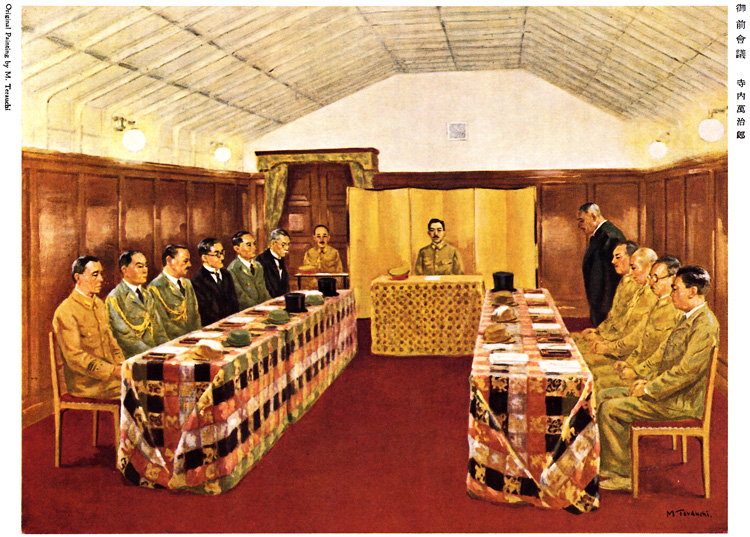
Imperial Conference of 9-10 August 1945
(painting from Reports of General MacArthur)
August 10, 1945
In Tokyo, Leon Ma. Guerrero recounts the reactions of diplomats to news of the declaration of war by Russia on Japan:
The Soviet declaration of war has thrown this diplomatic hideout into a turmoil even louder and more confused than the new bomb. Even those who doubted the persuasive powers of the atom have thrown up their hands. Nobody seems to doubt now that Japan is doomed. The only questions are when and how. Will it be in a week or by spring? Will Japan surrender formally or will she commit national suicide? when these questions are finally answered by events, the solution will appear inevitable; it will seem to those who look back that they should have seen it all the time, that the signs were always there for anyone to read. But now we are still in the forest; there are cryptic marks blazed on the tree-trunks, footprints losing themselves in a tangled thicket, wild unintelligible cries that call to the unseen.
Puzzled and uncertain about the future, we can only look back a little distance along the way we have already come. The diplomats especially, the professionals of power politics, feel easier when they can rake over the dead leaves of mistakes that do not matter any more. Look here, if the Japanese had not forded this river here or if they had gone forward along that valley… A German diplomat insisted on explaining to me where Japan had made a fatal error about the Soviets. If the Japanese, he argued, had accepted the German proposal to join the war against the U.S.S.R. in 1940, the fate of the Axis would have been different. Now Japan had to fight the Anglo-Americans and the Soviets singlehanded as Germany had done and where was that precious non-aggression pact now?
There’s time for a blame-game between Axis allies, too:
Then a Japanese diplomat took me aside. “The Germans blame us,” he complained, “for attacking the U.S.A. and bringing the Americans into the war. But we are more inclined to blame the Germans for attacking the U.S.S.R. The trouble with the Germans is that they have always been obsessed by fear of Russia.” He sighed and concluded: “Basically the trouble with the Axis was that Japan and Germany could not agree on the enemy.”
In this angry exchange of recriminations nobody seemed to remember the Japanese people who, after all, would perhaps have a say on the matter. All the newspapers had carried in full the Soviet declaration of war with its bland revelation that the Japanese government had actually asked for Soviet mediation in the war.
How were the people taking this hint that the imperial land might be conquered after all, that the Son of Heaven might sue for peace? There was the impact of an “atomic” bomb in the suggestion. For that was all the Japanese had left now: their blind faith in an unconquerable divine destiny, one last faithful ally against the world, one last cave in an earth laid desolate, an old familiar blanket against the cataclysmic flame of a new age.
And then, Guerrero tells human stories as everyone recognizes Japan’s survival is even less likely now that Russia has entered the war:
Stories began to be told in that chattering circle of foreigners. They were cruel sardonic stories, the type of stories that foreigners always tell about the countries they happen to live in, the type of stories that white men in particular like to tell about “natives”. But through the air of amused superiority, tinged with a resentful uneasiness, I could not help but see a strangely appealing picture of this odd fairy-book people, these shabby clumsy and withal gallant peasants with their fantastic readiness to die for a legend, a romantic lie. For that is what the stories told.
Last night, after the news of the Soviet entry into the war, the manager of the diplomatic dry-good store in the village came roaring into the hotel. He was fighting drunk, this small rather conceited corrupt merchant, He and 30 million other Japanese, he cried, were ready to die rather than see Japan surrender. If the worst came to the worst, he wept, he would kill his wife, his children, his neighbors, and any foreigner, any bloody foreigner, who happened to be around. And then he would cut himself open. They all laughed at him and he went to sleep; somehow it was comic to imagine him with his entrails spilling over his shoddy pearls and fake curios.
Earlier a maker of tofu (bean-curd) had been teaching a foreigner how to make charcoal. They got to talking about the new-type bomb and the foreigner asked him what he thought of it. He was a slow conscientious worker and he did not stop puttering about the fire. What was he to say? Well, he decided finally, it was like this. He was an expert maker of tofu. Many foreigners had asked him to teach them the secret of the process. Not all the professors across the seas had ever succeeded in solving it. Now, if these foreigners could not even make tofu, how could they make a bomb that was better than the ones the Japanese make?
There was a visiting manicurist in the hotel, a devout and chatty old woman who had gone to pay her respects before the emperor’s palace every day of her life that she had been in Tokyo.
What did she think, somebody had asked her. would Japan be defeated? She did not think it possible. But the Americans had a new and terrible bomb, the Russians had entered the war, the Japanese where fighting the whole world. Even then, she insisted. The Tenno was divine and he would not abandon his people. Her faith was not so noisy or belligerent but would she be any more eager for surrender? In the face of this determined romanticism, our hopes of the night before for a quick peace, a formal surrender, seemed to shrink and shrivel up.
In far-off Palawan, the Iwahig Penal Colony was abuzz with rumor that a big announcement was forthcoming, as Antonio de las Alas recounted:
Lt. Hagonberg came this afternoon to say that the radio had announced MacArthur was going to speak about 7 o’clock. He was expected to make a very important announcement. Naturally, we became very anxious as we expected MacArthur to announce the termination of the war. After 7 o’clock, we were all outside, anxiously waiting for the return of the Lieutenant. At eight, he had not come; at nine, he had not arrived. Disappointment could be seen in the faces of all of us. Ten o’clock signal sounded and the rule was we had to go to bed and put the lights out. We went to bed, but nobody slept. We were still waiting for the Lieutenant. Whispers could be heard — maybe the news was bad, and that’s the reason why the Lieutenant did not come. At 10:30 we heard an automobile coming. We all jumped out of our beds very excited. It was the Lieutenant. He drove the jeep slowly and walked towards our quarters slowly. He did not seem very happy. We also assumed a serene attitude, not unlike the countenance during funeral services. Before he could speak, many of us instinctively asked him for the news.
He spoke slowly and seriously. He told us that the radio announced that Domei, the Japanese International News Service announced that Japan had sent notes to the United Nations, through Switzerland and Sweden, accepting the Potsdam ultimatum. To us this is very important news. We all felt happy. We could not sleep the whole night — we were too excited.
August 11, 1945
An extra edition for that day:
The day began with Leon Ma. Guerrero going to see how Soviet diplomats were doing in detention:
I sneaked up to Gora today to see how the Soviet diplomats were getting along._The village itself was quiet; the streets were almost deserted; the front yard of the hotel where the Russians have been interned was silent and empty; there was not a policeman in sight. The Hakone mountains had never seemed so far away from the war.
But the main event of the day was a rumor spread by a Burmese diplomat:
Then after lunch the Burmese military attache abruptly told us that Japan had sued for peace. We could not believe the news. And when San Francisco confirmed it, hour after hour, we subconsciously protected ourselves from disillusion by worrying over the condition attached by the Japanese government, namely, that the prerogatives of the emperor as sovereign would not be impaired. Would the Americans reject the condition as against the Potsdam declaration? On the other hand, would the Japanese sacrifice their emperor for peace? Once again we tugged and pulled at the puzzle, with the exasperated feeling that the answer was already known.
The Burmese military attache thought that perhaps the Japanese had purposely put a condition that would at the same time appear reasonable and yet be unacceptable in order to solidify public opinion at home and divide it abroad. The suggestion did not sound far-fetched. The emperor was eminently the one condition on which the Japanese could agree, the one condition for which they would all be ready to perish. He was also one condition which could be calculated to divide the Americans who believed so passionately in leaving other people alone to choose their own form of government. What a masterful intrigue if it were true!
It was only on this day, that the Japanese press reported the effects of the atomic bomb on both Hiroshima and Nagasaki:
But the new bomb floated ominously over these intricate and subtle calculations; what did the cunning of diplomatists and the fanaticism of peasants avail against this imponderable atom dangling from its parachute? While the air crackled with its secret offers, the vernaculars published today the first eyewitness accounts of Hiroshima. The Yomiuri, which also noted briefly that another “new-type bomb” (in the singular) had been dropped on Nagasaki on the 9th…
…Presumably on the basis of these first-hand experiences the air defense headquarters has issued further instructions on how to deal with the new bomb. There is a frantic reiteration about them that borders on hysteria.
“1. It is very effective to seek safety in an air-raid shelter. It is necessary to repair and strengthen shelters which are covered.
“2. In regard to dress, one should expose as little of the body as possible. Otherwise one will suffer burns.
“3. The use of an air-raid-defense hood and gloves will prevent burns in the head, face, and hands.
“4. If there is no time to seek safety in an air-raid-defense shelter or if there is none in the neighborhood, one should lie flat on the ground or utilize a solid building for protection. But it is important to seek safety in an outside shelter.
“5. If the above points are remembered together with thos -previously announced, the new-type bomb will not prove to be so powerful.”
Meantime the Japanese government has filed a protest against the use of the bomb. The note was sent through the Swiss yesterday. Possibly it is important for the record. At any rate the Japanese can get from it their first accurate idea of the new bomb.
In Iwahig, Antonio de las Alas notes,
White House in Washington confirmed that a surrender offer had been received from Japan. The news of the previous day came only from a newspaper service. It was not official. Now this is official. Washington intimated that they were in communication with England, Russia, and China.
August 12, 1945: Emperor Hirohito orders his government to prepare a document accepting surrender
In Tokyo, Leon Ma. Guerrero recounts rumors –and the growing sense that despite the fierce rhetoric, a note of what is to come is already being sounded:
All the world knows that the Japanese are ready to surrender except the Japanese, A rumor ran through the Village today that Japan had made peace with the U.S.S.R. but it did not go further. A proclamation issued by the war minister on the 11th notified the army: “The only task before us is to fight out the holy war resolutely for the maintenance of the divine state. Even though we may eat grass, gnaw earth, and sleep on the fields, we shall definitely and resolutely fight. When we do so, I am confident, there will be life even in the midst of death.”
The people know no more. The papers still maintain the atmosphere of unrelenting war. The comuniques follow one after the other: “fighting is proceeding” in Manchoukuo, Chosen, Karafuto; the air force has attacked the American task force in the waters east of Miyagi prefecture; hundreds of B-29’s and carrier-borne planes are blasting Kanto, Chiba, Ibaraki, Tokushima, Kainan, Hachinoye, Misawa, Ominato, and all of Kyushu. The government is studying the conversion of tea leaves and mulberry leaves into a vitaminized flour; 20 girl employees in Karafuto are donating their spare time to the manufacture of salt; the sake output has been increased; benzine is being wrung from pine resin; four railway employees at Yamakita have been awarded prizes for safety maneuvering a burning freight-car full of explosives into a forest before it blew up.
But the announcement of the president of the board of information on the same day as the war minister’s proclamation had already a Delphic note. “The worst condition has now come,” he said. “To defend the last line, to protect the national polity and the honor of our race, the government is exerting its utmost efforts and at the same time expects that the people will also overcome the present trial to protect the polity of the empire.”
In the Iwahig Penal Colony, a phoned-in rumor had detainees like Antonio de las Alas celebrating the end of the war, prematurely as it turned out:
After Mass and breakfast, while I was inside our quarters, pandemonium broke out down below. Everybody was jumping and yelling, “War is over!”. We all went down to join the celebration. I noticed that everybody had tears in their eyes — probably because it meant the triumph of liberty, democracy and justice, but at the same time reminding us that we had suffered, were still suffering as a result of an injustice; probably because it meant our early liberation — we will soon be out to see our dear ones. How many nights have we spent crying, remembering the wife and children we left behind. The rejoicing continued for one hour. When all had calmed down, we inquired where the news came from. I turned out that somebody had telephoned the news to the guard and it was the latter who transmitted the news to us. This did not dampen the rejoicing, however. We were anxiously waiting for the Lieutenant because we thought that if the news were true, he would hurry to communicate the news to us since he had been showing undue interest in our welfare and liberation. When the whole day passed without the Lieutenant making an appearance, we began to doubt again. It was the first time that he did not come the whole day. But we never lost hope, we still believed it was true.
August 13, 1945
In Tokyo, Leon Ma. Guerrero records news as it reaches the diplomatic grapevine, a day late in many instances:
The American reply to Japan’s peace offer has been announced by San Francisco. Delivered yesterday the 12th it demands that the authority of the emperor and the Japanese government be subject to the Supreme Commander of the Allied Forces, presumably General of the Army McArthur. The question is more alive than ever: will the Japanese accept? The tone of the San Francisco bulletins which, with monotonous insistence, emphasize every hour that MacArthur will be the emperor‘s “boss” should warn the Japanese leaders what they can expect.
He also recounts what his fellow Asian diplomats were saying, as well as the possibility the state-controlled media was dropping hints to prepare the public for a possible forthcoming decision:
A Burman wondered why the Japanese, if they were really ready to surrender, had made an issue of the emperor’s prerogative. Now they must either take a clear humiliation, with possibly disastrous consequences to the prestige of the throne or go the whole way to national suicide.
A Thai explained that the Japanese were worried lest the emperor be brought to trial as a war criminal. A more reasonable explanation seemed to be that the Japanese government feared the Potsdam declaration on democracy might mean the forcible overthrow of the throne. At any rate the American reply is that the ultimate form of government in Japan.will be established on the basis of the freely-expressed will of the Japanese people which is a different matter since the Japanese will probably choose to retain the emperor.
A Chinese however doubted that Emperor Hirohito would personally survive defeat. He judged it probable that the present emperor would abdicate and leave the throne to the crown prince who, being still a boy, would not appreciate and suffer the indignities of surrender and who, if his coronation were suitably deferred, would not actually submit as emperor to the dictation of a foreign commander.
Some ambiguous echoes of this momentous debate have been allowed to reach the Japanese people. Commenting on the proclamation of the president of the board of information which only referred to ambiguous “utmost efforts” on the part of the government and called upon the people only to “overcome the present trial” and to protect ” the polity of the empire”, the Asahi today worried “How is His Majesty the Emperor? The concern of the 100 million people hangs on this question. when we turn our thoughts to it, we feel a pain in our breast. It is this pain that will enable us to bravely overcome the worst and last trial. So long as the loyal subjects have the ruler, the _____ to advance is clear and the glory of the empire will be maintained.”
And also, some gossip about the then-Crown Prince, the future Emperor Akihito:
There has also been a significant series of inspired stories on the crown prince. On the 11th the Times front paged an announcement that it had been decided to establish a separate household for the crown prince and that a grand steward, concurrently grand chamberlain, had been appointed for him. Yesterday the 12th the Times had a longer story, centered on the front-page…
A Japanese diplomat however explained to us that the stories were strictly routine and not a preparation for the emperor’s abdication. Every crown prince, upon completion or the primary grades in the company of other boys, takes up higher studies by himself under a faculty of tutors. This accounts for the establishment of a separate household at this time.
In Iwahig, Antonio de las Alas records the news that has filtered through:
This day we received official news that Japan had offered to surrender with only one one reservation — Emperor Hirohito be allowed to continue. We could understand this. To the Japanese, the Emperor is not only a political head, he is also a God, the head of the Japanese religion. Furthermore, without the Emperor, there would be revolution, chaos in Japan.
We also learned officially that the United States, Great Britain, Russia and China accepted the offer of Japan with the clarification that Emperor Hirohito would have to govern under the orders of the United Nations’ Commander-in-Chief in Japan who will be an American.
August 14, 1945: Japanese accept unconditional surrender; Gen. MacArthur is appointed to head the occupation forces in Japan.
And the extra edition eagerly awaited:
In Iwahig, in detention, Antonio de las Alas records exciting news:
FLASH!
WAR IS OVER!
Japan has accepted all the terms of surrender. Now the announcement is official.
Rejoicing all around. Everybody believes that we will soon be out. I was asking myself however, “What will be the next step with reference to us?” I asked myself this question since in recent years, especially during the last months, we have experienced so many disappointments that I always fear that another one is forthcoming.
In a second entry for the day, Antonio de las Alas added,
The Lieutenant came and told us that Admiral Nimitz is now conferring with the Japanese officials, probably on the terms of the Armistice. Some consider this a blow to MacArthur as he must have been expecting that he would be the one to sign the Armistice agreement and to receive the surrender of Japan.
The Lieutenant also told us that the Domei had been communicating in code with all radio stations controlled by the Japanese. We suspected that instructions concerning the war are being transmitted.
But in Tokyo, no news, only rumors, as Leon Ma. Guerrero recorded:
Tokyo was still silent on peace today and the rumor spread that an atomic bomb would be dropped on the capital if the American terms were not accepted by the 18th. But in all probability they will be accepted. It has been announced that the emperor will have an important message for the Japanese nation tomorrow morning. Even the Japanese in the hotel are now talking in excited whispers. Some suspect the truth; others believe the emperor will call upon all his loyal subjects to fight to the end; but most do not know what will come tomorrow. They wait with a silent submissiveness to do what they are told.
August 15, 1945: Japan Agrees to Surrender; Attempted Military Coup in Tokyo
And the 4th edition of the paper, particularly thrilling news for Filipinos:
For Japan, it would be the “Jewel Voice Broadcast” that would leave its indelible stamp on history:
(Above: The Gyokuon-hōsō or Jewel Voice Broadcast, of Emperor Shōwa, August 15, 1945)
Tokyo, Leon Ma. Guerrero listened to the historic broadcast of Emperor Hirohito and the immediate reactions of his subjects. A prologue, of sorts, as people heard a broadcast would be made and gathered around to hear it:
The war is over. At noon today the emperor personally broadcast his rescript proclaiming peace. The Times, which ran the complete text under a modest three-column head (His Majesty Issues Rescript to Restore Peace), was held until the broadcast was over and we did not get the English translation until late in the afternoon. …
It was difficult to tell today from any other day. There were more people than usual in the tea lounge but they talked of every-day things. The maids and the waitresses shuffled along the corridors with unhurried pace. Their faces were drained of emotion and they averted their eyes. Somehow one did not feel like intruding into their thoughts.
The hotel radio was kept in the bird-room, behind the cashier’s little enclosure. Originally it had been a powerful American set encased in an ornate wooden cabinet. But sometime during the war the machine had been torn out, possibly to prevent anyone from listening to the forbidden shortwave, and now it rested, a tangle of tubes and wires, on a coffee table next to the disembowelled cabinet. It was now a very bad radio, connected by a complicated and clumsy network to a cheap round amplifier, but it was the only one in the hotel.
Around it now, in the neat little room with its three birdcages overlooking the ornamental fish-pond, the Japanese began to gather. The Germans, the Italians, the Thai, the Chinese, and the Burmans, kept to themselves in whispering groups along the corridor outside or, just beyond hearing distance, in the tea lounge and the lobby. But the Japanese crowded around the radio. The local chief of the military police was one of the first to arrive, a crop-haired, gold-toothed man with a Hitler moustache. He was not smiling now. The representative of the foreign office came next, tall, thin, and rabbit-faced. He did not speak to the kempei, although they were standing side by side at the foot of the stairs leading to the hotel theater.
Then, as noon drew near, the maids and the boy-sans and the waitresses, the cashier and her assistant, the reception clerks and the cooks, the embassy stenographers and interpreters, took their places around the wretched little mess of dull glass and steel which would soon enshrine the voice of the God-Emperor. In their stiff shy way they crowded upon each other; almost it seemed that they were huddling together for comfort, for some measure of assurance in the face of destiny.
There was complete silence as the clocks ticked toward noon. It was stifling. The windows had been closed to keep out the noise of the children playing by the pond outside. The waiting was oppressive and we watched the plump gleaming fish sliding smoothly against one another as they crowded obediently around the large black rock where the children stood, feeding them crumbs.
A Japanese woman married to an Italian tiptoed in. She was leading her two-year-old son by the hand. He was inclined to be difficult and to amuse him she showed him how to play with the song-birds caged beside the window. There was a smell elevator attached to the side of the cage and one placed a tender leaf or a pinch of golden seed in the straw basket at the end of the string.
Then the birds would hop to a tiny platform, thrust their delicate beaks through the bamboo bars, and pull the basket up.
A nine-year-old Italian boy sidled in, a tough bright youngster. A few days ago his mother had quarreled with the wife of another Italian, a New Yorker. The New Yorker’s husband had promptly smashed the other husband in the face, sending him to bed for a week. I wondered vaguely how the boy felt about his father now.
The radio was crackling and in sympathy there was a shuffling of slippers, a rustle of silk. A high-frequency note pierced through the furry undertones of static, held itself tinnily, faded, and then rose to the precise point of the exact time. Set your watches, ladies and gentlemen; mark the time, all ye good and loyal subjects, ye wrinkled horny-handed farmers with your foreheads on the straw mats, ye pale and bloated maidens in the baggy trousers, all ye stalwarts with the merry blossom on your backs, ye flea-bitten sore-scratching children playing with the empty shell case, ye tear-less widows by the wooden boxes from the far frontiers of war, ye scowling, weeping, breast beating warlords and sealords, mark the time; mark the time and wake, all ye miserable and wretched, ye bristly red-eyed welders, sleeping on each other’s shoulders; ye wan distracted mothers, bent with the equalling babies on your backs, dozing in the ration lines; mark the time, all ye good, loyal, bullied, cheated, gagged and handcuffed, starved, ragged, grateful subjects, mark the time. It is midnight at noon.
And then, the historic broadcast and the reactions of the Japanese hearing their emperor’s voice for the first time:
The Kimigayo stole in after the whispered awe of the announcer; it had never sounded so significant and fitting. It was a band playing and the words were not sung:
Thousands of years of happy reign be thine;
Rule on, my lord, till what are pebbles now
By age united to mighty rocks shall grow
Whose venerable sides the moss doth line.
But the music might have been written for this hour of defeat; some dark foreboding in the heart of the ancient and forgotten troubadour who, a thousand years ago, had sung it for a German band-master to adapt, had haunted the simple melody with plaintive lamentation, with a grave and solemn anguish over the vanquished dead.
It was a perfect prelude to the voice of the emperor which came through now without an introduction. It was a calm and deliberate voice, a little distant, with a trace of weariness. As the intricate cadences of the courtly phrases drifted through the room into the sunlit garden outside, I looked around me covertly. It was the first time that the Japanese had heard their “Manifest god”. All were expressionless as they stood, stiffly upright, their hands at their sides with the palms turned backward, head and shoulders bent low with reverence. Not a sound came from them. Perhaps it was blasphemy to weep.
When the rescript had been read, a younger more vigorous voice came through. It was the old Premier Admiral Baron, explaining the circumstances that had led to the surrender, the long wreck-strewn burning road that had led to the ruin of the empire. Then it was, and only then, that the Japanese wept. But they wept quietly, the sobs of the women were muffled in their sleeves, and the tears of the men ran undried along their pale cheeks. Somehow it was painful even for a stranger, painful even to hear the Italians and the Germans outside in the corridors, debating heatedly whether the rescript had proclaimed peace or resistance to the death.
The broadcast was finished at a quarter to one. The Japanese went away silently, moving with bowed heads and reddened eyes through the clumps of foreigners already planning how they would rush home. It was incredible how swiftly normality, or at least the air of normality, was restored; indeed it had scarcely been disturbed. Lunch was a little late but it was served without a hitch.
And more reactions, as news sank in:
In the afternoon I decided to go to Tokyo. I felt I had to see whether the Japanese had taken the end of their world with similar serenity. Before taking my train I went outdoors for a swim. The pool was deserted except for four Japanese boys frolicking noisily in the water. They kept to themselves but they did not seem depressed. Perhaps they had not yet heard. But outside in the
village it was the same. A group of school-girls in pigtails were skipping rope outside the hotel. A military policeman was feeding his carrier-pigeons. The crowd waiting for the electric tram had its usual air of preoccupation with bundles and tickets and seats.The train to Tokyo was an hour late. As I waited on the platform at Odawara two Japanese came up and spoke to me. It was the first tangible proof I had the the war was really over. One of them was a slatternly woman, dirty, unkempt, loose-mouthed, shifty-eyed. She asked me where she could get some medicine for her sick baby. when I said I did not know, she lingered a while and then, laughing, jumped down from the platform, and drank rapidly from a public fountain.
The other was a quiet—spoken man in a frayed national uniform. He squatted beside me and, while he unrolled his gaiters with a calm decisive hand, asked what nationality I was. Then he offered me some pipe-tobacco which he extracted from a smudged and much-folded envelope.
I refused politely.
“It’s excellent tobacco,” he offered it a second time.
When I refused again, he nodded briefly. He put the package away and then added in an impressive reproving tone: “It was American tobacco, you know.”
The train was packed to the windows with tired silent people and their huge bundles of black-market sweet potatoes, fruit, rice, two or three fish. If anything the atmosphere seemed less tense than usual. There were no longer any raids or strafing attacks to be feared. The lights were going on in the stations and in the countryside as we went by. In almost every official building there were also small bonfires, papers that were being burned before the Americans entered.
But nobody talked about war or peace. could it have happened in any other country in the world? Till yesterday, till even noon this day, they had believed, with a faith beyond all doubt, that in this holy war of theirs there could be no surrender, and that without surrender, there could be no defeat. Now the imperial rescript might speak obliquely of “a settlement of the present situation by an extraordinary measure”, of a war situation developing “not necessarily to Japan’s advantage”, of a benevolent solicitude for “innocent lives” and “human civilization”. But not the most polished and elegant circumlocutions could hide the fact of defeat, the “unendurable”, the “insufferable”.
What were now the “inmost feelings” of these good and loyal subjects? The unconquerable was conquered; the divine laid low. In the innermost recesses of the racial memory, no equal could be found for this “dictate of time and fate”. Not even when Hideyoshi’s armies staggered back to the shores of Korea to find their fleets swept from the sea by the “turtle-shell craft“ of Admiral Yi Sun-sin, had the imperial land suffered such a crushing defeat. For this was no momentary reverse, the abandonment of a conquered province, but total and complete defeat, submission of the imperial land itself to the conquering invader. No wind had risen from.the shrines at Ise and Togo lay mouldering in his grave.
For this the young men had frozen on the Manchurian tundra and vanished without a trace in the tall kaoliang; for this the young men had dragged themselves across the yellow plains of China, eaten the Weeds and the snakes of the jungle, burned on the lonely seas, dived to their death through flaming skies; for this they had sechemed, robbed, lied, intrigued and tortured; what a horrible price of shame, degradation, and self-pollution for this, this bowlful of brown rice mixed with the husks of beans, mulberry leaves and cattle fodder, this torn and grimy mompei and the paper shoes that fall apart in the rain, this acre of ashes, this hole in the earth, this night.
“Beware most strictly of any outbursts of emotion,” O ye good and loyal subjects. “Cultivate the ways of rectitude, foster nobility of spirit,” ye wretched of the earth. The men and women about me spoke softly of the price of pickled radish, an aunt in Hokkaido, an open window where the soot was coming in. A child equalled and when it did not stop the mother opened the top of her mompei and gave him her breast; it was a big child but her milk was cheaper than rice. A tired old man, with many apologies, sank on the strip of seat beside me and loosened the straps of the sack on his back. We were coming into Tokyo station now and a gnarled peasant woman cried: “How bright it is!”
But no one looked up. The passengers went hurriedly and silently along the platform to the exits, afraid, ashamed, of the light.
In Nara where the remnants of the Japanese-sponsored Second Republic of the Philippines lived in exile, Salvador H. Laurel recounted,
At 12 noon today, I heard the Japanese national anthem (Kimigayo) played several times. I thought this very unusual. We have been here for three months now but I never heard it played so often. Something serious must be happening, I wondered.
Maning suddenly came into my room with the news that Japan had just surrendered. The Emperor himself made the announcement over the radio. At last the war is over! Thank God! Now we can go home but when –how?
Today I wrote a poem entitled “Ode to Peace” I showed it to Papa and he liked it. He suggested I change the line “strife is love’s wife” to “strife is linked with life.” It sounds better. He told me to write more such poems.
The young Laurel, too, went for a stroll to observe the reactions of the Japanese to the surrender announement:
This afternoon, I walked alone through the streets of Nara to find out how the Japanese are taking their defeat. There were very few people in the streets. Those I saw in the shops merely looked down and bowed a little. The city was deathly quiet. Only the guttural chanting of men in their homes broke the eerie silence. Kuya Pepe [Jose B. Laurel Jr.] explained these were the men who were about to commit hara-kiri or seppuku. They cannot accept defeat. Japan had never been conquered in more than 2000 years. They do not want to witness the surrender of their country. Agonized chanting went on through the night. I could not sleep.
In remote Iwahig, Antonio de las Alas simply wrote,
9:20 a.m. News came that Hirohito signed the surrender document. War is ended.
August 16, 1945: Gen. Wainwright, a POW since May 6, 1942, is released from a POW camp in Manchuria.
In Tokyo, Leon Ma. Guerrero reports,
The first impression of calm is wearing off. Underneath all this outward placidity Tokyo is seething with rumour, plot, and counter-plot. It appears new that the average Japanese is saying nothing, not only because he is dazed, knocked silly by a blow on the head, carried through the routine of every-day wartime life by that curious momentum that animates a chicken with its head cut off, but also because he is afraid; he does not know what is the correct thing to do or say because he has not yet been told; he hesitates to rejoice openly, for instance, because the war may suddenly start all over again and he will look foolish, unpatriotic, marked for suspicion.
The emperor’s rescript is being challenged by some sections of the army and navy; the old cry is being raised that the emperor was “misled” by corrupt and cowardly advisers. Navy planes dropped handbills yesterday over Tokyo, saying that the fight would go on. The special attack corps is said to have refused to surrender; they are standing by their planes; they long ago made up their minds to die and they will not be cheated of their glory. The rumour persists that the tokotai took off against orders and attacked Okinawa after the rescript had been promulgated.
He also records news of the past days’ dramatic events:
The cabinet resignd yesterday afternoon, imediately after Suzuki had gone off the air. The war minister General Korechika Anami killed himself at his official residence the night before the rescript was radiocast “to express his sincere regret to His Majesty the Emperor for not having been able to fulfill his duties in assisting His Majesty.” Tozyo and Araki are also said to have committed suicide in protest against the surrender. other Japanese are reportedly killing themselves before the Imperial Palace. Already the miltary police has taken over Tokyo.
Meantime the sequence of events leading immediately up to the surrender has been made public. On the 9th a supreme war council was held in the imperial palace from 10:30 a.m. till 1:30 p.m. and from 2:30 p.m. till 5:30 p.m. This was followed by an extraordinary cabinet meeting at the official residence of the prime minister from 6:30 p.m. to 10 p.m. As a result of these meetings a conference “in the imperial presence” was held in the palace from 11:55 p.m. till 3 a.m. on the following day. The conference was attended by the emperor, the prime minister, the president of the privy council, the war minister and chief of the army general staff, the navy minister and chief of the navy general staff, and the foreign minister. At this council the decision was reached to accept the Potsdam ultimatum.
Another extraordinary cabinet meeting was thereupon called at the premier’s official residence from 3:10 a.m. till 4 a.m. of the 10th. A conference of senior statesmen (former premiers) was opened at 1 p.m. an then at 2 p.m. the cabinet deliberated on the manner of making the decision known to the people.
On the 11th at 7 a.m. notification of the acceptance of the Potsdam terms was sent through the Swiss government. The war minister then issued his proclamation that “for the maintenance of the divine state” the army would “definitely and resolutely fight”. The president of the board of information in turn issued the preparatory statement: “The worst condition has now come.” Both these official announcements hewed close to the line of the condition attached to surrender, namely, the maintenance of the imperial institution, “the national polity”.
On the 12th Suzuki appeared at the imperial palace at 2:08 p.m., carrying the American reply. He stayed till 2:44 p.m. He then called an extraordinary cabinet meeting at 3 p.m. and discussed the new terms with the ministers till 5:30 p.m. Simultaneously a conference of the imperial princes was taking place at the palace.
At 8 a.m. on the 13th the formal text of the Allied reply was received and the supreme war council met to consider it from 8:50 a.m. till 3 p.m. The fundamental question of “safeguarding the basic character of the empire” was discussed. During a recess in the morning the chiefs of the army and navy general staffs had also reported to the imperial palace. Apparently the American demand that the emperor be subject to the authority of the Allied Supreme Commander and that the freely expressed will of the Japanese people would determine the future form of government sharply divided the leaders. A cabinet meeting was called from 4 p.m. till 7 p.m but no “complete agreement” was reached.
On the 14th Suzuki proceeded to the palace twice and was told “the imperial wish” to call a conference in the presence of the emperor. At 10 a.m. the field marshals and fleet admirals of the empire met at the imperial palace. At 10:45 a.m. they gave way to the full cabinet, the military and naval command, and the president of the privy council. It was at this “unprecedented” conference, held in the presence of the emperor who was attended by his chief aide-de-camp, that the final decision was taken. The Times account reads:
“When all these officers took their seats the conference began. Opinions were expressed by them as to the decision on the final attitude of Japan toward the reply sent by the allied nations. It is said with awe and trepidation that His Imperial Majesty calmly listened to the opinions expressed by his officers out of their truest sincerity of loyalty and mind to save the empire. It is reported that His Imperial Majesty was gracious enough to say the following at the conference:
“‘As a result of carefully pondering over the general trends of the world as well as Japan’s situation, We should like to carry on the policy that has been already fixed, by enduring the unendurable and suffering what is insufferable, to atone Ourselves before the hallowed spirits of our Imperial Ancestors and to save the millions of Our subjects. You may have opinions of your own but the answer of the Allied Nations, We believe, recognizes the sovereignty of the Emperor and all of you should understand this as We believe. Whatever may happen to Us, We cannot hear to see the nation suffer from further hardships.‘
“All those in attendence,” concludes the Times, “upon hearing these benevolent imperial words, burst into tears in spite of the august presence. This historic conference came to an end at noon.”
The cabinet met thrice more, from 1 p.m. till 3:20 p.m., from 7:20 p.m. till 8:30 p.m. and from 9 p.m. till ll p.m. All the necessary procedures were completed and the imperial rescript was thereupon promulgated, with the imperial seal and sign manual, on the night of the 14th.
So far the official account in the Times. Rumour and the actual experience of friends, however, add an ominous postscript. When the rescript was signed shortly after 11 p.m. on the 14th, several officers from the general staff, believing that the emperor had been “misled” and determined to intercept the rescript before it could be promulgated, broke into the imperial compound.
When the lieutenant-general in command of the imperial guard refused to cooperate with them, they shot him dead, locked up his staff officer, forged divisional orders, and called out the imperial guard to surround the palace. It was about 1 a.m. in the morning of the 15th.
The officers then searched the palace for the rescript. They imprisoned the chief aide-de-camp to the emperor but they could not find either the minister of the imperial household or the lord privy seal. Balked there, some of the conspirators rushed to Radio Tokyo. The rescript was scheduled to be promulgated in the morning and the studio announcers and technicians were staying up all night rushing translations, technical arrangements, and other preparations. But if they could not seize the rescript itself, the rioters were determined that it should never be heard by the nation. All the radio employees were confident to the man studio (Studio No.1) and kept under guard by sentries with drawn bayonets. The station was also put off the the air.
In the meantime however a loyal officer of the imperial guards had managed to slip through the cordon around the palace. He notified the eastern army commander who was in charge of the area around the capital. He was a former supreme commander in the Philippines, ailing old Tanaka of the flowing moustache who had been shipped back to Japan so gravely ill that he had been given his full generalship almost as a posthumous promotion. But in those tense hours before dawn of the 15th Tanaka won his yellow flag beyond all cavil. Armed only with a revolver and accompanied only by one aide, the old man rushed to the palace, overawed the rebels, roundly upbraided them, shamed them so that the ring-leaders then and there committed suicide.
The mlitary police then took over the survivors and liberated Radio Tokyo.
None of these breathless events were known to the people of Tokyo when the 15th dawned. Extraordinary preparations had been made for the imperial broadcast. Special lines had been laid out to the devastated areas and loudspeakers provided. Long before the scheduled hour the crowd began to gather in front of the radio station until the broad avenue was filled to the edge of the park.
Inside the station, in the same studio where the radio employees had been so recently confined, the audience was also gathering, government officials mostly, headed by the navy minister and the president of the board of information. Whether as a result of the riot the night before or in accordance with the program, the emperor would not broadcast directly.
Instead the people in Studio No.1. saw only at the end of the spacious hall a golden screen with the imperial chrysanthemum. Behind it waited an announcer and a technician to operate the special turntable carrying the recording of the imperial voice. Thus was the illusion kept of a divine disembodied presence bestowing upon the empire and the world the benisons of peace.
when the rescript had been read, there was a reverential pause. Then through their tears, the crowd gave three banzais: ten thousand years, ten thousand years, ten thousand years to His Imperial Majesty. Suzuki’s address was prose to this elaborate poetry. Reviewing the course of the war he said that the imperial forces had “endured difficulties and privations beyond imagining”; they had made up for the deficient arms with “unequalled spirit”. But since Saipan the tide of war had turned definitely against Japan; a “powerful” American airforce had wrought “damage” on the factories and communications on the mainland; an atomic bomb had been discovered and employed, so destructive that it had wiped out “the greater part of one city and several thousands of the city’s residents were either killed or wounded”. To have continued the conflict would have endangered the very foundations of the empire and the very existence of the Japanese race. Not a word did Suzuki say about the U.S.S.R.
Now that the end had come, he continued, it would undoubtedly be painful. The fighting spirit of the forces was “still high” and the people were also “resolved to die”. But the emperor in his benevolence had decided. His subjects had no choice but to apologize and to obey. Certainly it was the duty of every subject to “foster the eternal prosperity and glory of the imperial family” whether that duty called for death or for surrender.
The end of the war, he warned, would not “lessen the burden and suffering of the people. The empire would lose “much of its territory”; “the glorious army” would disappear. But “we must develop the permanent racial life of Japan, transcending all past feelings and forgetting all selfish thoughts. There is up other way for us but to foster the new spirit of self-rule, creation, and labor in order to build a new Japan, and devote ourselves to the development of technique and science, the lack of which was found to be our greatest fault in the present war. we must build up a civilization that will contribute to the civilization of humanity. This,” concluded Suzuki, “is the only way to reply to the
unlimited benevolence of His Majesty the Emperor“.At 3:20 that afternoon the old man who had after all proved to be old enough to commit political suicide by sponsoring the surrender, tendered the resignations of his cabinet. This morning his successor was appointed, the imperial prince who had been expected to lead the Japanese in the last charge and who will instead lead them now on the long road back. Contrary to popular expectation however the prince was not one of the emperor’s brothers but Neruhiko Higashi-kuni, once commander-in-chief in China, whose influence
on the army may now be needed to compel surrender.
After recounting this dizzying series of events, Guerrero reflected,
That may not be such an easy task. If it is amazing that a nation could turn so meekly from war to peace, from the attitude of defiance to the death to that of humble submission, without warning or preparation, all in those few minutes that it took the emperor to promulgate his will, it is perhaps equally amazing that in this defeated, thoroughly crushed nation, there is danger of revolution, not for peace, but against peace.
Nor is it only the hotheads and the hotbloods, the scowling samurai of the naked sword, who howl for war. Today I heard only two civilian Japanese express their thoughts on the peace and both of them opposed it. One was a Japanese professor, brought up and educated in the U.S.A., one of the most intelligent and tolerant Japanese I have met. He talked earnestly and in all seriousness of an atomic bomb that Japan too was perfecting. At any rate, atomic bomb or not, he thought Japan should have fought to the end.
The other Japanese was at the other end of the scale, intellectually, socially, economically. She was our own maid, Kubota-san. She had two sons in the imperial forces and they were both alive. Was she not happy, I asked her. Soon they would be coming home.
“Happy?” she echoed. “I don’t know. I would have been happier if they had died for the emperor. when they come back to me now, how shall I face the mothers of those who died, the mothers of the men from the tokotai? It would have been better if they had died.”
What can one say to her? In the gaunt groves of the Yasukuni, before the shrines of the war-dead, the mothers and the widows kneel today. They say that already many of these women have committed suicide. They do not want to survive their loves and their defeat.
In Iwahig, far from Manila, Antonio de las Alas is abreast of developments:
It is reported by radio that Emperor Hirohito will fly to Manila, in a Japanese plane from Tokyo to Okinawa and in an American plane from Okinawa to Manila. MacArthur has been designated as Commander-in-Chief to receive the surrender of Japan. The representatives of the vanquished always come to the Headquarters of the Supreme Commander or to the place indicated by the latter. MacArthur’s headquarters is in Manila; therefore, the Japanese Representative should go there. But why Hirohito precisely. I can’t understand why it cannot be Premier Suzuki. I do not believe the United Nations will deal with the Premier, however; he will probably be one of those to be arrested and accused as a war criminal. But his cabinet can fall and a Pacifist Cabinet could be created under the Premiership of Konoye, Konoye can then sign the peace terms. But it seems it has to be Hirohito. What a humiliation! Before, he was a proud ruler, considered as god himself. His words were law and divine order at the same time. Now he is under the orders of MacArthur.
August 17, 1945
In Nara, Salvador H. Laurel records his father dissolving the government he’d headed:
The blackout and curfew are lifted.
Papa, looking grave, dictated a letter addressed to General Douglas MacArthur, placing himself at MacArthur’s disposal. He also dictated an announcement formally terminating the existence of the Second Republic of the Philippines.
August 18, 1945
The version of the surrender, now being propagated by the recalcitrant army group, falls in with the classic conception of a struggle for the control of the emperor. The disgruntled warlords proclaim that the big-money interests, frightened by ruinous bombing, started to work for peace as early as Koiso’s time. They availed themselves of a former Japanese ambassador to Britain, Yoshida, who conducted secret negotiations through the Soviets in Gora. The military police thereupon arrested Yoshida while Matsudaira, the former imperial household minister who was supposed to be misleading the emperor, was forced to resign on the occasion of the burning of the imperial palace through the neglect and inefficiency of that ministry. The army thought the conspiracy was now crushed. But it merely went underground. Through unofficial palace advisers, it continued to work on the emperor, unsuspected by the army. The end, hastened by the atomic bomb and the Russian declaration of war, came too swiftly to be counteracted and the rescript on peace was signed and promulgated before the bitter-enders could organize themselves for anything more serious than the abortive palace putsch of the night of the 14th. The present cabinet, according these circles, is dominated completely by the big trusts, particularly through Prince Konoe who is the real premier. They plan to disarm the obedient majority in the armed forces, isolate the intransigents, and finally compel them to bow to the imperial rescript through public opinion and brute force. To give the cabinet time to maneuver, the surrender envoy to Manila has been instructed to ask for a postponement of three months for the projected full-scale occupation of Japan; in the meantime token forces in selected isolated areas would be received to satisfy American public opinion.
The plan, according to the militarists, eventually calls for the abdication of the emperor and the enthronement of his minor son, the crown prince, under the regency of Prince Mikasa. But the most significant thing about the story is its conclusion. The army men who spread it believe that the imperial institution has outlived its purposes; naturally, they do not trust it any more. They say, with unconscious irony, that the days are over when one man could make peace.
Meanwhile, a new Japanese government is inducted to preside over the surrender:
Meantime the new cabinet, whether big-money or not, has taken office following the imperial investiture yesterday. The new premier has behind him all the weight of imperial prestige and authority. Not only is he an imperial prince, father-in-law of the emperor’s daughter, but he was chosen directly by the emperor himself without recourse to the customary advice of the privy council and elder statesmen. In his first statement the Premier Prince also emphasized this close connection with the imperial will. When he received the command to form a new government on the 16th, he said he was told by the emperor: “Respect the imperial constitution, endeavor to maintain control and order in the fighting services, and exert all efforts to cope with the situation.”
Everyone agrees that these are the main duties of the new cabinet: to make peace, to save the throne, and to maintain peace and order. But there is some doubt as to the caliber of the men who have been chosen to carry out these delicate tasks. The Asahi says frankly today that the original plans to form a small super-cabinet of unquestioned leaders have had to be abandoned. “Due to the haste required, only those who happened to be in Tokyo at the time were considered as candidates (for office).” The prime minister has also had to assume the war portfolio concurrently, possibly because no army man could be found to bear the onus of surrender. In keeping with tradition he has been reverted to active status as a general to enable him to hold the post.
He points to the former secrecy of the Japanese government being replaced with a new frankness:
The Japanese have no illusions about what awaits them. The terms of the Potsdam ultimatum were published in the press at the time they were issued and they have now been reprinted. The Mainichi, in pointing out that the surrender will have three stages: an order to lay down arms, an armistice, and the peace treaty, minces no words and says bluntly that between the second and the third stage “the sovereignty of the empire will not be restore in full and His Majesty’s exercise of prerogatives will be restricted.” Only after the armies of occupation have been withdrawn and the peace treaty signed, it says, will the empire once more become “an independent nation.”
Indeed the press as well as the government are more intent on making the people understand the truth than on hiding it from them. The Nippon Sangyo-Keizai asked yesterday: “Candidly speaking, are not the people still unaware of the fact of defeat? Accordingly, don’t they have a vague idea of the coming situation? First of all, we must look the grim situation in the face….”
In Iwahig, the end of the war means that Filipino officials in detention for charges of collaboration with the Japanese, can now expect to be handed over to Filipino authorities; they can even begin to plan to return to public life. As Antonio de las Alas records,
I stated that our release can be expected to come soon inasmuch as MacArthur clearly stated that we would be detained for the duration of the war as a measure of military security. Now that the war is ended, no further military security is involved…
We were so excited that very few of us were able to sleep that night. In the first class quarters, talk continued. I could have slept as I generally sleep well, but I purposely kept myself awake to hear a very important and interesting conversation — a conversation that may affect the future course of politics in the Philippines.
[Jose] Yulo proposes that we be united, that we organize ourselves, and that we form a ticket for the next general election composed of [Quintin] Paredes for President and [Rafael] Alunan for Vice President. The others will run for the Senate or the House, preferably the latter. He said that he had already decided to retire from politics, but he was now determined to run because the leaders in Manila are hopelessly divided. If this ticket triumphs, our full vindication will have been realized. He thinks this ticket will be very strong. Osmeña and Roxas were both “pros” so that their forces would be divided. The people of Pres. Quezon are still intact and have not made their inclination known. They will rally behind the banner of this ticket. Doña Aurora de Quezon will be a very big factor in Philippine politics and she will undoubtedly support this ticket. Alunan and himself (Yulo) were rivals — if they got together there will be almost a unanimous vote in Negros. Paredes controls more votes in Ilocandia than Quirino who may be the vice presidential candidate in the Roxas ticket. A big percentage of the population is being accused of collaboration and this group will support the ticket. As to the platform, Paredes will draw in the radicals, whereas Alunan will attract the conservatives. Yulo and Alunan can count on the assistance of the Americans and other foreigners who also can wield powerful influence in the Philippines on account of their financial hold on Philippine economic life. Yulo reiterated that if this ticket is not launched and the leaders in Manila continue to be divided, he will retire from politics completely.
The reaction to Yulo’s plan was very favorable. Paredes and Alunan agreed that Yulo himself be the candidate. Alunan wanted to show that he is no less gallant than Yulo. Yulo, however, cut short all talk about his candidacy. Paredes was not displeased as he harbored ambition to be Chief Executive of the Philippines some day. Alunan also is not irrevocably opposed.
The entire group in the officer class, except two or three, is very enthusiastic. One of those who remains silent is Sen. [Claro M.] Recto — he avoids the issue by just smiling. He continues to be a sphinx notwithstanding efforts to pump him. It may be that he also has political ambitions, although he insists that his intention is to quit politics and devote his time to his big law practice. Madrigal and Sabido not only are lukewarm, but have insinuated disconformity. This is probably due to the fact that they are too closely attached to Osmeña. They intimated that Paredes should be the vice president in Osmeña’s ticket.
August 19, 1945
In Tokyo, Leon Ma. Guerrero records the shift in emphasis of the government-controlled press:
The critical task of popularizing the peace is getting on. War posters are being torn down from house-walls, bridges, and street-cars. In accordance with the fervent imperial wish, directly expressed to the cabinet, the blackout will be lifted from tomorrow, the censorship of personal mail will be abolished, and amusement facilities will be reestablished to “brighten up the life of the people”, in the reported words of the emperor himself.
All the organs of propaganda are being drafted. The press calls incessantly for national unity in the obedience of the imperial rescript. Fire-eating General Minami himself, as president of the all-over political party in Japan, pleads: “Let bygones be bygones… The military and official circles as well as the people may have much to say in support of their respective stands in the situation just ended. But the imperial decision has been made and the way to be followed by the people has been made manifest.” General Anami, the last war minister, left only a cryptic suicide poem: “I who have long basked in the imperial benevolence have nothing to say.” But Vice-Admiral Takijiro Onishi, vice-chief of the naval general staff and founder of the special attack corps, left a will when he killed himself on the 16th. After addressing the spirits of the suicide pilots, he explicitly warned the “young men of true manhood”: “I shall be happy if my death serves to induce you to realize that any indiscreet action on your part would only benefit the enemy, to abide by the purpose of His Majesty’s rescript, and to bear what is unbearable.”
But the authorities, Guerrero noted, were also busy influencing the armed services’ behavior:
The war and navy offices have also issued explicit instructions to all the armed forces. “The armed forces should imbibe the spirit of those units who, suppressing their personal emotions, withdrew from Guadalcanal, leaving behind them the corpses of their comrades with whom they had pledged to die…. Should any soldier resort to a reckless act, following only his own judgment and in disregard of clear stipulations, such an action would result not only in multiplying the hardships of the 100 million people but also in disobedience of the imperial command.” The welfare (labor) ministry has issued similar instructions to all industrial workers, “requesting” them “ to observe discipline under the guidance of factory owners or managers, thus faithfully maintaining their dignity as industrial workers”.
August 20, 1945
In Tokyo, according to Leon Ma. Guerrero, the authorities continued to sell the idea of peace:
Further moves on the peace popularization campaign: the banks have been kept open and no restrictions placed on withdrawals, new 100-yen bills have been printed to meet the demand; one billion kan sweet potatoes, earmarked for fuel production, will be released for civilian use; grapes kept for the same purpose will also be distributed free; wartime restrictions on the choice of crops to be planted, the use of leather and aluminium, and the sale of watches, have also been lifted and as a result black-market prices for these commodities, especially shoes, have gone down considerably.
Three trouble-spots have been cleared. A small riot in the provinces was easily suppressed. A strike by railway workers was solved by diplomacy and an issue of beer for the men and lemonade for the girls. These workers, the first to be organized in a volunteer fighting corps, protested against the peace, which they considered a betrayal of their sacrifices. Finally, a threatened hold-out by cadets in the military academy has been dispelled by prompt and careful action.
It seems the corps was on maneuvers around Mount Fuji when the announcement came that an imperial rescript would be granted and read personally by the emperor. The young Japanese cadets, hurrying back to school, looked forward to an in inspiring imperial command to fight to the end. When, instead, the proclamation of peace came over the radio, they burst into tears. One instructor died of heart failure. Two cadets, at least, were found afterward in the school shrine, in full uniform, their bellies cut open and their throats pierced.
The reaction of the others was less despairing but no less unmistakeable. Some announced they would henceforth devote their life to science and discover a weapon better than the atomic bomb. Others said they would turn school-teachers to train the younger generation for “the next time”. But the more reckless stole pistols from the academy armory and disappeared at night, hunting for the elder statesmen who had “misled” the emperor. In the daytime they organized guerrilla units that would take to the hills and continue resistance when the Americans landed.
The heads of the academy tried to cool these hotheads, invoking the sacred name of the emperor. Matters came to a head finally when a young captain, the leading spirit of the insurgents, assassinated a major-general, one of the school heads, and then committed suicide. After that things simmered down. With full equipment to mollify their pride, they will be moved to a more secluded center in Nagano.
The government seems to have matters definitely in hand. Only isolated and sporadic incidents are now to be feared; attempted assassinations by fanatics, waves of panic raised by false rumors, small riots in the provinces. Behind most of these will be ignorance rather than malice. Today I heard that in one distant village the farmers were sharpening their bamboo spears. No barbarian, they swore, would defile the sacred imperial land while one of them was alive.
August 21, 1945
For Leon Ma. Guerrero, the problem of the Japanese authorities now wasn’t how to calm down the population, but how to shake it out of lethargy:
The situation continues well in hand. The War and Navy Offices have had to warn the armed forces against listening to such exacerbating rumors as that an American fleet has anchored off Tokyo and Osaka and landing already started. There are other stories that three senior statesmen, Hiranuma, president of the privy council, Okada, former premier, and Wakatsuki, another former premier, have been shot by young officers while Tozyo has had to flee. But there is no confirmation to them from any reliable source.
On the contrary, it seems that now the government’s principal problem is to stir up the people rather than calm them down. Even as the new cabinet took office the Asahi already pointed out that it would have to “encourage the people who have been greatly disheartened by defeat and to infuse them with hope for the future.” Yesterday it repeated the admonition. “The entire people of this country,” it said, “seem to be haunted by a sense of unrest, fear, and despair, as if they were on the brink of an abyss…. But candidly speaking, the people’s spiritual collapse is quite reasonable. Our people have always walked in the footsteps of their leaders. Now, suddenly, the earth has cracked before them….”
For some the easiest way out has been suicide. A Japanese newspaperman informed me that one lieutenant-colonel committed suicide before the imperial palace; two or three other officers cut themselves open in their barracks. An Indonesian doctor in a large Japanese hospital told me of other cases of suicide in the past few days. A group of ten men and three women killed themselves with hand-grenades after unsuccessful attempts to kill the Lord Privy Seal. Four others, two men and two girls, used poison. One officer cut his belly open, then pierced his jugular vein, and when he still did not die, called for help. In this connection another Japanese said that when General Anami committed suicide, he too failed to kill himself by cutting his belly open and had to call his aide to shoot him through the head.
But there have been no mass suicides. In spite of rumor, largely born of expectation, few cases before the imperial palace have been confirmed. Possibly this has been due to the emperor’s command, reported through the grapevine, that the people save themselves for the great work of national reconstruction. He had stopped the war, he is reported to have said, to save Japanese lives, not to destroy them.
Most of the Japanese, however, seem to be too dazed, too apathetic, to even try to save themselves. The press, presumably acting under official instructions, has been trying to drum up popular enthusiasm for reconstruction. The vernaculars warn that Japan will have to feed herself on her small rocky islands, that she will be engulfed by reparations in a fatal inflation, that the length of foreign occupation will depend on the ability of the Japanese people to remake their lives.
But the men and women in the streets of Tokyo seem profoundly indifferent to these perils. Watching them it is hard to realize that the war is over. Their faces are just as carefully empty of thought and emotion; only their eyes are quick and restless as they shuffle along the sidewalks. They say there is more money flowing; the soldiers and the workers have been paid off with heavy bonuses; many warehouses have been opened to them to avoid the goods falling into the hands of the Americans.
One can see signs of this everywhere. Gangs of young men swagger about the city, flashing thick wads of the new 100-yen bills. In the devastated areas of Shinjuku and along the gaunt ruins of the Ginza the old night-stalls and sidewalk shops are opening again, selling brand-new army boots and blankets for incredibly cheap prices. None of these little profiteers feels like working; he has done his bit; his pockets are full of money; he wants to enjoy himself now, while he can, perhaps for the first and last time in his life. And he passes, with hungry averted eyes, by the rusting and rotting heaps of war debris.
August 22, 1945
In his diary, Leon Ma. Guerrero went for a walk around the imperial palace and reflected on what he saw:
Today I went walking by the imperial palace. It was almost evening and one week after the promulgation of the rescript on peace, but there were still small groups of Japanese going to pay homage to the God-Emperor. Some came in procession, with the violet and gold banner of their neighbourhood association carried before them. Others came singly or in pairs, office girls, a man in formal dress, a tired housewife lugging a sack full of potatoes. They went up the broad avenue from Tokyo station, past the first breached walls reflected in the quiet green moats, on to the intersecting driveway on the edge of the grove of stunted pine. Wooden fences and barbed-wire barricades had been put up here and solitary sentries, bayonetted rifles gleaming in the crook of their elbows, patrolling impassively at great intervals. But the people were calm and submissive. They bowed from the waist and held this pose of reverence for a minute of silent prayer or they prostrated themselves on the wet green grass. Their faces gleamed with a curious tenderness for the emperor who lived beyond those high austere and infinitely peaceful battlements, the emperor to whom they owed and in whom they had their being. He was an unfortunate but good sovereign; to save them and the world, they fondly believed, he now “endured the unendurable, suffered what is insufferable.” A dictator like Hitler might choose to plunge his nation with him into suicide; a national dynast was conscious of nobler obligations to that “line unbroken for ages eternal” that incarnated the life of his race and state. Perhaps as they lay there, their foreheads on the cool of evening already rising from the ground, they thought of other “good” emperors, fathers of their people. Of Kotoku, who placed a petition-box at the gates of his court and a little bell to be rung if the prayer was not answered by morning. Of Daigo, who took off his wadded robe one winter night to share his people’s cold. Of Nintoku who remitted taxes and lived in a leaking palace for three years because once, ascending to his tower, he saw that no smoke rose from the hearths of his subjects. And perhaps those prostrate good and loyal subjects thought also of themselves, whose fate and fortune were embodied in the Tenno, like them shamed, defeated, homeless. Then, with a sigh, they rose and walked rapidly away.
August 23, 1945
In his Tokyo diary, Leon Ma. Guerrero records the instructions from the authorities to the Japanese people on how to behave once the American occupation begins:
A heavy storm raged all last night and it was still pouring this morning. Will the Japanese take it as a sign of the displeasure of the goods, a belated divine wind? An official announcement released yesterday said that the first allied units would arrive in Japan on the 26th. This typhoon may conceivably delay them.
It will not stop them however and the Times and Mainichi today are full of instructions and announcements on the coming occupation. The communique from imperial headquarters, after revealing the date of the arrival of the first allied units, states that the following measures shall be enforced “to avoid any disturbances”: (1) withdrawal of the Japanese armed forces from certain crucial areas; (2) maintenance of order in those areas by military and other police; (3) work and life “as usual” for the government and people.
Expanding on these points a simultaneous statement from the board of information notifies the general public that rail travel in certain sectors has been restricted to the army for the time being in order to facilitate its withdrawal; that the government assumes full responsibility for the distribution of food and consequently “no unrest need be felt”; and finally that the government has also assumed responsibility for feeding and billeting the occupation forces and consequently “there will be no direct relations between the citizens in general and the allied forces. The people should be at ease about this point,” adds the statement.
For his part the new director of police in the home ministry has asked the people “to exercise special care not to commit rash or unconsidered deeds…. In short all the people should exercise the utmost care not to allow themselves to be influenced into entertaining fears and losing balance by wild rumors and guesses and also not to move from their places of domicile without instructions from the authorities.”
The reason for these soothing reassurances is clear. In a few days, from now till the 26th, the Japanese government must try to counteract the propaganda of four years of war. For all those years the Japanese have been taught to believe that the Americans are brutal sex-maniacs who rape every woman within reach, bloodthirsty devils who use Japanese skulls for paper-weights and run tanks over wounded Japanese prisoners, conscience-less gangsters who even at home think nothing of machine-gunning passers-by just to see them kick their convulsive last. They were taught these things first to whip up war hatred and then, in the last few months, to steel them for resisting invasion to the death.
If the Japanese ever believed these things, it would be impossible to find an antidote for them now. The truth, I suspect, is that nobody swallowed the poison except an insignificant few…
August 24, 1945
In Tokyo, Leon Ma. Guerrero encounters veteran Japanese soldiers on their way home, and parting ways with their comrades:
The train I took today was full of soldiers being deployed or demobilized. They seem to be in excellent spirits; they wore brand-new uniforms, which many had stripped off because of the heat, and carried brand-new blankets and equipment. They also seemed to have plenty of food, lunch-boxes filled with white rice and tinned fish. They laughed and talked loudly of the families they had not seen for years; old comrades shouted greetings to one another, running along the edge of the platform, screaming with delight from one end of the car to the other. One had been in Burma for years; another had just come back from China. They bowed, held hands, grinned, pushed one another. Today there were no thoughts of comrades left to die by the banks of the Salween and in the surf of Mindanao; they only thought: “We’ve made it!” They were alive, back from the frontiers of conquest, from the terrible ordeal of war. Behind them lay the bones of empire rotting with the green mold of the jungle. Before them lay the hideous foetus of the future, stillborn in defeat, shapeless, infinitely pitiful. At the end of this journey, at the edge of the platform, beyond the wicket and the turn of the road, waited the future, the shack of rusty iron sheets, or perhaps not even a shack but an elusive face hovering above a spadeful of cinders, a name pursued and echoed from neighbor to neighbor. The tangled forest of the old factory, the jammed hurrying streets, the park bench, the cry in the night, all this waited for them. But today they were content to dangle their raw new boots over the shimmering track, sitting shirtless and capless on the edge of the rattling boxcar, giving their last salutes: “O-genki de” – “Be in good health”; “Kiotsukete” – “Take care of yourself”; “Yoroshiku” – “Best regards”; “Sayonara” – “If it must be so”. The Japanese farewell never sounded so typical, so apt, so significant, as in the mouths of these defeated veterans home from the long wars. Not the prayer of “adios” or “goodbye”, not the warm hope of “au revoir”, “arrivaderci”, “auf wiedersehen”, “till we meet again”; only the fatalistic submission to the inevitable, “if it must be so.”
In Iwahig, Antonio de las Alas records in his diary that,
Information from the radio: A Japanese delegation arrived in Manila and left after all information required of them had been given.
The schedule is as follows:
MacArthur and staff will go to Tokyo on Tuesday, August 28.
Formal surrender document will be signed in Tokyo on Friday, August 31.
Truman announced V. J. Day will be declared upon signing of the surrender document. MacArthur announces that after V. J. Day, the collaborators will be turned over to the Commonwealth government, and he hopes that this government will forthwith take action to punish those who are found guilty and to exonerate those found not guilty.
August 25, 1945
In Tokyo, defeat was literally in the air for the Japanese. Leon Ma. Guerrero recounted the last gasps of defiance:
American fighters flew low over Tokyo throughout the day. Most of the Japanese on the streets did not look up. One or two however shook their fists at the sky and shouted: “Dogs! Sons of dogs!” Still the tension of the past few days has definitely broken. Some soldiers took over an outlying radio transmitter yesterday and held it for six hours but they failed to broadcast anything. In another city a rabble of patriots led by an ex-convict seized an arsenal and tried to whip up a rebellion under the impression that the surrender rescript had been extorted by corrupt advisers from an unwilling Tenno. A rumour also says that one company of demobilized soldiers have entrenched themselves with machine-guns in Ueno Park. One officer who was sent to disarm them was cut down; his killer later committed suicide.
But a new spirit was animating the Japanese, he observed, and it was one in which Filipinos like themselves, with their prewar experiences with MacArthur, were suddenly valuable:
…A note of humour and curiosity is creeping in. The foreign minister himself, when Vargas called on him the other day, asked whether MacArthur was “conceited”. Another Japanese, a former member of the diet, asked Vargas how to approach the new “boss”; he wants to be appointed mayor of Tokyo.
For a portion of the population who’d formerly been mistrusted because of their being of mixed race, a sudden reversal of furtune:
The Nisei have suddenly grown popular; the foreign office, general headquarters, and the military police are all bidding for their services as interpreters although the latter have warned the young American-bred girls to dress in the drab wartime mompei when on the job.
A friend of mine, half-British half-Japanese, who lives near the airfield where the first Americans are scheduled to land, told me the best of all these stories however. He was cycling home one day when he passed two old peasant women.
“Look,” cried one, pointing to the red-haired cyclist in khaki, “they have landed!”
“Yes,” added the other, “and that chap’s swiped a bike already.”
This is the end of what in our history will pass as the Second Republic.
August 26, 1945
A busy day for the Japanese government, as Leon Ma. Guerrero noted:
The weather has postponed entry of the Americans into Japan. The first detachments were scheduled to land today with the formal surrender ceremony set for the 31st aboard the battleship Missouri. Instead, according to joint communique of the Imperial Government and Imperial General Headquarters, the first entry will be postponed 48 hours to the 28th; the surrender ceremony will consequently take place on the 2nd September.
Meantime Japanese preparations continue. On the 23rd a full-time war minister was finally appointed, General Tadaishi Shimomura, supreme commander of the Japanese forces in North China, who is said to have acquired some experience in diplomacy as a delegate to the 1931 disarmament conference and the league of nations. He also worked on the commission to enforce the Versailles Treaty.
Yesterday the 25th the emperor issued a second rescript to the army and navy, informing them: “In accordance with the trend of the times We wish to lay aside arms and to abolish armaments. It is with heart-rending grief that We think of our Ancestral Precepts and the loyalty so long offered by Our officers and men. We extend Our sympathy to the many officers and men who have fallen in battle or died of illness. In abolishing armaments We wish that the demobilization be materialized in a prompt and orderly manner so as to crown the Imperial Forces with perfection. Ye officers and men,” ends the rescript in one more appeal, “take up civil occupations in obedience to Our wish, endure hardships and the thorns that strew your road, and thereby endeavor for post-war reconstruction.” In addition three imperial princes have been dispatched to the different fighting fronts to enforce surrender with the full prestige of the imperial throne.
Aside from dismantling of the armed forces, institutions and regulations related to the conduct of the war were now being abolished wholesale:
The government has also started to reform its wartime structure. The supreme war council will be abolished and its place taken by a “postwar disposal council” with a “postwar routine liaison commission”. An extraordinary session of the diet will be called on the 1st September with the purpose of “acquainting the people thoroughly with the circumstances leading to the termination of the war and urging them to undertake the rebuilding of national fortunes.” The Great Japan Political Party has already announced its plans for an early dissolution.
Various other wartime offices will also be closed, principally the Daitoa and munitions ministries, the air defense general headquarters, the underground construction headquarters, and the students’ mobilization bureau.
Guerrero couldn’t help but jot down notes like the journalist he used to be:
Other pre-surrender notes: the people have been warned that American plans are dropping supplies by parachute to the 13 internment camps for foreigners. Several people have been killed by these packages, it seems.
Of the 34 American and British nuns recently released from internment camp, only two wanted to go home for a visit. An American Catholic priest, the Rt. Rev. P.J. Byrnes, has appealed to his countrymen, through the Asahi, to “come with feeling hearts with the idea of befriending the Japanese.” He has also assured Japanese fathers and mothers that they need have no fear.
For the time being, due to the shortage of food and housing, the restrictions on the return of evacuees to Japan’s six big cities will be maintained.
The former welfare minister has presented to the imperial family a new kind of bread made of starch dregs, unhulled rice, acorns, pigweed, and clover leaves.
The papers are again carrying weather reports.
A wave of resignations is taking place among government officials.
To minimize inflation the retirement allowances hitherto paid to munitions workers will be given in the form of three-month fixed deposits.
Travel restrictions applied to foreigners in Japan will be lifted on the 31st.
The restrictions on labor have also been abolished, except for day-laborers. Hitherto males from 14 to 40 have been barred from 17 occupations, including barbering and bath-house management…
More and more of the secret figures of the war are coming to light. On the 25th, air defense general headquarters revealed that air-raids caused a total of 260,000 deaths; wounded numbered 420,000 and sufferers in general, excluding those killed and injured, some 9 million. A total of 2,210,000 houses were burned or destroyed with 90,000 partially damaged. Only nine prefectures escaped with minor damage. Of the 206 cities, 81 were heavily damaged (30 per cent of the houses burned or seriously damaged).
The air arms board of the munitions ministry in turn issued a statement which may constitute a passing epitaph of Japan’s war effort. It read in part: “The monthly output of airplanes during the early stages of the Greater East Asia war was only about 500, both army and navy planes combined, but in June last year it showed promise of exceeding 3,000. In spite of severe damage to the production capacity by air-raids after July this year the production still maintained the 1,000 mark.”
In Iwahig, Antonio de las Alas receives word that a telegram from Manila was received instructing that he and his fellow detainees be transported to the capital immediately.
August 27, 1945
Leon Ma. Guerrero records the advice given by various Japanese officials over the radio, and reflects on the frame of mind of the Japanese people themselves, on the last day Japan would be an unoccupied country:
Tomorrow the first invading conqueror in Japan’s history will land from the skies on Atsugi airfield. How do the Japanese feel? What do they think about it? It is frankly impossible to tell from the expressionless faces of those who go about their business on the streets of Tokyo. One can only gather from the newspapers what they are told to think and feel, and deduce from that whatever one can…
From these carefully guarded voices, these counsels, admonitions, hopes, one can perhaps guess at the thought of the Japanese today. They are relieved; the war is over. They are heartbroken; the war has ended in defeat. They are shocked, overwhelmed by the magnitude of their defeat; never before has a hostile army set foot, unresisted and irresistible, on the imperial land. Finally, they are afraid: afraid that Japan as they and their forefathers knew it is doomed at the hands of an all-powerful conqueror, ignorant of their most cherished traditions; afraid for themselves in the night of the future, afraid not only of the vast changes looming beyond their comprehension but also of the small every-day perils of the contact with a stranger who may be insolent, brutal, greedy, cruel. An appeal issued by the authorities of the Yokosuka naval station today reveals that many women in that landing area “seem to have fled somewhere”. Elsewhere women have gone into hiding in their houses, put on their oldest clothes. The men mask their anger and resentment, their mouths bitter with the pride they must swallow. Two of our students, mistaken for Japanese, were upbraided by a demobilized soldier at a subway station the other day because they were too well-dressed. But above all the Japanese feel vaguely that they have been cheated: their sacrifices have been wasted, a trickle of blood losing itself in ashes; they are immersed in a thick fog of apathy. They have done everything that a man could do and it has availed them nothing. Better now to do nothing at all.
But already a little wind of curiosity is rising. What is he like, this stranger whose distant steps can be heard through the mist? A boy in the train today was studying a frayed old English reader: “This is a dog. Open the window.” An old man on the platform, wearing an American tie, bowed to me courteously and said: “Good morning. How are you? I am very well thank you and you?” What is it like, this new Japan, taking shape now, slowly, uncertainly, where the little wind pushes the mist away? Behind the closed silent shutters of the houses, square and brown like wooden boxes, Japan waits breathlessly at a chink in the door, peering at the future.
August 28, 1945: Allied Troops Arrive in Japan
(Above: Japanese and Americans in negotiations over surrender of forces in Novaliches; Gen. MacArthur leaves for Tokyo)
The 28th of August is vividly recounted by Leon Ma. Guerrero in a diary entry that reads like a novel:
Overhead the planes were roaring past, flight after flight, so low that the identification letters and numbers on the stately bombers could be read with the naked eye, so low that the swift black fighters almost grazed the trees in the park. Outside the city, on Atsugi airfield, the air trains were dumping their first Americans on Japan. But here in the heart of Tokyo, in the sunlit dining-room of the Imperial Hotel, one could only hear the planes. The guests chatted softly of little things. The steward in his black coat checked his ration tickets. Waitresses in wartime slack-suits walked by swiftly, balancing the graceful jugs of Japanese rice-wine on their pink hands.
I was having lunch with the editor of the Times and we were at the fish course when the door at the end of the room was opened and four Americans in green cover-alls, streaked black with sweat and the dust of the road, entered slowly. It was suddenly quiet. A fork clattered on a plate. These were the first Americans in Tokyo. What would they do?
One of them turned and stared at me. Hesitantly at first, and then with rapid decision, he advanced toward our table, hand outstretched. I uncertainly. Then: “Dave!” By some freak coincidence it was an old friend from Manila, David T. Bugoslav, formerly editor of the Tribune, now correspondent for the Chicago Sun.
As everyone stared he explained rapidly that he and three other American correspondents had slipped through the cordon around Atsugi; they wanted to be the first into Tokyo. Could they have lunch?
The steward, his hands trembling a little, bowed gravely. Did the gentlemen have ration tickets? No? He shook his head reprovingly and took them to a table. He would have to ask the manager.
Abruptly Dave laughed. “Tell them,” he said, “Who won the war.” The steward bowed again. “The gentlemen will be served.”
August 29, 1945
For the former officials of the Second Republic, the end of war didn’t mean a change of status for them. In Iwahig, Antonio de las Alas, still in detention, reflects on news that his being accused of collaboration affected the employment prospects of his son, Antonio Jr.:
My son Tony tried to land a job. He failed. He could not find a job — in some places, the employers expressed fear when they found out he bears my name. The Spaniards say, “No hay hien que formal no venga,” meaning that sometimes some good comes out of evil. Not being able to find employment, Tony was compelled to engage in business and he is quite successful. He makes enough money to support my family. He has already proven that he is an able merchant since during the Japanese regime he was also quite successful in business. After all, I am very happy that he did not become an employee. During inflation one of the worst sufferers are those with fixed income like the employees. But even under normal conditions I do not wish my sons to be employed, especially in the government service. There is too much injustice and disappointment. I have seen enough to dislike the public service. Furthermore, there is no future in government employment unless one is very lucky, as in my case. In so far as civic spirit is concerned, a person can also serve his country outside the public service. A merchant or a farmer serves his country just as much as politician, a government official or employee.
August 30, 1945: Allied Occupation of Japan Begins.
In Iwahig Penal Colony, Antonio de las Alas reflects on news from Manila (in a long entry informed by his long experience in government):
It is reported that there is terrible inflation in Manila. Prices, especially of foodstuffs, are very high. Rice, for instance, is reported cost 200 pesos. There must be a great deal of suffering. How can employees live on the salaries they generally receive? And it seems that nothing is being done to combat inflation. At least we have not read of any. On the contrary, it seems that reckless spending and speculation are being tolerated. War always brings inflation. It is because of the enormous expenditures that have to be made in connection with the war effort. Inflation is caused by over circulation or by the fact that the money circulating cannot be absorbed by production and the requirements of business. It cannot entirely be eliminated but it can be minimized.
August 31, 1945
Writing in detention in Iwahig Penal Colony, Antonio de las Alas, who’d been Minister of Finance in the Laurel Cabinet, wrote an interesting diary entry on how the Japanese financed their occupation of the Philippines.
September 1, 1945
In far-off Iwahig, politics continued. Antonio de las Alas receives news of a lottery in the Senate. He had been a senator-elect at the outbreak of the war, but who, up to now hadn’t been able to take his seat in the Senate:
We learned that the drawing of lots to determine who of the Senators should serve 2 years, 4 years, and 6 years took place last August 23. They used a device — something like that used by the Sweepstakes Office. Those who came out for 6 years are Pedro Hernaez, Proceso Sebastian, Nicolas Buendia, Vicente Rama, Alejo Alonto, Domingo Imperial, Emiliano T. Tirona and Eulogio Rodriguez; for 4 years, Melecio Arranz, Quintin Paredes, Ramon Fernandez, Esteban de la Rama, Manuel Roxas, Carlos Garcia and Rafael Martinez, and myself; and for 2 years, Ramon Torres, Elpidio Quirino, Claro M. Recto, Jesus M. Cuenco, Jose Yulo and Vicente Madrigal. Evidently, the deceased senators David Maramba and Jose Ozamis were not included or assigned to 2 years. I do not believe this could be legally done; they should have been included. It is especially important as Ozamis might have died after the 2 year term was over. There is some criticism about the drawing. Fraud is insinuated. I doubt it, however; if the Sweeptakes system was adopted, fraud is impossible.
I am satisfied with the result. Now if I decide to quit politics as I have always wanted, I can. But I may be forced to continue in politics to seek vindication.
September 2, 1945: Formal Japanese surrender ceremony on board the MISSOURI in Tokyo Bay as 1,000 carrier-based planes fly overhead; President Truman declares VJ Day.
In far-away Iwahig, Palawan, Antonio de las Alas responded to events:
Big day. Historical Day. The surrender document of Japan was signed on board the Missouri, a 45,000 ton dreadnaught, in Tokyo, by Foreign Minister Shigimatsu of Japan, General MacArthur and representatives of nations. General Wainright of Philippine fame was with Gen. MacArthur. It marked the end of the Pacific war in so far as hostilities are concerned. The formal end would be when the formal Treaty is signed.
It was declared a V. J. Day and a program of celebration, with Hollywood stars, was held. President Truman spoke.
As for detainees like himself, formerly top officials before the war and during the Japanese Occupation, there remained the need to mount a strong defense:
In the morning, we held a meeting of all Class A presided over by Chief [Justice Jose] Yulo. The purpose was to coordinate our defense. We discussed all the events and checked on the facts regarding each event. We wanted no discrepancy. We traced the history of our connection with the Japanese, from the entry in Manila of the Japanese up to the time we fled from their jurisdiction. When I have the time, I shall make a resume of what we talked about.
To us, this is a day of hope. We all expect and pray to God that we may soon be able to join our dear ones. But we are still here. We do not know what delays our departure. There is absolutely no reason why we should not be out in a few days. MacArthur already announced that on or shortly after V.J. Day, we would be turned over to the Commonwealth Government. Pres. Osmeña and the Senate have already prepared the machinery and procedures to be followed for our cases. Why don’t they take us to Manila to allow us to secure release by means of a bond? We are innocent and we want formal vindication. We welcome an investigation and trial. We want our country and future generations to know what we have done for them. In fairness to us, we should be given every opportunity to defend ourselves, a right guaranteed by the Constitution. We should be allowed to write to our families to file the necessary bail. We do not know whether this is possible, now that censorship has been discontinued. We expect our families to arrange our bail as soon as we are turned over to the Commonwealth.
September 3, 1945
In his diary, Antonio de las Alas passes on news of the surrender of Japanese forces remaining in the Philippines:
General Yamashita, the Japanese Commander-in-Chief in the Philippines, surrendered with thousands of his men in Baguio in the presence of Lt. Gen. Wainright. He was immediately confined in New Bilibid in Manila and will be tried as a war criminal. Under him, thousands and thousands of Filipinos, including my own daughter and brother-in-law, were massacred. He should be made, to atone for it. He should commit harakiri.
Along the way, he quotes Claro M. Recto (who, in 1946, would start the revisionism that would result in the recognition of the Second Republic in the 1960s):
While on the way to luncheon a discussion ensued as to the retaking of the Philippines by MacArthur. With the exception of Alunan, all those who expressed themselves were of the opinion that the loss of over a billion pesos and the death of probably 200,000 Filipinos might have been avoided if the Philippines had not been retaken; that it was absolutely unnecessary since with America’s control of air and sea, better equipment, and the atomic bomb, Japan could have been brought to her knees by direct attack on Japan. But MacArthur, according to them, was ambitious. He desired to erase the blot on his record caused by his defeat in Bataan and Corregidor, and his escape from Corregidor. He said that he would return. And he wished to make good his word. The trouble was that in his effort to recover the Philippines, millions worth of properties and thousands of Filipino lives were sacrificed. Recto remarked: “MacArthur has destroyed the Philippines.” (“MacArthur ha destruido Filipinas.”)
For his part, for his Tokyo diary, Guerrero wrote a long postscript, describing the twilight-shadow world of diplomats representing governments still accredited to Japan, but which no longer existed, including his own Philippine Second Republic but also the governments of the now-defunct Third Reich, and the various Japanese Puppet Regimes in Asia: Manchuria, Japanese-occupied China, Burma, Thailand, and so forth:
The Axis diplomats did not seem to care much one way or the other. They had reason to be content By virtue of a S.C.A.P. directive and international courtesy, the Japanese government continued to treat them as accredited representatives of their vanished regimes, providing them with quarters (a godsend since Japan was in the gip of an even worse housing shortage than the U.S.), special diplomatic rations (as distinguished from the ordinary foreigner and Japanese rations), and other privileges (such as the withdrawal of 1,500 yen per head of family per month from blocked accounts in yen, instead of the ordinary 100 yen). The Japanese government also paid their hotel bills.
His account of the moment the diplomats of vanished regimes, in their resort hideaway, were finally summoned to appear before an American officer, is a masterful word-sketch:
The next morning the chiefs of all the diplomatic missions lodged at the Fujiya were summoned by a courtly and very correct gray-haired officer who introduced himself to them as Colonel Robert Loughlin, Judge Advocate Service, Eighth Army. The tall old colonel may have found the company that gathered promptly in his richly appointed Chrysanthemum suite in the Flower Palace, exhilaratingly odd. Certainly it would have been of interest to the curious and conscientious historian for nowhere else had the United States Army confronted simultaneously such a comprehensive roster of the Axis and its satellites.
The immaculate and wary German ambassador, Doktor Stahmer, showed his yellow teeth in an uncertain smile. The only other ambassador present, the Manchu Wang, equally tall in his green civilian uniform, stared vacantly; he knew no English. His eyes were troubled and far-away; perhaps he was thinking how he might have got away if the ferry to Korea had not had its stern blown out of the water while still within sight of Shimonoseki. The Chinese chargé, also Wang (a coincidence that tended to confuse the colonel) thrust forward a thin, delicately featured ivory face, pale with dread. The Italian chargé, Colonel Principini, grinned fixedly in exactly the same faintly horrible way he had grinned at the Japanese for the past two years. A twisted deep-purple smile played on the dark square face of the Thai counsellor while the Burmese captain representing the military attaché, sat stolidly, his small piggish eyes cold and watchful.
Whatever the colonel’s reflections were in the face of his mixed company, he did not voice them. Instead he briskly imparted the information that for their own protection the diplomats at the Fujiya would please consider themselves in the charge of the United States Army. The measure had been in contemplation for some time, the colonel explained, and it was in fact the reason he was at the Fujiya at all, but the recent disagreeable incident had forced him to act ahead of schedule. The hotel would be put off-limits for unauthorized military personnel; guards would be posted at the gates; and there would be the inconvenience of securing formal permission before the guests could leave the premises; but otherwise no other restrictions on personal movements was being imposed for the present.
The diplomats appeared to be relieved more than anything else. They had expected more drastic measures; there had been rumors and fears of a concentration camp, at the very least of an internment. No doubt of it, the Americans, after all, were gentlemen.
So is his extended recounting of the petty intrigues and experiences of the diplomats who’d once represented Japan’s Axis allies, Germany and Italy (incidentally, a figure who has become very prominent in subsequent wartime history, the Soviet spy Sorge, makes an appearance in Guerrero’s account):
Basically, however, the diplomats’ impatience with the restrictions placed on their movements was of a puzzled and envious character. No one, not even the local C.I.C. agents themselves, seemed to understand why similar restrictions had never been placed on those Axis diplomats who did not happen to be at the Fujiya when the self-conscious G.I. opened his personal D-Day. By virtue of what appeared to be a purely arbitrary distinction, these diplomats in Tokyo, Hakone, or Karuizawa, enjoyed liberty of action with the spacious limits of the prefecture in which they were residing. The situation weighed upon the minds of the people on Peach Hill in their hours of discontent although the other considered them lucky devils, and even tried to join them, because they didn’t have to worry about bills. It was in a way a parable on the modern dilemma of liberty and security or on the older problem of human envy.
Possibly the envy hypothesis was the more valid; certainly it reduced the Axis orphans in Japan to the childish indignities of a shrill “You too!” and “He did it!” A considerable amount of intrigue was to expected among diplomatic gentry but the panic of self-preservation stimulated more sleeve-clutching behind-cupped-hands slander than an oil concession.
The Italians, who normally would have been satisfied to blame it all on the Germans, had their lives complicated by Mussolini’s “Italian Socialist Republic”. The Japanese kempei-tai did not stand much on ceremony and, upon Badoglio’s surrender, they packed off the Italian diplomats into an internment camp without giving them much of a choice or consulting any other rules of protocol but their secret dossiers. The only exception made was for the press attaché who was known to a personal friend of the fallen dictator. However, upon Mussolini’s resurrection, the Italian embassy was reestablished in Tokyo in the charge of the former military attaché in Nanking. The minor embassy employees and other Italian nationals in Japan were thereupon required by the Japanese to swear allegiance to the new regime at a ceremony in a Tokyo Catholic church, embellished with the appropriate Latin touches of melodrama.
The line thus drawn may have remained reasonably clear and undisputed even after Japan’s surrender had not the Badoglio diplomats, upon their liberation from internment, embarked upon an all-out vendetta. They hounded the erstwhile fascists out of their precarious jobs with the new military government, protested loudly when American officers took fascist girls out dancing to the same hotel where they were guests, and, having failed in persuading the Americans to throw the fascists into a concentration camp, reeled off long telegrams of denunciation to the government at Rome. This seemed somewhat presumptuous to their victims since, if fascism were the issue, the former embassy members had been fascists too and in fact the former ambassador, Indelli, had signed the tri-partite pacts in Tokyo. The squabble reached its clamactic end when Rome announced that it was paying for the repatriation of all Italian diplomats, whether pre- or post-Badoglio. The Badoglio group swallowed this rebuff quite literally. They omitted notifying the rival group until 24 hours before sailing time by which time it was too late to do anything but shake a fine Italian fist and put the evil eye on the successful conspirators (as a matter of fact, some them had their baggage dropped by a crane into the sea when trans-shipping at Panama).
Intrigue among the Germans was more tortured, more savage. It was imbued with that ponderous and deliberate frenzy, that implacable extremism, that is so unmistakably Teutonic. Where the Italians resembled two vain and petulant children quarreling about who first took the jampot down from the shelf and ate most of the jam, the Germans were nothing less than a couple of harridans snarling at each other over a scrap of bone they had dug out of the garbage-can. Where the Italians brought to mind the malicious gossip of a seminary for young ladies about what darling Mary was seen doing in the conservatory, the Germans were seized by the same degrading and terrifying cunning that impels the criminal to turn state’s evidence and pile all the blame on his accomplices.
The issue among the Germans was simply who was or was not a “real Nazi”. Not one of the 3,000-odd Germans in Japan seems to have been a “real Nazi”, outside of a few hopelessly compromised leiters and even these tried to argue that their positions were non-political and their main duty, the protection of the community. Since it is manifestly impossible to follow the tortuous course of each and every one of these allegations, it might be more convenient to concentrate on the higher embassy circles. Here the conflict was shaped early during the war, a handy starting point being the curious Sorge case.
Sorge was a German newspaperman, a surly and unkempt fellow from some accounts, who succeeded in some unexplained fashion in insinuating himself into the good graces of Ott, the German ambassador in Tokyo at the time. He won Ott’s confidence to such an extent that was gradually given access to secret files. When the Japanese discovered that Sorge was the head of Soviet spy ring, they asked for the relief of Ott who was sent in disgrace to Peking to sit out the war. Ott’s place was taken by Dr. Stahmer, then German ambassador in Nanking, who had previously been in Tokyo as Ribbentrop’s personal representative in the negotiations for the tri-partite pact. However Ott had left behind a latent source of opposition in a group of loyal subordinates and, upon the collapse of Germany, they came out into the open with a communication to the Japanese Foreign Office repudiating the leadership of Dr. Stahmer.
Not even the CIC, apparently, was able to weigh with any degree of assurance the relative merits or demerits of Stahmer, who negotiated the tri-partite pact, and Ott, who signed it in Tokyo. Stahmer, kept under room arrest throughout the Gora Period, was subsequently confined in Sugamo Prison but the opposing faction did not feel quite at their ease, Ott having been taken from Peking to Tokyo in the meantime. In fact if anyone gained any prestige from the shoddy business, it was the Stahmers. Dr. Stahmer himself contrived to maintain a steadfast dignity, standing stolidly on the rather shaky proposition that the tri-artite pact was designed to keep America out of the war and was thus defensive rather than aggressive, a contribution to world peace rather than to global war. Mrs. Stahmer, a handsome aristocrat inclined to worry about her husband doing his own laundry and her two soldier sons of whom she had no news, expressed, like her husband, a well-bred distaste for trading calumny for slander. She appeared to have more faith in the efficacy of her frequent protestations of friendship with such elegant figured as the Dukes of Windsor and Coburg.
The other Germans were rather less discreet and the agents of the CIC found most of their work done for them by a veritable Gestapo of informers. When two Germans were caught off-limits without a permit, they hastily pointed out that there was a third German a little further up the road who might just as well be taken in too; this third German, it might be noted, fully avenged himself by drinking down all the sake the party had gone out to obtain. When a DNB correspondent, in a belated access of prudence, decided to cache a file of his wartime cables to Berlin, someone saw to it that the C.I.C. knew exactly how to get to the tiny cave behind the hillside waterfall. The correspondent in turn, in the grip of an obscure impulse, sought consolation in charging a colleague with complicity.
With such eager volunteer assistants, the C.I.C. was able to hack away at the last remnants of the Axis with a minimum of overt measures. There were so few of these in fact that the outside observer might have found reason to fancy an unforgiveable lassitude or complaisance on the part of the C.I.C. One exasperated contributor to Stars and Stripes charged that the Axis diplomats were living in a fairy-land, a “veritable Shangri-la”.
It was not quite so pleasant. One day the Germans awoke at the Gora Hotel to find sentries posted at the doors of their rooms. A search was made of their persons and baggage, Army nurses having come up the night before the raid to take care of the women, who even had to comb out their pompadours. All cash and gold bars (into which many Germans had converted their cash through the former embassy courier to Shanghai) were taken away. Most of this was later returned except for such amounts as there was reason to believe belonged either to official embassy or Nazi party funds. But a shiver of apprehension ran through the hotel thereafte whenever a WAC or nurse showed up in the dining-room.
Subsequently the Germans the were ordered to submit sworn statements of their assets. Their bank accounts were blocked and frozen and they were forbidden to dispose of any personal property of any sort. However since, as far as the diplomats were concerned, their living expenses were borne by the Japanese government, this did not entail any excessive discomfort.
Sometime after the baggage search the Germans were also ordered to turn in all their tinned food (mostly Australian pork sausage, corned beef, marmalade, and evaporated milk, taken from prize ships captured by German raiders in the Pacific, as well as Japanese tuna, salmon, and sardines, originally canned for export to Germany and later purchased by the German embassy for distribution among its nationals in Japan). These too were later returned without explanation and the affair would have passed off without incident except for a naive German newspaperman called Bacher, the same one who had disappeared into a kempei prison during the last months of the war. Possibly because this experience had impressed on him a scrupulous devotion to literal exactitudes, he left impelled to ask the guard in charge of the collection for guidance.
“Does this order include American canned goods?” he inquired.
“Sure it does. What do you have?”
The conscientious Bacher thereupon brought out an armful of K-rations.
Since trading in G.I. supplies was then being rigorously suppressed, Bacher found himself being asked a number of embarrassing questions. How had he secured these supplies? From an American. Aga, and who was the American? Bacher, by now thoroughly terrified and seeinf visions of another term in a dungeon, blurted out the name of a C.I.C. agent who had until lately been assigned to Gora but who had recently left for home with one of Mrs. Bacher’s kimono.
The revelation was more embarrassing to the C.I.C. than to Bacher but he had no way of knowing it and he imagined the worst when was sternly bundled off to MP headquarters at Hiratsuka. The episode ended rather agreeably for Bacher but not before he had suffered agonies of apprehension. The MP commander turned out to be an understanding fellow who told Bacher to forget it, gave him a G.I. dinner and a spring mattress, and had him escorte the next morning to the railway station, when an impressed station-master cleared a whole compartment for him. He had not gone many stations when a couple of air-corps officers, just back from a profitable run from Manila, came in.
“Chum,” they asked him after some reflection, “would you care to buy some K-rations?”
Bacher nearly fainted. He couldn’t get out of the train fast enough.
He ended his diary –or, to be precise, the existing copies of his diary end– with a glimpse of his former chiefs, the former high officials of the abolished Philippine Second Republic, now under American detention, who would go on to face jail in Japan then the Philippines, facing public criticism and accusations of treason. This glimpse ends abruptly –we can only speculate that he also abruptly stopped writing at this point, or, in his later years, decided to excise this portion. Here, he describes Jose P. Laurel and Benigno S. Aquino, the President and the Speaker of the Second Republic respectively:
The gossip from Nara is that the exiles there are getting on each other’s nerves. I suppose it is only natural; these proud, sensitive men, accustomed to adulation and power, now find themselves isolated, disgraced, under the perpetual strain of physical danger and mutual recrimination. And yet is is tragic to find them reduced to quarreling about their few shreds of precedence and dignity. The President is offended because the Speaker does not rise to his feet when he enters the hotel dining-room; the Speaker refuses to rise because, he explains to a curious Japanese, the President after all owed his election to him, the Speaker.
For Filipinos like de las Alas and Leon Ma. Guerrero, their wartime experiences would color the rest of their lives. But for a crucial period, they provided a unique perspective of the fall of Japan.
